Dr. Margot’s Blog
Why Community Matters for Health: The Science Behind Showing Up Together
Learn about why I created Hormones & Hangouts: West End Toronto Edition - a new community series! This event is a space where you can come as you are, learn something new, meet people who get it, and leave feeling more supported and more informed.
Read more
The Hormone Cornerstone Method: A Proven Framework to Understand, Connect and Rebalance Your Hormones Naturally
Discover how The Hormone Cornerstone Method helps you restore energy, balance hormones, and uncover the root cause of fatigue by focusing on six key areas of health. Learn why everything in your body is connected—and how to support it naturally.
Read more

How to Choose a Vitamin D Supplement (And Why Most People Are Still Deficient)
If you live in Canada here's something worth knowing: from roughly September to May, the sun is simply not strong enough at our latitude to help your body produce vitamin D naturally. That's almost eight months of the year where your body is getting none from its primary source. And yet, vitamin D is one of the most important nutrients for hormone health, immune function, and energy.
I bring this up because vitamin D deficiency is one of the most common things I see in my patients. Not just in people who aren't supplementing, but in people who are actively taking it every day. The form matters, the dose matters, and without testing, it's genuinely hard to know if what you're taking is actually working.
The Best Form of Vitamin D Supplement: Drops or Gel Capsules
Not all vitamin D supplements are created equal, and form is the first place most people go wrong. My top recommendation: skip the tablets. Vitamin D is a fat-soluble vitamin, which means your body needs fat to absorb and use it properly. Tablets tend to have poor absorption, especially when taken without food. The best forms of vitamin D supplements are liquid drops or gel capsules, taken alongside a meal that contains healthy fat like avocado, eggs, olive oil, or nuts.
Fat-soluble vitamins also behave differently from water-soluble ones. Your body stores them rather than excreting any excess, which means you can also be taking too much! This is exactly why getting the dose right matters and why testing is so important.
Why So Many People Are Still Vitamin D Deficient Even While Supplementing
This is the part that surprises most people. You can be taking a vitamin D supplement every single day and still test deficient. The reason is almost always one of three things: the form isn't absorbing well, the dose isn't high enough for your individual needs, or both.
Standard over-the-counter dosing is rarely personalized. A simple blood test through your naturopathic doctor can tell you exactly where your levels sit, so we can build a dosing plan that's tailored specifically to you. I recommend testing at minimum once a year, ideally in the fall when your summer reserves start to drop.
Vitamin D and Hormone Health: Why This Nutrient Matters More Than You Think
Vitamin D plays a role in nearly every hormone-related concern I work with in my practice. It supports thyroid function, estrogen and progesterone balance, insulin sensitivity, mood regulation, and immune health. If you're dealing with fatigue, PMS, irregular cycles, perimenopause symptoms, or low mood, your vitamin D levels are one of the first things I look at.
It is rarely the only piece of the puzzle, but it is almost always part of it.
How to Choose the Right Vitamin D Supplement: A Quick Summary
Choose liquid drops or gel capsules over tablets. Take it with a meal containing healthy fat. Get your levels tested to find your ideal dose. Retest at least once a year, and more frequently if you're working to correct a deficiency.
If you've been supplementing and still feeling off, a blood test is the logical next step. Ready to know your levels with blood work? Book an appointment here to jump in!
Disclaimer: Any information is for informational purposes only and is not intended to be used in place of professional medical advice. Always seek the advice of a qualified health care practitioner with any questions or health concerns you may have and before starting any new treatments (including supplements).

Why Acupuncture Is Part of Every Headache Treatment Plan I Recommend as a Naturopathic Doctor
As a Naturopathic Doctor, I rarely look at any symptom in isolation, and headaches are no exception. When someone comes to me struggling with recurring headaches or migraines, one of the most common complaints I see as a naturopathic doctor in Toronto, my first job is to understand the bigger picture. Are there nutrient deficiencies at play, like low magnesium or B vitamins? Is there a hormonal pattern, where headaches worsen around their cycle or during times of stress? Through my Hormone Cornerstone Method, I work to uncover the connections between symptoms and find the root cause rather than just chasing the pain. But here's the thing: no matter what we find, acupuncture is almost always part of the plan. It's one of the most effective tools I have for headache relief, and in my clinical experience, it's often what makes the biggest difference.
Why Headaches and Migraines Are Never Just "One Thing"
If you've been dealing with chronic headaches or migraines, you've probably noticed they don't always show up the same way. Some days it's a dull pressure behind the eyes. Other times it's a full-blown migraine that takes you out for hours. That variability is actually really important information, because it tells us that multiple systems are likely involved.
In my practice, the most common contributors I see are magnesium deficiency, blood sugar instability, structural tension in the neck and jaw, nervous system overload from chronic stress, and hormonal fluctuations tied to the menstrual cycle. These factors often overlap, and when they do, headaches become more frequent, more intense, and harder to shake with painkillers alone.
This is why I don't just hand someone a supplement and send them on their way. A real treatment plan looks at all of these pieces together.
So Where Does Acupuncture Fit In?
Acupuncture for headaches and migraines works on several root causes at the same time, which is exactly why I consider it non-negotiable in my approach. It reduces inflammation, improves circulation, relaxes tight muscles in the neck and shoulders, and shifts the nervous system out of fight-or-flight mode. For people whose headaches are driven by tension or stress, that last piece alone can be a game changer.
Research supports acupuncture as an effective treatment for both tension headaches and migraines, with studies showing reductions in frequency, intensity, and duration of attacks. And in my clinical experience, many patients notice a difference within just a few sessions.
What I love most about acupuncture in the context of headaches is that it works on the body as a whole. A single treatment can address neck tension, calm the nervous system, support hormonal regulation, and improve sleep, all at once. For someone dealing with hormonal migraines, for example, we can time treatments around their cycle to provide support exactly when their body needs it most.
What the Rest of the Plan Looks Like
Acupuncture does a lot, but it works best when we're also addressing the underlying drivers. Depending on what I find in your assessment, the rest of your plan might include magnesium bisglycinate to support muscle relaxation and nervous system regulation (one of my most recommended supplements for headache sufferers), targeted nutrition changes to stabilize blood sugar throughout the day, hormone support if your headaches follow a clear cycle pattern, and referrals for osteopathy or massage if structural tension is a key contributor.
If you want to dig deeper into some of these root causes, I've written about magnesium and what to look for in a supplement and about understanding the root causes of headaches from a naturopathic perspective.
How Many Acupuncture Treatments Do You Actually Need?
Most people searching for acupuncture for migraines or chronic headaches want to know if it actually works long-term, and the research says yes. For someone with a recent pattern, a few targeted sessions alongside other interventions can make a significant impact. For chronic, long-standing headaches, a longer treatment plan tends to produce more lasting results.
What I typically recommend is starting with a series of four weekly treatments to build momentum, then spacing out to maintenance as things improve. Many of my patients eventually use acupuncture as a monthly reset.
Ready to Get to the Root of Your Headaches?
If you're tired of managing headaches with painkillers that only get you so far, there is another way. Whether your headaches are tied to stress, hormones, nutrient deficiencies, or tension, a personalized plan that includes acupuncture can help you get real, lasting relief.
I offer acupuncture at Body Co in Toronto's Junction neighbourhood, and naturopathic care both in person and virtually. If you're not sure where to start, a free discovery call is a great first step. We can talk through your headache patterns and figure out the best approach for you.
Book a free discovery call here, or book your acupuncture appointment directly here.
Disclaimer: Any information is for informational purposes only and is not intended to be used in place of professional medical advice. Always seek the advice of a qualified health care practitioner with any questions or health concerns you may have and before starting any new treatments (including supplements).

5 Ways to Use Ginger for Nausea, Period Pain, and Digestive Health
Ginger is one of those kitchen staples that does way more than add flavor to your stir-fry. It's been used for thousands of years in Traditional Chinese Medicine and Ayurveda—and modern research continues to back up what herbalists have always known: ginger is a powerhouse for digestion, hormones, and inflammation.
As a naturopathic doctor, I recommend ginger often in my practice. It's gentle, accessible, inexpensive and incredibly effective for a range of concerns, from nausea and period pain to sluggish digestion and inflammation.
Here are five of my favorite ways to use ginger, backed by both tradition and science.
1. Nausea Relief (Including Morning Sickness)
Ginger is probably best known for its ability to calm nausea—and it really works. Whether you're dealing with motion sickness, post-surgical nausea, or pregnancy-related morning sickness, ginger has been shown to reduce symptoms effectively. The best part? It's safe, gentle, and doesn't come with the side effects of many anti-nausea medications.
2. Heavy or Painful Periods
If you experience heavy menstrual bleeding or intense cramping, ginger might become your new best friend. Studies have shown that ginger can reduce menstrual blood loss and help manage period pain—sometimes as effectively as over-the-counter pain relievers like ibuprofen.
Ginger works by reducing inflammation and inhibiting prostaglandins, the compounds responsible for triggering uterine contractions and pain. It also supports healthy blood flow, which can help regulate cycles over time.
3. Improved Gastric Emptying and Digestion
Feeling bloated, heavy, or uncomfortably full after meals? Ginger helps stimulate gastric emptying, which is the process of moving food from your stomach into your small intestine. When digestion is sluggish, food sits in the stomach longer, leading to bloating, nausea, and discomfort.
Ginger also stimulates digestive enzymes and bile production, which support the breakdown of fats and proteins. This makes it especially helpful if you experience that "food sitting like a brick" feeling after eating.
4. Inflammation and Joint Pain
Ginger contains powerful anti-inflammatory compounds called gingerols, which have been shown to reduce inflammation and pain, particularly in conditions like osteoarthritis and general joint stiffness. Ginger's anti-inflammatory effects also extend to the gut, making it useful for conditions like IBS, inflammatory bowel disease, or general digestive inflammation.
5. Immune Support During Cold Season
Ginger has natural antimicrobial and immune-supportive properties, making it a go-to during cold and flu season. It helps thin mucus, ease congestion, and support the body's natural defenses. Combined with garlic and onion, ginger becomes a powerful tool in your winter wellness toolkit.
The warming nature of ginger also promotes circulation, which can help the body fight off infections more effectively.
Final Thoughts
Ginger is one of those simple, accessible remedies that can make a real difference in how you feel, whether you're navigating pregnancy nausea, painful periods, sluggish digestion, or seasonal colds. It's gentle, effective, and backed by both traditional wisdom and modern research.
If you're dealing with hormone imbalances, digestive concerns, or chronic inflammation, ginger might be one piece of a larger puzzle. Through my Hormone Cornerstone Method, I help patients identify the root causes of their symptoms and create personalized plans that support long-term health.
Need support with nausea, period pain, or digestive health? Book a discovery call or schedule your first appointment to explore how naturopathic medicine can help.
Disclaimer: Any information is for informational purposes only and is not intended to be used in place of professional medical advice. Always seek the advice of a qualified health care practitioner with any questions or health concerns you may have and before starting any new treatments (including supplements).

Why Collaborative Care Isn’t Optional Anymore: How Working Together Creates Better Patient Outcomes
If there’s one thing I’ve learned in practice, it’s that no single practitioner has all the answers. Not me. Not your family doctor. Not your physio, your therapist, your chiropractor, your nutritionist, or your dermatologist. And that’s actually the point.
The human body is complex. Health concerns rarely sit inside one neat box (Insert the reason I created the Hormone Corner Stone Method!). So why do we keep acting like they do?
Lately I’ve noticed a growing amount of content online, and even in conversations with my patients, that pit one profession against another. And honestly, this whole dynamic feels completely backwards. None of us win when we pretend someone else’s training, education, or clinical judgment doesn’t matter.
Every Professions Has Strengths and Limitations.
Every profession has strengths. Every profession has limitations. And the sooner we acknowledge both, the faster patients get better.
As a naturopathic doctor, I spend a lot of time talking with patients about how collaborative care actually works. When I refer to a pelvic floor physio, it’s because they will help in a way I can’t. When a family doctor orders imaging, runs a medication review, or manages something acute, that fills an essential gap I don’t fill. When I support someone with hormones, digestion, stress, or fatigue from a naturopathic lens, that covers ground many other providers don’t have time or scope to explore. The magic happens when all of these perspectives overlap instead of compete.
Patients actually trust us more when we acknowledge our limitations. It shows integrity. It shows we’re thinking about the person in front of us rather than defending our own toolbox.
What Real Collaboration Looks Like
Some of my favourite patient outcomes have happened when several practitioners shared the same goal and communicated openly. The result is faster improvement, fewer setbacks, and a patient who feels genuinely supported instead of confused by mixed messages.
So maybe the shift starts with this reminder: we are all on the same team. We may speak different clinical languages, but we’re trying to solve the same problems. When we stop defending our corner and start collaborating, everyone wins. Especially the people who come to us for help.
If you’d like to learn more about how collaborative, integrative care can support your symptoms, your hormones, or your energy, you can always book an Assessment with me. I’m happy to walk you through how your full care team can fit together in a way that makes sense for you!
Looking for more support with your health?
• Learn more about the Hormone Cornerstone Method
• Explore how acupuncture can complement your care
• Book a free discovery call to discuss your health goals
Disclaimer: Any information is for informational purposes only and is not intended to be used in place of professional medical advice. Always seek the advice of a qualified health care practitioner with any questions or health concerns you may have and before starting any new treatments (including supplements).
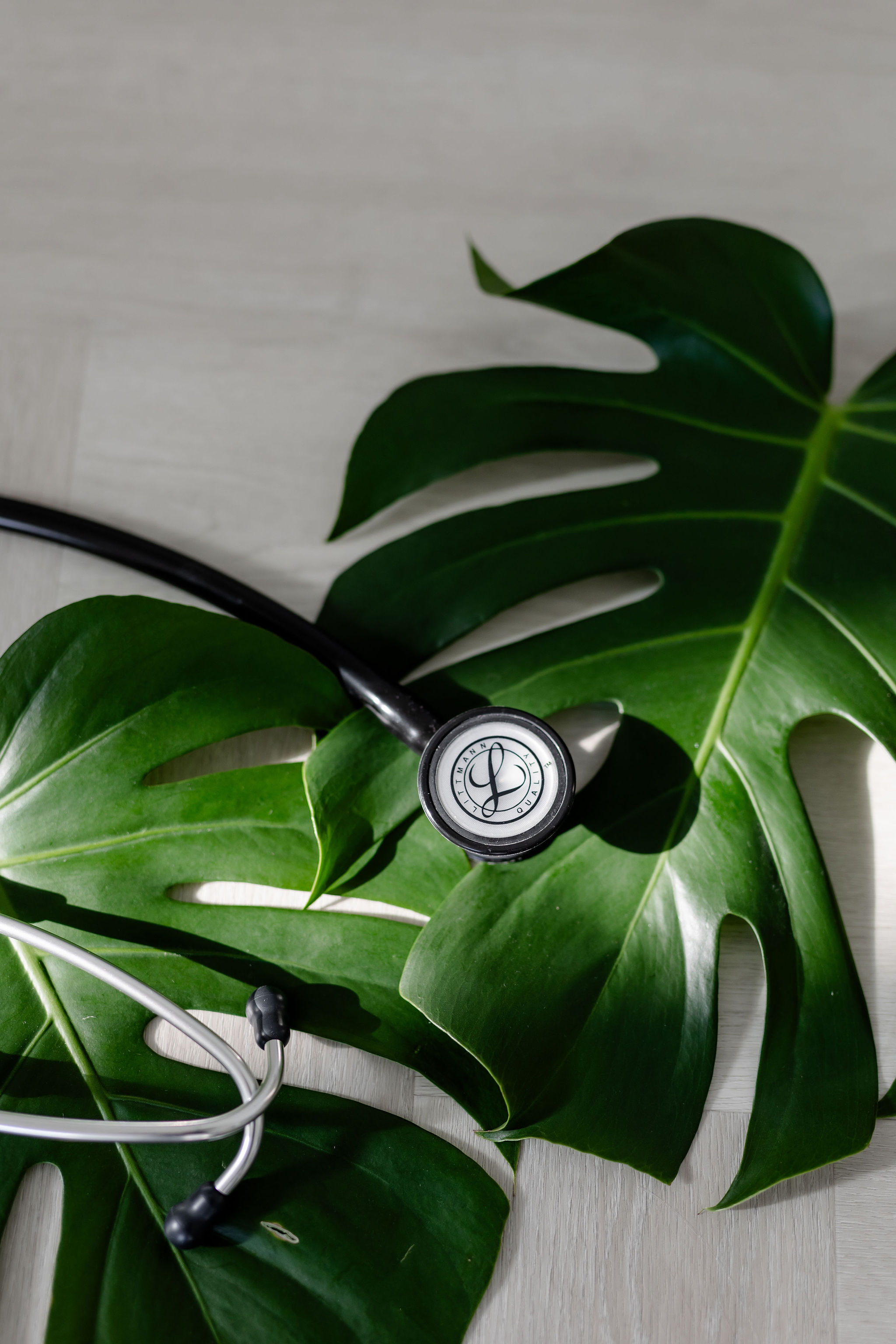
Kitchen Essentials: How Garlic and Onion Support Your Immune System During Cold Season
Cold and flu season is officially here, and while supplements and immune protocols have their place, two of the most reliable tools for everyday immune support are already in your kitchen. Garlic and onion have been used for centuries across cultures, and modern research continues to support what herbalists have always known: these foods strengthen immunity, support the respiratory system, and help your body recover more efficiently when you’re run down.
Why Garlic Supports the Immune System
Garlic is rich in sulfur compounds like allicin, which form when the clove is crushed or chopped. Allicin is one of garlic’s most studied constituents, known for its antimicrobial and immune-stimulating properties. Garlic can support your body’s natural defenses at the onset of an illness and may help shorten the duration of symptoms. It also offers gentle respiratory benefits by helping thin mucus and ease congestion, while its antioxidant activity supports cellular repair during times of increased stress or infection.
How to Use Garlic During Cold Season
Let crushed or chopped garlic rest for about 10 minutes before cooking to allow allicin to fully develop, then add it generously to soups, stews, broths, sauces, and dressings. Many people find the biggest support when they increase their garlic intake at the first sign of a cold. A simple garlic-infused honey mixture is a common traditional remedy used across many cultures for soothing the throat and supporting recovery.
Why Onions Are Just as Powerful
Onions offer their own immune-supportive compounds, including quercetin, sulfur-rich molecules, and prebiotic fibers. Quercetin may help your body regulate inflammation during illness, while the sulfur compounds support natural antimicrobial pathways. Onions are also a gentle expectorant, which is why they can be helpful when congestion, heaviness, or mucus builds up. Their prebiotic fibers feed beneficial gut bacteria, and since so much of the immune system is rooted in the gut, this adds an important layer of support during cold season.
How to Use Onions During Cold Season
Use onions as the base of daily cooking—soups, stir-fries, roasted dishes, sauces, and slow-cooked meals all benefit from their flavor and their immune properties. Raw onion in salads or dips retains more quercetin, while a simple onion broth can be soothing when you’re congested or have a low appetite. Some people also use the traditional “onion beside the bed” remedy for congestion. While evidence for this is limited, it’s safe and widely used in many homes.
Garlic + Onion Together: The Ultimate Duo
When cooked together, garlic and onion amplify each other’s antioxidant and sulfur compounds. This synergistic effect is part of the reason why so many immune-supportive recipes begin with both sautéed in a pot. Their combined properties support immunity, digestion, and the respiratory system in a way that’s accessible and easy to incorporate daily.
During cold and flu season, the simplest remedies are often the most supportive. Garlic and onion offer immune-strengthening, respiratory-soothing, and gut-nourishing benefits that help your body stay resilient through the winter months. They’re affordable, accessible, and easy to add to everyday meals, making them one of the most practical tools for staying healthy this season.
If you’re someone who gets sick often or you want a personalized plan to strengthen your immune system, you can book an assessment at my clinic. Together we’ll build a targeted strategy to support your energy, recovery, and overall immune resilience all winter long.
Disclaimer: Any information is for informational purposes only and is not intended to be used in place of professional medical advice. Always seek the advice of a qualified health care practitioner with any questions or health concerns you may have and before starting any new treatments (including supplements).
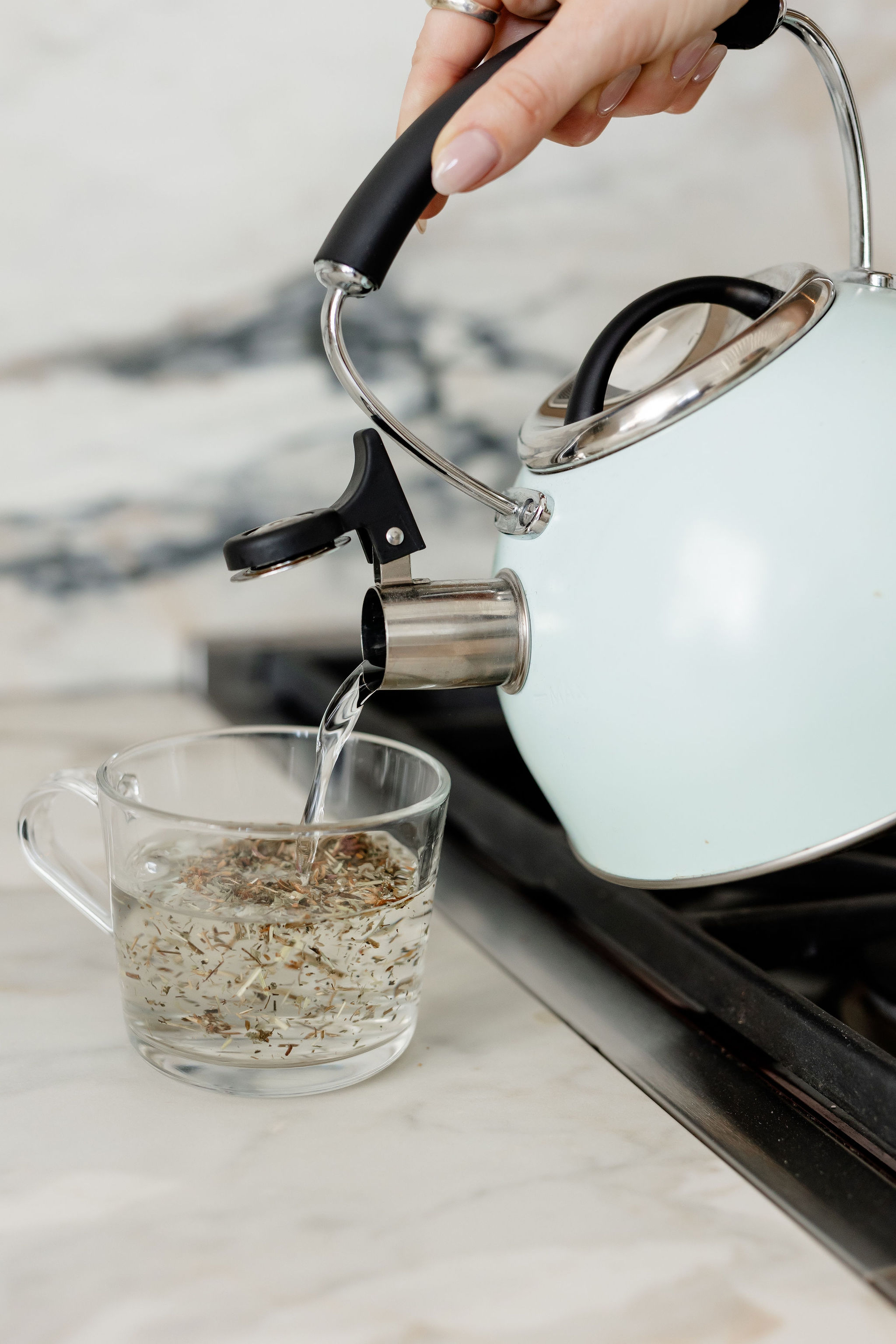
How to Stay on Track During the Holidays Without Losing Your Routine
The holiday season can be full of joy, connection, and celebration, but it also brings changes in routine, late nights, richer meals, and more sugar than usual. Small, steady habits can make a real difference in your energy, digestion, mood, and hormones during this busy time. These strategies help you enjoy the season fully while still feeling like yourself.
Eat protein- and healthy-fat-filled meals before events
Stabilizing your blood sugar before a party reduces cravings and helps you make choices that feel good instead of reactive.
Don’t skip meals, especially on busy days
“Saving up” for a big dinner backfires. Regular meals support metabolism, mood, and balanced hormones. Pack snacks like nuts, fruit, protein bars, or hard-boiled eggs when you’re on the go.
Bring a dish you actually want to eat
Having one supportive option available helps you stay grounded in what your body prefers.
Prioritize eight hours of sleep
Sleep is one of the strongest tools for steady energy and balanced cortisol. It keeps cravings lower and supports emotional resilience.
Stay hydrated with water and herbal tea
Hydration prevents fatigue, headaches, and sugar cravings. Herbal teas like chamomile, ginger, peppermint, or rooibos offer added digestive and calming benefits.
Protect your nervous system
Holiday schedules can be overstimulating. Build in small moments of regulation: a few deep breaths, time offline in the morning, or a calming nightly routine.
Honour your boundaries
Leave early when needed, decline events that overwhelm you, and choose what genuinely matters.
Sip digestive tea or use bitters after heavier meals
Ginger, peppermint, fennel, chamomile, and Swedish bitters can ease bloating and support smoother digestion.
Go for walks, especially after meals
A 10–20 minute walk improves digestion, reduces post-meal blood sugar spikes, and supports stress regulation.
Portion food and drinks instead of eating from shared dishes
Plating your food slows the pace, helps you tune into fullness cues, and reduces mindless grazing.
Keep alcohol intentional
If you drink, choose the moments that truly matter rather than defaulting to something in your hand. Alternate with water, sparkling water, or herbal tea.
Have easy, nutrient-dense options at home
Think eggs, pre-washed greens, soup, chia pudding, Greek yogurt, roasted vegetables, or smoothies. When your fridge is stocked, you’re less likely to rely on holiday treats as meals.
Plan one grounding routine per day
This could be a protein-rich breakfast, a morning walk, or a consistent bedtime. A single anchor habit keeps the rest of your day more stable.
Holiday wellness isn’t about strict rules. It’s about small choices that help you feel steady, nourished, and energized during a busy season. When you prioritize sleep, regular meals, hydration, digestion, and nervous system support, your body stays in a rhythm even when your schedule doesn’t. These simple habits help you enjoy the celebrations more fully and step into January feeling refreshed rather than depleted.
If you want support building habits that fit your lifestyle or you’re noticing your energy, hormones, or digestion feel off during the holidays, you can book an assessment at my clinic. We’ll create a personalized strategy that helps you start the new year feeling clear, balanced, and recharged.
Disclaimer: Any information is for informational purposes only and is not intended to be used in place of professional medical advice. Always seek the advice of a qualified health care practitioner with any questions or health concerns you may have and before starting any new treatments (including supplements).

What Acupuncture Helps With: My Favourite Conditions to Treat and Why It Works
My Favourite Conditions to Treat With Acupuncture (and Why It Works So Well)
Acupuncture is one of my favourite tools in clinical practice as a Naturopathic Doctor because it supports so many areas of health: pain, hormones, fertility, pregnancy, stress, sleep, and even skin health. If you’re searching for what acupuncture can help with, what conditions acupuncture treats, or whether acupuncture is right for you, this guide shares the most common concerns I treat and explains why acupuncture is such an effective option.
Acupuncture works by improving circulation, reducing inflammation, regulating the nervous system, and supporting the body’s natural healing responses. Whether someone comes in for physical pain, irregular cycles, pregnancy symptoms, or emotional stress, the effects reach far beyond the needles themselves.
1. Pain & Musculoskeletal Concerns
Headaches, back pain, neck tension, shoulder pain, jaw tension/TMJ
Pain relief is one of the top reasons people search for acupuncture, and it’s often where results appear quickly. Acupuncture reduces pain by increasing blood flow to tight or irritated muscles, calming inflammation, and releasing endorphins. In my practice, I frequently treat chronic headaches, migraines, neck and shoulder tension, low-back pain, sciatica, and TMJ. Many patients feel lighter, looser, and more mobile after treatment, sometimes even after a single session.
2. Menstrual Cycle Concerns
Irregular cycles, PMS, acne, painful periods
Acupuncture is incredibly supportive for menstrual health because it helps regulate the hypothalamic–pituitary–ovarian axis, improves blood flow to the uterus, reduces inflammation, and calms cortisol. This makes it effective for irregular cycles, painful periods, PMS mood changes, hormonal acne, spotting, and short luteal phases. Many people use acupuncture as their monthly hormonal reset because it helps their cycle feel more predictable and balanced.
3. Fertility Support
Optimizing natural conception or supporting IUI/IVF
Acupuncture is one of the most researched natural therapies for fertility. It improves blood flow to the ovaries and uterus, supports follicle development, regulates ovulation, enriches the uterine lining, and lowers stress — all essential factors for conception. I support patients trying naturally, preparing for IUI, undergoing IVF, and navigating early pregnancy. Many describe acupuncture as the piece that helps them feel grounded and emotionally supported throughout the process.
4. Pregnancy Support
Nausea, headaches, back pain, sciatica, constipation, fatigue
Acupuncture is safe throughout pregnancy and an excellent non-medication option for many common symptoms. I often treat nausea, vomiting, headaches, sinus congestion, fatigue, back and pelvic pain, sciatica, and constipation. Pregnant patients consistently leave feeling calmer, more comfortable, and more supported in their changing bodies.
5. Labour Preparation & Induction Support
Beginning around 37–40 weeks, acupuncture can help prepare the body for labour by encouraging cervical ripening, relaxing the pelvic and uterine muscles, supporting optimal baby positioning, and promoting natural oxytocin release. It is also a popular option for those looking for natural labour support or gentle induction, especially when approaching or passing their due date. “Acupuncture for labour induction” is one of the most commonly searched terms and one of my most-requested late-pregnancy treatments.
6. Stress, Self-Care & Nervous System Regulation
Relaxation, emotional regulation, burnout, anxiety
One of acupuncture’s most powerful benefits is how effectively it shifts the body from fight-or-flight into a parasympathetic state. This makes it a valuable therapy for stress, overwhelm, burnout, anxiety, irritability, emotional reactivity, and general nervous system dysregulation. Patients often describe feeling centered, grounded, and deeply relaxed — and many book regular sessions as part of their self-care routine.
7. Sleep Issues & Low Energy
Insomnia, trouble falling asleep, early waking, stress-related fatigue
Acupuncture supports healthy sleep by affecting melatonin production, calming the mind, regulating cortisol, and improving overall nervous system balance. I commonly treat difficulties falling asleep, nighttime waking, early morning waking, restless sleep, and fatigue connected to stress or hormonal imbalance. When sleep improves, energy and mood naturally follow.
8. Facial Acupuncture
Skin health, fine lines, puffiness, glow
Cosmetic acupuncture enhances skin health from the inside out. It increases circulation, stimulates collagen and elastin, improves lymphatic drainage, and reduces jaw tension. Patients often notice a brighter complexion, softer fine lines, reduced puffiness, and a more lifted, refreshed appearance. It’s a holistic alternative to cosmetic procedures with the added benefit of full-body relaxation.
Why Acupuncture Supports Whole-Body Health
Acupuncture influences multiple systems at once: circulation, inflammation, hormones, digestion, immunity, and the nervous system. This is why it pairs so effectively with naturopathic care and my Hormone Cornerstone Method, where we focus on diet and digestion, metabolism and detox, sex hormones, sleep and energy, immune balance, and mood and stress.
If you're considering acupuncture for pain, hormonal concerns, fertility, pregnancy, stress, sleep, or skin health, you can learn more or book a visit on my website.

When Your Body Speaks Before You Do: What My First Cold Sore Taught Me
The other week I woke up with a cold sore for the first time in my life. It wasn’t dramatic, but it was surprising. I didn’t feel stressed, overwhelmed, or run down. On the surface, nothing seemed “wrong.” I had slept a little less, eaten a bit differently, and had a mild IBS-type flare—but none of it felt significant in the moment.
Yet there it was: the cold sore showed up before I realized my body was under strain.
Out of curiosity (and mild panic), I asked my online community for tips. The remedies were great, but what caught my attention were the patterns in people’s triggers. Almost everyone mentioned the same things: poor sleep, overdoing it, digestive issues, feeling run down, or subtle stress they hadn’t acknowledged.
It felt exactly like reading intake forms in my practice—when people describe a cluster of symptoms that clearly connect, even if they haven’t linked them yet.
What many people don’t realize is that cold sores rarely appear “out of nowhere.” They are one of the most common early signals that the body is juggling more than it can comfortably manage. They tend to flare when the immune system is lowered, when the nervous system is activated, or when the gut is irritated. They respond to small shifts: less sleep, routine changes, inflammation, nutrient depletion, even emotional or physiological stress we haven't fully registered.
When I looked more closely at my week, everything fit. A few nights of lighter sleep impacts immune resilience almost immediately. A subtle change in diet triggers the gut faster than we think. An IBS flare shows that the gut–immune interface is irritated. Even a tiny rash isn’t random—it’s often a sign the immune system is managing an added load.
When these factors layer together—poor sleep, digestive irritation, stress, under-eating or overtraining—the nervous system works harder to keep things balanced. And when those systems are stretched, dormant viruses (like HSV-1) have a chance to reactivate.
The Gut–Immune–Nervous System Connection (Why Cold Sores Flare When They Do)
Understanding cold sore triggers becomes much easier when you look at the three systems that influence them most.
• Gut health: Because roughly 70% of immune cells live in the gut, anything that irritates digestion—IBS flares, bloating, inflammation, food sensitivities—diverts immune resources. When the gut is inflamed, the immune system becomes less efficient at suppressing dormant viruses.
• Immune load: Poor sleep, stress, viral exposure, nutrient shifts, or inflammation can decrease immune activity and make cold sore outbreaks more likely.
• Nervous system and adrenals: Physiological stress (under-sleeping, overworking, overtraining, under-eating, or prolonged “on” mode) activates the stress response. Stress hormones change how well the body can suppress viral activity.
These three systems continuously communicate. When one is strained, the others compensate. When two or three are strained at the same time, symptoms—like cold sores—appear.
This interaction is exactly why people often notice cold sores after travel, busy seasons, emotional overwhelm, illness, gut flares, disrupted routines, or long stretches of “pushing through.”
I supported mine externally with lysine, zinc, peppermint oil, St. John’s Wort oil, an indicated homeopathic, and a medicated patch. Those helped the symptom, but the real shift came from addressing the internal contributors: prioritizing sleep, supporting digestion, calming my nervous system, and giving myself an actual pause.
Sometimes symptoms are inconvenient. Sometimes they’re frustrating. But often, they’re invitations to pay attention to what’s happening beneath the surface.
Cold sores are one of the most visible examples. And if they’re showing up more often or more intensely, it’s usually a sign that your gut, immune system, or stress response needs support—not just spot treatment.
This is exactly what I help patients understand inside my Hormone Cornerstone Method: how the gut, immune system, hormones, and nervous system are connected and how symptoms are simply messengers pointing toward the root cause.
If you’re dealing with recurring flares—cold sores, gut issues, skin changes, fatigue, or stress reactivity—your body may already be telling the story. You just need someone who can translate it clearly. Let's chat!

Stop sacrificing sleep for late night “me time”
It’s 9:30 pm and the house is finally quiet.
The dishes are done, the kids are asleep, and for the first time all day, there’s silence. You grab your phone, open Netflix, maybe pour a glass of wine or get a little snack — and suddenly it’s midnight. You tell yourself this is your time to unwind, to finally do something for you.
I see this all the time with my naturopathic patients, especially parents. They’re exhausted but craving something that feels like theirs. And I get it, after a day of giving to everyone else, there’s something deeply satisfying about choosing yourself (even if it’s just an hour of mindless scrolling or watching a show).
There’s even a name for it: revenge bedtime procrastination. It’s the quiet rebellion against a day that didn’t feel like your own. Staying up late becomes a small act of control and a way to reclaim freedom when every hour before bedtime was spoken for.
But here’s the problem: your body doesn’t know that this late-night ritual is supposed to feel like self-care. To your nervous system, it’s still stress and it definitely impacts your hormones.
When you stay up late on your phone or in front of a screen, cortisol, your alertness hormone, stays elevated longer, delaying the natural rise of melatonin. Your circadian rhythm shifts, and suddenly you’re wired at midnight and groggy at 7 a.m. It doesn’t stop there: insulin sensitivity changes, cravings rise, and your ability to handle stress the next day plummets.
In short, your body starts running on empty while you’re still trying to fill your emotional cup. Bottom line – you need good quality sleep!
As a naturopathic doctor, I’ve seen how common this pattern is, especially in parents who are juggling caregiving, careers, and constant mental load. The real issue isn’t a lack of discipline; it’s a lack of space. When your days are so packed that the only time you can breathe is after 9pm, your nervous system never truly regulates.
True “me time” isn’t found in the late-night hours. It’s built throughout the day, in small, intentional moments that let your body exhale before you hit exhaustion.
Try this instead:
– Create a simple transition ritual in the evening what doesn’t involve a screen. Think herbal tea, journaling, or a few minutes of silence before bed.
– Reclaim small pieces of the day for yourself: try ten minutes of quiet after lunch or a quick walk after dinner.
– Remind yourself that rest is not wasted time. It’s the foundation that allows you to show up for everything else.
- And when in doubt, set alarms on your phone reminding you to pause and breathe, and to turn your screens off at night.
You don’t have to earn rest. You deserve it.
So the next time you catch yourself trading sleep for one more episode or scroll, remember: your body isn’t asking for more “me time.” It’s asking for restoration.
If you’re ready to stop running on empty and learn how to support your sleep, hormones, and energy naturally — that’s exactly what I help my patients do every day. Book an assessement today!
Disclaimer: Any information is for informational purposes only and is not intended to be used in place of professional medical advice. Always seek the advice of a qualified health care practitioner with any questions or health concerns you may have and before starting any new treatments (including supplements).
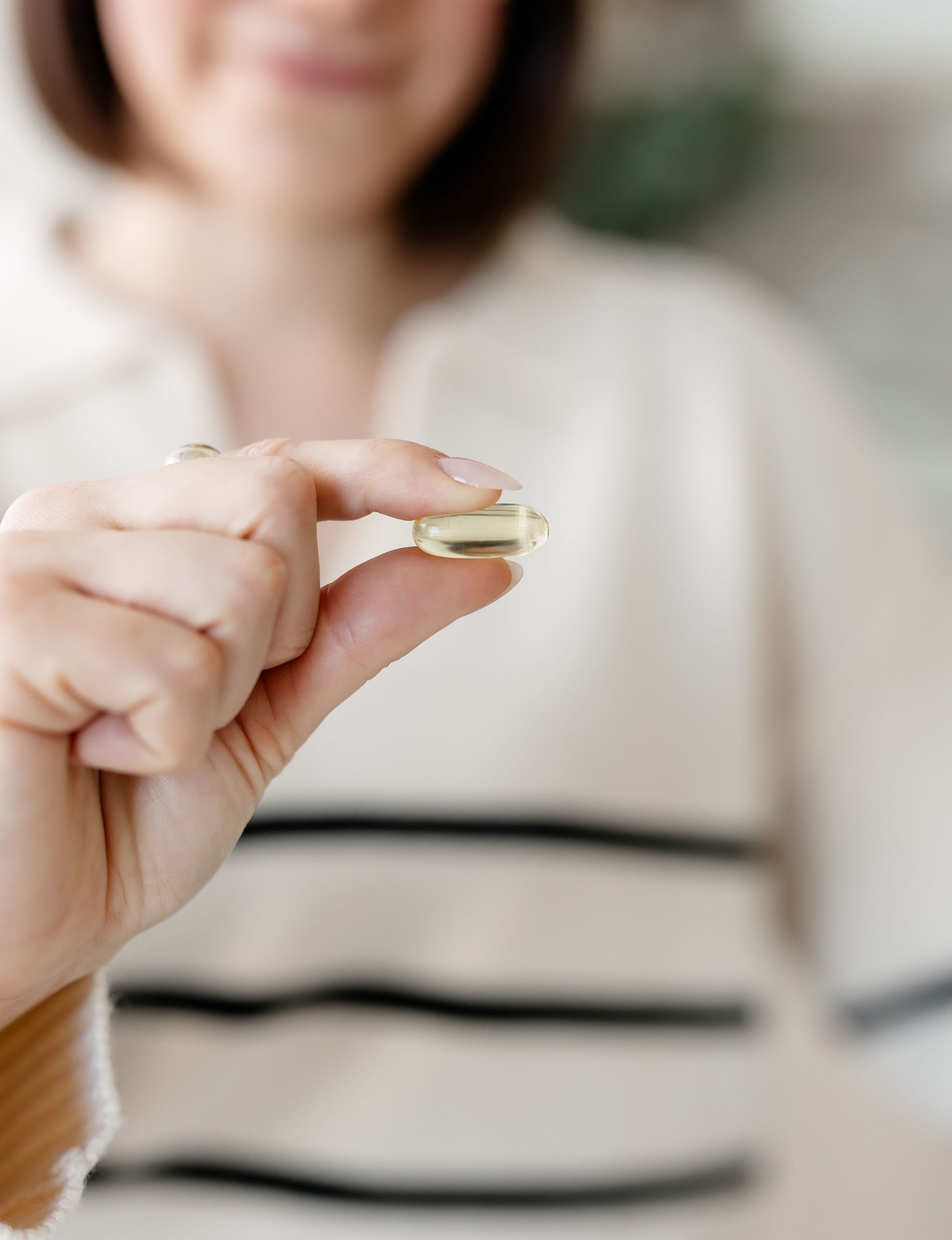
Why Treating Vaginal Dryness Matters in Perimenopause and Menopause
In my practice, I often see women who’ve silently struggled with vaginal dryness for years—assuming it’s just part of getting older or something they need to tolerate after menopause. The truth is, vaginal dryness is not only treatable, but important to address early. When left untreated, it can progress to vaginal atrophy, where the vaginal tissues become thinner, less elastic, and more fragile due to declining estrogen. Once atrophy develops, it’s much harder to reverse—making early support essential.
Local HRT: A Targeted, Low-Risk Option
Vaginal estrogen therapy (also called local HRT) delivers small amounts of estrogen directly to the vaginal tissues through creams, tablets, or rings. Because absorption into the bloodstream is minimal, it has a much safer systemic profile compared to oral or transdermal hormone therapy.
This treatment helps restore the thickness, elasticity, and natural moisture of the vaginal tissue—often improving comfort, libido, and even bladder function. It can be started in perimenopause or menopause, and for many women, it can be truly life changing.
“Bioidentical” Estrogen—What That Really Means
In medicine, we don’t formally use the term bioidentical, but it can be a useful way to describe hormones that are chemically identical to the estrogen your body naturally produces. The other form would be considered synthetic, such as conjugated estrogens, which look and act very similar to estrogen.
When prescribed in vaginal form, estradiol—the body-identical version of estrogen—is generally well tolerated, safe for long-term use, and effective at restoring tissue health without significantly changing hormone levels throughout the body.
The Role of Hyaluronic Acid
Hyaluronic acid vaginal gels or suppositories are another excellent option—either on their own or in combination with vaginal estrogen. Hyaluronic acid draws moisture into the tissue and supports repair of the vaginal mucosa, making it a gentle alternative for women who prefer to start with a non-hormonal option or want additional hydration.
The Takeaway
Vaginal dryness isn’t just a comfort issue—it’s a sign that your tissue health is changing. Addressing it early can prevent long-term atrophy and restore comfort and confidence. Whether you use hyaluronic acid, local estrogen, or a combination of both, there are safe and effective solutions available.
If you’re unsure which approach is right for you, let’s chat and see which option would be best! You deserve to feel comfortable in your body at every stage.
Disclaimer: Any information is for informational purposes only and is not intended to be used in place of professional medical advice. Always seek the advice of a qualified health care practitioner with any questions or health concerns you may have and before starting any new treatments (including supplements).

Am I in Perimenopause? How to Spot the Signs and Rebalance Your Hormones Naturally
You’re not alone if lately you’ve been wondering: “Is this just stress, or is it perimenopause?” The truth is, perimenopause is a curveball many of us don’t see coming — but understanding it early is a powerful step in reclaiming control of your hormones. Here’s the honest, no-fluff guide to what perimenopause is, when it often starts, the signs to watch for, and what you can do now. Let’s break down what’s actually happening in your body and how to start supporting it
What is perimenopause and when does it start?
Perimenopause is the transition between regular ovulatory cycles and the final menstrual period (menopause!), when your ovaries gradually produce less estrogen and progesterone. During this time, hormone levels fluctuate—some months you’ll ovulate, and others you won’t—which is why symptoms and cycle patterns can feel so unpredictable. It typically begins in the mid-40s, though some start noticing changes in their late 30s or early 40s. The transition can last anywhere from a few years to a decade, and no two experiences look the same—some move through it with mild changes, while others feel every fluctuation along the way. There’s no single lab test that confirms perimenopause, since hormone levels can swing widely from day to day—what matters most are your symptoms and menstrual patterns.
Key signs and symptoms to watch for
These are not guaranteed, and they often overlap with other life stressors or health issues—but when several appear together, it’s worth paying attention. Here are some of the most common ways hormone fluctuations can show up during this time.
Menstrual changes: Irregular periods, heavier or lighter bleeding, spotting, or shorter/longer cycles. You might find your periods aren’t predictable anymore—sometimes heavier, sometimes you skip one.
Hot flashes and night sweats: Sudden heat waves, sweating, flushing, or waking up drenched.
Sleep and fatigue: Trouble falling asleep, waking frequently, nonrestorative sleep, or daytime tiredness.
Mood and cognition: Mood swings, irritability, increased anxiety or depression, memory or concentration issues (brain fog).
Sexual and urogenital changes: Vaginal dryness, thinning tissues, painful sex, lower libido, more UTIs or bladder sensitivity.
Body changes: Weight gain (especially around the midsection), joint aches, muscle loss, thinning skin or hair.
Other symptoms: Heart palpitations, headaches or migraines, changes in vision, skin, or taste.
Symptoms often fluctuate, some good days, some not-so-good days, because your hormones are on a rollercoaster during this transition.
What to do now
If you’re noticing changes that feel different from your usual rhythm, the first step is to start tracking your cycles and symptoms. This gives valuable insight into how your hormones are shifting each month and it’s often the key to identifying where your body needs support.
While estrogen and progesterone are the main players in perimenopause, they’re rarely the only hormones involved. Fatigue, mood swings, weight changes, and disrupted sleep can also stem from thyroid imbalance, cortisol dysregulation, insulin resistance, or nutrient deficiencies such as iron, vitamin D, or B12. That’s why comprehensive blood work—including testing beyond what’s routinely ordered—is so important (Heres a peak at why I run my blood work yearly!). Naturopathic doctors can help you take a deeper look at these underlying patterns so your plan is individualized, not generic. Taking a deep dive with blood work is one of the first steps in my Hormone Cornerstone Method!
Foundational support always begins with the basics. Before jumping to complex interventions, focusing on these cornerstones can make a significant difference:
1. Track your cycles and symptoms: note changes in flow, sleep, mood, and energy.
2. Prioritize sleep hygiene: aim for a consistent bedtime, a cool dark room, and screen-free wind-down time.
3. Support your nervous system: focus on daily practices that calm your stress response, like deep breathing, gentle movement, or acupuncture.
4. Exercise regularly: strength training, walking, and low-impact cardio help maintain bone and muscle health, balance blood sugar, and stabilize mood.
5. Add targeted herbs and supplements: options like magnesium, B vitamins, omega-3s, and adaptogens can be incredibly supportive when chosen strategically for your unique hormone picture.
Every person’s experience is unique, but with the right strategy, it’s possible to feel balanced, energized, and confident through this transition.
What about HRT?
For some, lifestyle and natural supports provides great relief. For others, additional options can help. Hormone therapy can be helpful for managing hot flashes, sleep issues, or significant mood changes, but it’s not a one-size-fits-all solution. When we assess your hormones, we’ll also discuss whether HRT could complement your broader plan.
If you’ve been feeling out of sync and suspect perimenopause might be part of the picture, now’s the time to get clarity. Together, we can pinpoint what’s really going on, run the right tests, and create a plan to help you feel like yourself again.
Disclaimer: Any information is for informational purposes only and is not intended to be used in place of professional medical advice. Always seek the advice of a qualified health care practitioner with any questions or health concerns you may have and before starting any new treatments (including supplements).

Why I Swear By This Seasonal Reset for Hormones and Energy Every Fall
There’s something about September that feels like a second New Year. Maybe it’s the cool mornings, the sense of change in the air, or the gentle nudge to come back to ourselves after a busy, messy summer. Every year, I notice it—not just in my patients, but in myself too.
It’s so easy to slip out of routine when life is full and good. Long evenings, travel, patios, and late-night ice cream (yes, I’m guilty too!). But when the season shifts, our bodies ask us to shift too. We crave structure, rhythm, and that feeling of being grounded again.
What I love most about this time of year isn’t the pressure to overhaul everything—it’s the invitation to return to the basics. To remember that small, steady shifts (not all-or-nothing plans) are what truly bring our hormones, energy, and nervous system back into balance.
You’d be surprised how much of a difference the simplest things make. Even something like drinking lemon water in the morning or adding a few liver-loving herbs to your routine can help your body reset after a busy season. And if you find yourself craving more daylight or noticing a dip in your mood, don’t forget how powerful vitamin D can be this time of year.
If you’re feeling a little off-track, tired, or just in need of a gentle nudge in the right direction, you’re not alone. And you don’t need to do anything drastic to start feeling better.
Your Seasonal Hormone Refresh
That’s why I created Your Seasonal Hormone Refresh: a 14-day reset designed to help you realign with your natural rhythms using small, simple habits that actually work. No restriction. No overwhelm. Just gentle shifts you can return to every season—or whenever you need a reset.
You’ll be amazed what a difference the basics make: morning light, water, a walk after dinner, a little more sleep, a little less screen time. It all adds up.
If you’re ready to feel more grounded, more energized, and more like yourself again, join me for the Seasonal Hormone Refresh!
Let’s do this together.
Learn more and start your reset here or book a free discovery call to see if it’s right for you.
Disclaimer: Any information is for informational purposes only and is not intended to be used in place of professional medical advice. Always seek the advice of a qualified health care practitioner with any questions or health concerns you may have and before starting any new treatments (including supplements).

Do You Really Need All That Testing? Why Individualized Care and Strategy Matter More Than Lab Reports
Recently, I was reminded of how polarizing the health world can be. An ad popped up in my feed that made me pause. It was bold, emotional, and — honestly — a little harsh. Some practitioners make sweeping claims: that fancy testing is the only way to get real answers, or that one approach is always superior to another.
But the truth? There is no one-size-fits-all path.
I’m not here to tear anyone down — that’s not my style. If you’ve followed me for a while, you know my posts are rarely fueled by outrage or negativity. I’d rather focus on education, connection, and offering tools that help you feel better. Still, seeing that ad got me thinking about something important: how we choose what’s truly worth our time, energy, and money in healthcare.
Here’s the thing: my take isn’t fancy or flashy, and because of that, it won’t go viral on social media. I believe true health changes come from small, subtle shifts and from understanding the connections between our systems, nervous system, hormones, and emotional regulation.
I know you want answers to your health concerns, and it’s natural to wish there was a simple test to confirm what you’re feeling. Testing absolutely has its place — it can provide clarity, confirm a suspicion, or help guide a personalized treatment plan. But the truth is, not everything shows up accurately in testing, most functional tests aren’t truly diagnostic, and often aren’t the best use of your resources. Sometimes, the most effective medicine is listening closely to your symptoms, your story, and the way your body is speaking to you.
I often see patients who come to me after working with other functional medicine practitioners. They bring pages of test results and a long list of supplements, but their symptoms are still unresolved — or the answers didn’t change things dramatically. In those cases, what they’re really looking for is a more supportive, individualized approach.
My goal isn’t to hand you a stack of expensive reports and a dozen new supplements. It’s to build a plan that feels realistic, sustainable, and actually makes a difference in your health.
The art of medicine is knowing when to lean on testing, and when to trust what’s already clear from the picture in front of us. True informed consent means knowing the details of your options and choosing what’s best for you.
The hallmark of my Hormone Cornerstone Method is flexibility. I meet you where you’re at — whether that means running a panel of labs or focusing on daily habits and foundational care. There’s no one-size-fits-all formula. My role is to help you decide what’s going to make the biggest impact for you. On the first visit, treatment focuses on discussing all the testing options (from basic and extended blood work to functional stool and urine tests) and choosing a few specific and vital treatments to implement.
At the end of the day, it’s not about tests vs. no tests, or one profession vs. another. It’s about you feeling seen, supported, and guided toward real, lasting change.
Your health isn’t defined by numbers on a page. It’s defined by how you feel in your body, your energy, your cycles, your sleep, your skin, and your ability to show up for your life. That’s the lens I always come back to.
Because real healing doesn’t come from tests alone — it comes from treating the whole person.
That’s what matters most to me.
If you’re looking for a more individualized and supportive approach to your health—or if you’re feeling overwhelmed after a stack of tests and supplements—I’d love to help you find a plan that truly fits. Feel free to reach out with your questions or book a visit if you’re ready.
Disclaimer: Any information is for informational purposes only and is not intended to be used in place of professional medical advice. Always seek the advice of a qualified health care practitioner with any questions or health concerns you may have and before starting any new treatments (including supplements).

What My Iron Results Revealed as a ND—and Why I Check My Blood Work Every Year
When I first learned about iron deficiency in school, I thought of it as a simple fix: you’re low, you supplement, your numbers go up. Easy, right?
Except… that wasn’t my experience.
Back in 2012, my ferritin was 6. I was barely getting out of bed in the mornings, crashing in the afternoons, and needing long naps just to make it through the day. I had just finished university and chalked it up to the stress of academics and late nights—but now I know better.
That fatigue was my first red flag.
My Iron Story: A Timeline
Over the years, my ferritin levels have ebbed and flowed depending on my supplementation, gut health, and how life was going. Even when I was supplementing consistently during grad school, I couldn’t get my numbers above 20. That’s when I began to dig deeper into absorption, inflammation, and the gut connection.
Here’s a snapshot of my ferritin over time:
July 2012 – Ferritin 6
August 2021 – Ferritin 16
Dec 2021 – Ferritin 23
Oct 2022 – Ferritin 24
Mar 2023 – Ferritin 30
Aug 2023 – Ferritin 36
June 2025 – Ferritin 43
I’ve had to work hard to get those numbers up, and I’ve learned a lot about what actually makes a difference.
Why It Was So Hard to Improve
Even though my periods weren’t excessively heavy or long, the monthly blood loss, combined with gut inflammation and subtle malabsorption, made it difficult to build iron stores. And back then, the lab guidelines were still outdated, so my symptoms were often dismissed (if you want to dive deeper into this, read my previous post here!)
I’d hear, “You’re in range,” or “You’re just busy” — even when I was experiencing textbook symptoms of low iron.
That’s when I started testing my ferritin at least once a year and treating it as a vital sign of how my body was coping.
Symptoms of Low Ferritin
Iron deficiency can look different for everyone, but these are some of the most common signs I see in practice—and many are ones I’ve experienced personally:
• Fatigue that doesn’t improve with rest
• Needing naps to function
• Feeling lightheaded with exertion or when standing quickly
• Shortness of breath walking up stairs
• Poor stress tolerance or feeling emotionally flat
• Cold hands and feet
• Craving chocolate, salty snacks, or even ice
• Waking up tired, even after a full night’s sleep
• Brain fog or difficulty concentrating
• Heavy or prolonged menstrual bleeding
If any of this sound familiar—especially in combination—it’s worth checking your ferritin, even if your hemoglobin or CBC looks “normal.”
How I Keep My Ferritin Up Now
Getting my ferritin to a stable place took time, consistency, and a full-body approach. Here’s what worked for me:
• Iron-rich foods daily – lentils, leafy greens, beef, pumpkin seeds
• Cooking with cast iron pans – boosts iron content of meals
• Finding the right supplement – low side effects, highly absorbable (FYI, not all iron supplements will make you constipated!)
• Continuous gut work – yearly gut support protocols to improve absorption
• Timing – taking iron away from calcium, caffeine, and high-fiber meals
• Consistency – not just when I feel tired, but year-round support
When I slack on any of the above, my numbers reflect it.
The Bigger Picture
Iron deficiency isn’t always dramatic. It can sneak in slowly masked as burnout, PMS, brain fog, or low motivation. But tracking it changed everything for me.
And it’s not just about numbers. It’s about how you feel, function, and show up in your day-to-day life.
If you’re menstruating, especially if you feel tired, foggy, or just not quite yourself, please don’t wait until you hit a wall. A ferritin test (along with a full iron panel) is one of the easiest ways to check in on your energy from the inside out.
I’ve lived through the low numbers, and I know how much better life feels when iron is optimized – you don’t have to too! Using my unique approach, Hormone Cornerstone Method, let’s get you on a proactive plan to feeling your best!
Disclaimer: Any information is for informational purposes only and is not intended to be used in place of professional medical advice. Always seek the advice of a qualified health care practitioner with any questions or health concerns you may have and before starting any new treatments (including supplements).

The Iron Blood Test Every Woman Should Ask For: What Ferritin, Transferrin Saturation & Your Period Can Tell You
How often do you check your iron?
If you’re a menstruating woman, the answer should be: at least once a year. And not just a quick glance at your hemoglobin — I’m talking about a full iron panel that includes ferritin, transferrin saturation, and inflammation markers.
Why? Because iron deficiency is incredibly common, often missed, and deeply tied to how you feel — from energy to mood to period health. In fact, it’s one of the top deficiencies I uncover through blood work in my naturopathic practice.
And truthfully, it’s something I’ve struggled with personally too. Between heavy periods, underlying gut inflammation, poor absorption, and inconsistent supplementation, maintaining optimal iron levels hasn’t been easy — and I know I’m not alone. I’ll be sharing more about my own results and what I’ve learned in a follow-up post.
Ok, let’s dive in and break down what to test, why it matters, and how your monthly cycle (and your symptoms) might be trying to tell you something!
The Iron Balancing Act: Why Women Are More at Risk
The average person maintains a net iron balance of zero — meaning the iron you absorb from food is roughly equal to the amount your body uses for daily functions like making red blood cells, supporting thyroid function, transporting oxygen, and regulating metabolism.
But once you add in blood loss from a period every month — or frequent intense exercise — it’s easy to fall behind. Over time, this can create a slow and steady decline in your iron stores.
And here’s the frustrating part: low iron can actually cause heavier periods… and heavier periods can further deplete iron. It’s a vicious cycle.
It's Not Just Hemoglobin — Here’s What to Actually Test
Many people think checking a CBC or basic hemoglobin is enough. But by the time hemoglobin drops, you’re already quite depleted.
Instead, we should be looking at a full iron panel, including:
• Ferritin – your stored iron. This is the most important marker for early detection
• Serum Iron – how much iron is circulating at that moment
• Total Iron-Binding Capacity (TIBC) – how well your blood can carry iron
• Transferrin Saturation – the percentage of transferrin that is saturated with iron
• CRP or ESR – markers of inflammation, which can falsely elevate ferritin levels
This full picture helps determine not just if you have enough iron, but whether your body is using and absorbing it effectively.
It’s Not Just a “Woman’s Issue” — But Here’s Why It’s More Common in Women
I’ve had men in my practice say,
“My mom was always low in iron — maybe it runs in the family?”
And while genetics influence many things, iron deficiency is usually environmental, not inherited. Most men don’t menstruate and therefore don’t lose iron monthly, which helps them maintain adequate stores.
However, iron testing can be relevant for men too — especially if there’s heavy exercise, a vegan or vegetarian diet, or digestive issues that impair absorption.
Still, menstruating women remain the highest-risk group — and unfortunately, many go years without proper testing.
Updated Guidelines: Ferritin Targets Have Finally Shifted
For years, the standard “normal” range for ferritin was far too low. But in 2024 Ontario's guidelines were updated, aligning more closely with what many naturopathic doctors have been recommending all along.
Here’s what we look for now:
• Below 30 – low, and often associated with fatigue, brain fog, and hair loss
• 30–50 – borderline; you’ll likely benefit from supplementation
• 50+ – optimal target for menstruating women
• 80+ – often needed for athletic performance or when recovering from deficiency
If your ferritin is under 50 — especially if you have symptoms — it’s worth a closer look.
But Wait... Ferritin Can Be Misleading
Ferritin is also an acute phase reactant — meaning it rises with inflammation. If you have an underlying infection, autoimmune condition, or high stress, it might falsely appear “normal” or even elevated.
That’s why I always recommend testing inflammation markers (like CRP or ESR) alongside your iron panel — especially if your symptoms don’t match your labs.
Final Thoughts
If you’ve ever been told your iron is “fine,” but you’re still dealing with:
• Fatigue or burnout
• Brain fog or poor memory
• Shortness of breath with exertion
• Hair thinning
• Heavy periods
...it might be time to dig deeper. A full iron panel, run annually, is one of the simplest ways to get insight into your energy, hormones, and menstrual health.
In Part 2, I’ll share my personal iron results as a naturopathic doctor — and what they revealed about my own energy and health!
If it’s been more than a year since you last checked your iron—or if you’ve never had a full panel done—it’s time. Whether you're feeling off or just want a deeper understanding of your health, blood work is one of the most powerful tools we have.
As a naturopathic doctor, I help women and men interpret their lab results, connect the dots with their symptoms, and build a plan that actually supports long-term energy, hormone balance, and period health.
Book in for a visit or a blood work review—and let’s make sure you’re not being overlooked. You deserve to feel well-informed, supported, and confident when it comes to your health. I'm here to help you advocate for exactly that.
Disclaimer: Any information is for informational purposes only and is not intended to be used in place of professional medical advice. Always seek the advice of a qualified health care practitioner with any questions or health concerns you may have and before starting any new treatments (including supplements).
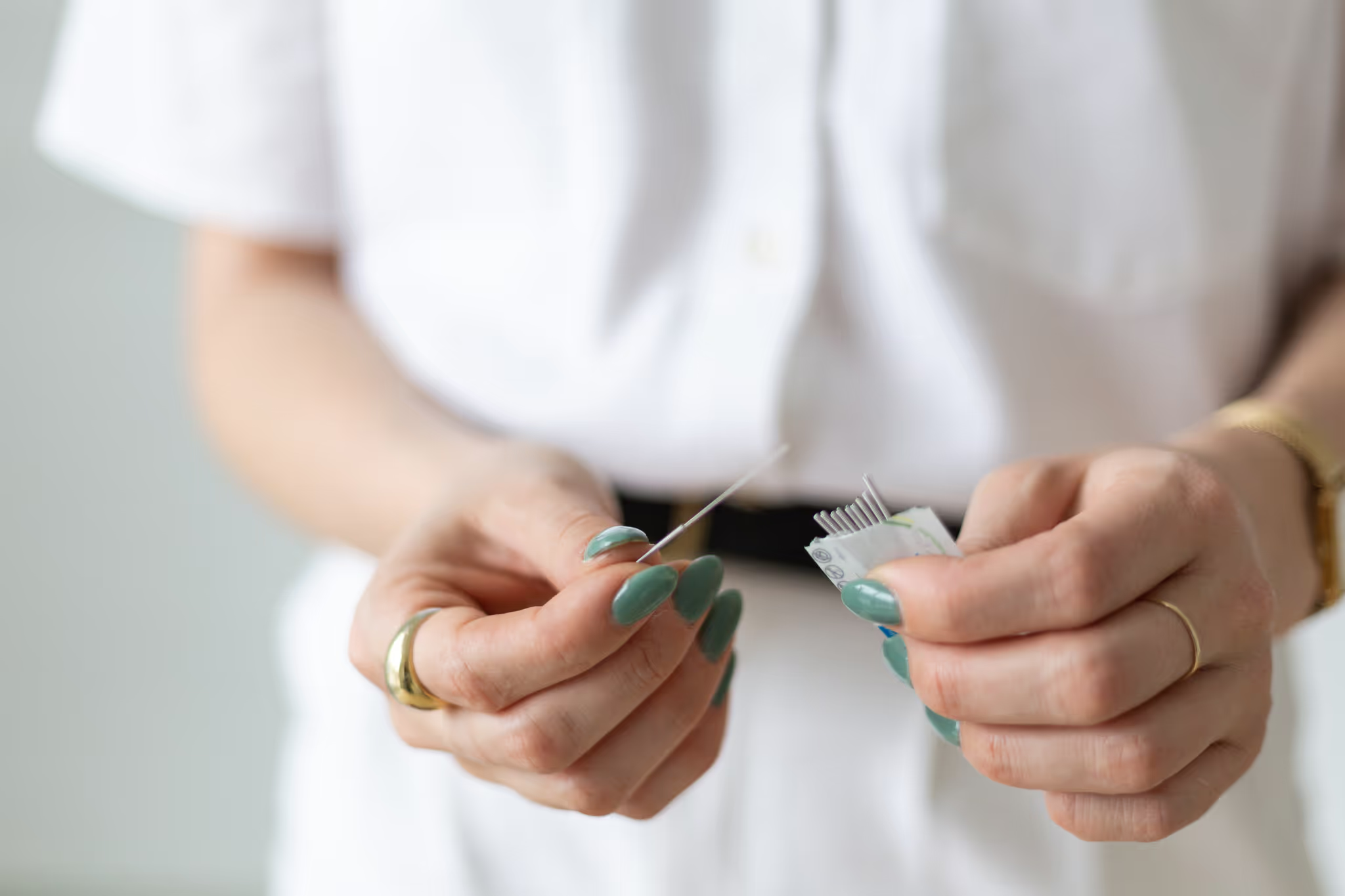
Acupuncture for Insomnia: A Natural Sleep Solution Backed by Science
Have you ever found yourself lying in bed, exhausted—but your brain just won’t shut off?
You’re not alone. Insomnia is one of the most common concerns I hear in my naturopathic medicine practice. Whether it’s difficulty falling asleep, waking in the night and not being able to get back to sleep, or feeling unrested no matter how many hours you get—it’s exhausting, literally!
And while there are plenty of sleep supplements and medications out there, many people are looking for a natural solution that works with their body, not just masks the symptoms. That’s where acupuncture comes in.
Why Acupuncture Works for Sleep
One of acupuncture’s most powerful effects is on the nervous system. It helps shift the body out of “fight-or-flight” mode and into a calmer, more restorative state—exactly what we need before bed.
It also promotes the transition into alpha and theta brain wave states—the same frequencies your brain naturally enters right before you fall asleep. This helps quiet mental chatter and ease the body into deep rest.
Research shows acupuncture can:
• Boost melatonin production (your natural sleep hormone)
• Improve sleep quality and duration
• Reduce nighttime awakenings
• Lower cortisol, the stress hormone that often disrupts sleep
• Regulate the HPA axis, which helps the body adapt to stress
Studies have shown it’s effective for both primary insomnia (sleep issues on their own) and secondary insomnia (when sleep is disrupted by stress, anxiety, pain, or hormonal shifts). Some research even suggests it may be as effective as sleep medications—without the side effects or dependency.
And because acupuncture works holistically, patients often report other benefits too: better mood, smoother digestion, fewer stress reactions, and even clearer skin.
In short? It’s not just relaxing—it’s deeply restorative.
How I Use Acupuncture for Insomnia in My Clinic
There’s no one-size-fits-all solution for sleep—especially when hormones, stress, or blood sugar are involved. That’s why I always start by uncovering what’s driving your sleep issues.
Acupuncture treatments are gentle, individualized, and designed to calm the nervous system while supporting deeper imbalances.
Common patterns I see include:
• Trouble falling asleep – often tied to racing thoughts or high cortisol
• Waking in the night – linked to stress, hormonal shifts, or blood deficiency
• Light, unrefreshing sleep – frequently connected to adrenal fatigue or low melatonin
I often pair acupuncture with targeted therapies like magnesium, calming herbs, or nervous system reset work—because sleep rarely improves from one angle alone.
Bottom Line: Acupuncture is more than Just relaxing!
If you’re tired of being tired, acupuncture may be the missing piece.
Whether you’re navigating perimenopause, burnout, or just a season of stress, you deserve deep, restorative sleep. Acupuncture offers a gentle, effective way to help your body remember how to rest again—naturally.
Curious if acupuncture could help you sleep better?
Let’s talk about it. If you’re not sure where to start, I offer free discovery calls to help you understand how acupuncture and naturopathic care can support your sleep. And if you’re ready to dive in, you can book your first session right away.
Click here to book a discovery call or your acupuncture appointment.
Let’s get you back to deep, restorative sleep—because when sleep improves, everything improves.
Disclaimer: Any information is for informational purposes only and is not intended to be used in place of professional medical advice. Always seek the advice of a qualified health care practitioner with any questions or health concerns you may have and before starting any new treatments (including supplements).

How Much Fibre Do You Need Daily? Plus 5 Easy Ways to Get It
You’ve probably heard fibre is good for digestion—but it’s so much more than that.
Fibre plays a key role in balancing sex hormones, insulin, cholesterol, and even supporting weight management. It helps regulate blood sugar, keeps estrogen moving through the liver and gut, and feeds your beneficial gut bacteria—all essential for hormonal and metabolic health.
Why 25–30 Grams of Fibre a Day Matters
Getting enough fibre isn’t just about regular bowel movements—it’s one of the simplest, most impactful ways to support your whole-body health.
When you consistently hit 25–30 grams of fibre per day, you’re supporting:
- Sex Hormone Balance : Fibre helps bind and eliminate excess estrogen through the gut, which is especially important for conditions like PMS, estrogen dominance, perimenopause, and hormonal acne.
- Insulin Sensitivity : A higher-fibre diet slows down blood sugar spikes, helping manage PCOS, fatigue, anxiety, and midsection weight gain.
- Cholesterol Regulation: Soluble fibre binds to cholesterol in the gut and helps remove it from the body, lowering your risk for cardiovascular disease.
- Healthy Digestion: It feeds beneficial gut bacteria, improves bloating, constipation, and even helps with IBS symptoms when introduced mindfully.
- Weight Management: Fibre-rich foods keep you full longer and support stable energy, reducing cravings and helping you feel satisfied without overeating.
The best way to attain these benefits is to track your fibre intake for a few weeks – be consistent with measure out portions and using apps or AI to add up your numbers!
5 Easy Ways to Get More Fibre (Without Overthinking It)
You don’t need to overhaul your entire diet—just make a few small, consistent changes. Here are five simple ways to boost your fibre intake:
1. Add chia or ground flax to your breakfast
Stir them into smoothies, oats, or yogurt. Just 2 tablespoons of chia has ~10g of fibre, while flax gives ~5g. Bonus: they also support hormone balance thanks to their omega-3 content.
Want to try my fibre-packed breakfast recipe here?
2. Include beans or lentils a few times a week
Add to foods you are already making, like soups, salads, or curries, since 1 cup of cooked legumes gives you 7–15g of fibre—plus a steady source of plant-based protein and blood sugar support.
3. Snack smart with fibre-rich fruits
Raspberries, blackberries, and pears are top picks. One cup of raspberries delivers nearly 8g of fibre and makes a great alternative to low-fibre granola bars.
4. Load your meals with colorful vegetables
Aim to add veggies at every meal. Cooked leafy greens, broccoli, and Brussels sprouts provide ~3–5g of fibre per cup. Even frozen veggies count!
5. Choose whole grains and fibre-rich extras
Swap refined grains for oats, quinoa, or buckwheat (~4–6g per serving). Don’t forget fibre boosters like avocado (~10g each) and sweet potato with skin (~4g per medium).
Just remember: increase fibre gradually and drink more water to keep your digestion happy.
Final Thoughts
Fibre isn’t flashy, but it’s foundational. From hormone balance and better digestion to weight and blood sugar support, getting enough fibre is one of the simplest ways to support your overall health.
Need help figuring out where fibre fits into your hormone or gut health plan?
Let’s chat. Book a visit or discovery call here. I’ll help you create a plan that actually works with your body.
Disclaimer: Any information is for informational purposes only and is not intended to be used in place of professional medical advice. Always seek the advice of a qualified health care practitioner with any questions or health concerns you may have and before starting any new treatments (including supplements).
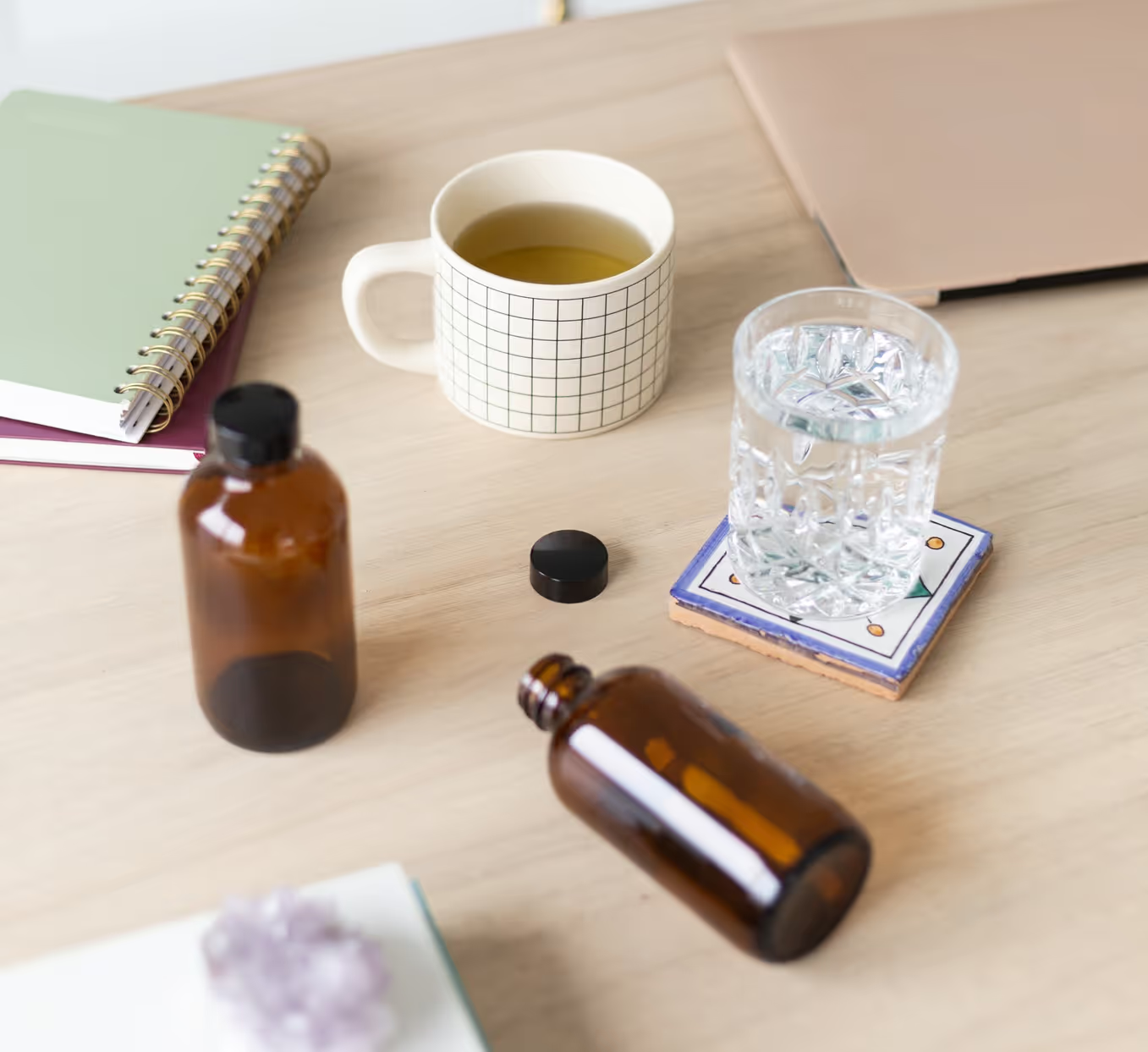
Bloated Again? 4 Natural Remedies That Beat the Bloat
Bloating might be common—but that doesn’t mean you have to just put up with it.
You eat a normal meal, and suddenly you’re unbuttoning your jeans or feeling six months pregnant. Maybe it hits every month like clockwork during your luteal phase. Or maybe it shows up uninvited when you’re already stressed and rushing through your day.
Whatever the pattern, that tight, gassy, uncomfortable feeling can make you feel totally off.
If this sounds like you, here are 4 of my go-to herbal remedies—trusted tools I use in clinic as a naturopathic doctor to help calm digestion, move gas along, and take the pressure off (literally!).
1. Peppermint
This antispasmodic herb helps relax the smooth muscle of your digestive tract, making it especially helpful for cramping and gas. It’s well-studied for IBS and post-meal bloating—and can feel like relief in a cup of tea.
2. Fennel
Fennel is a gentle carminative—it helps gas move through the intestines and eases that uncomfortable fullness. It also tastes slightly sweet, making it perfect for a calming tea blend.
3. Ginger
Ginger stimulates digestion, helps with stomach emptying, and reduces inflammation. It’s a top choice for that heavy, sluggish post-meal bloat—especially if you also feel a little nauseous.
4. Chamomile
Often overlooked for digestion, chamomile is a gut-calming superstar. If your bloating is linked to stress, tension, or “gut anxiety,” this is your herb.
Bloating has many causes—from food sensitivities to hormone shifts to gut dysbiosis—but herbs like these can offer gentle, effective relief while you work on the deeper root.
Looking for personalized support with digestion, hormones, or fatigue? Let’s find out what your body’s trying to tell you.
Disclaimer: Any information is for informational purposes only and is not intended to be used in place of professional medical advice. Always seek the advice of a qualified health care practitioner with any questions or health concerns you may have and before starting any new treatments (including supplements).
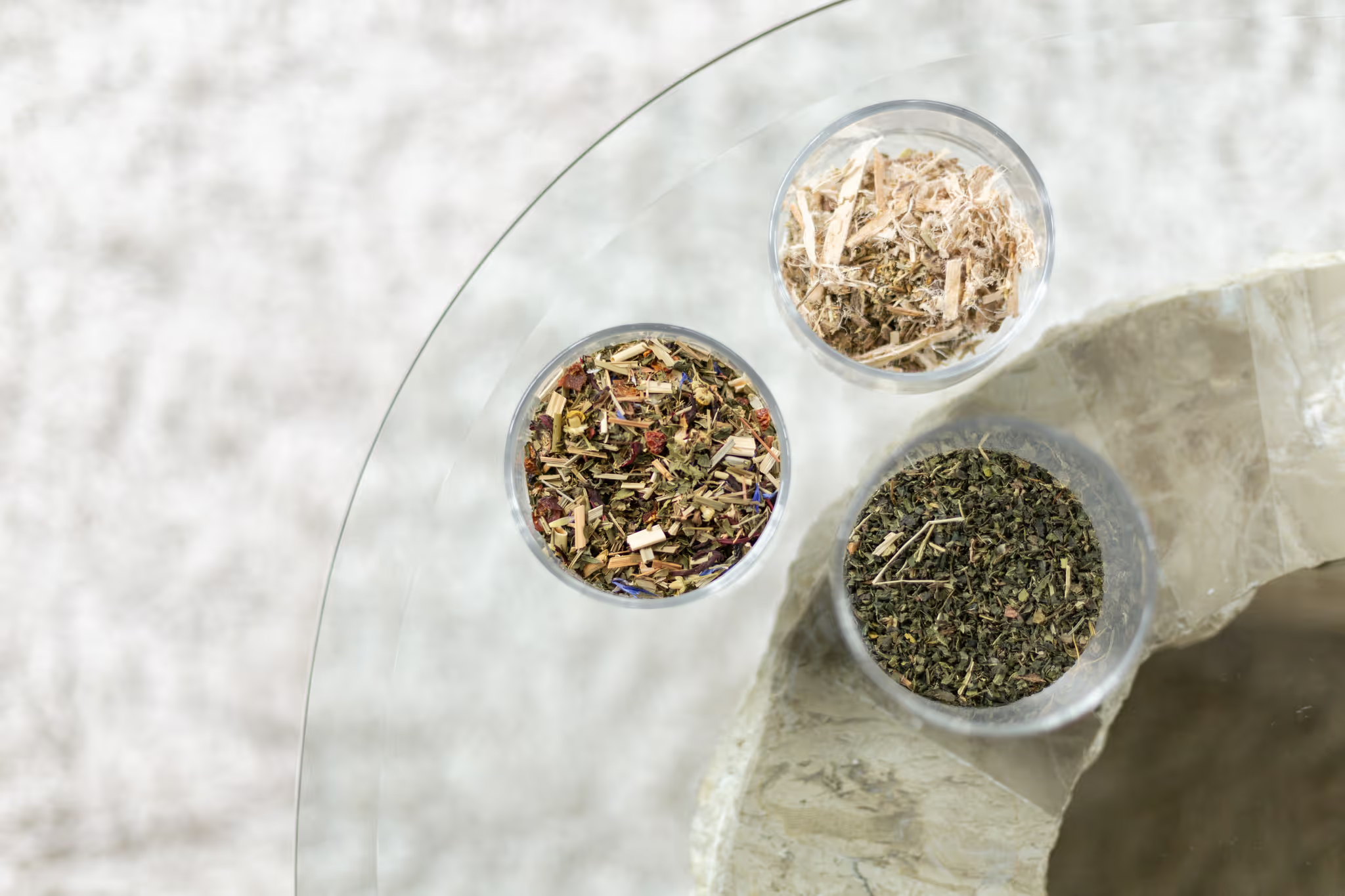
Is Berberine the Natural Ozempic? Exploring Its Benefits for Insulin Resistance, PCOS, and Gut Health
If I had to name one supplement that I get asked about the most as a naturopathic doctor, it’s berberine! You might’ve seen it popping up lately as a so-called “natural Ozempic” or a trendy weight-loss herb. But berberine’s benefits go far beyond blood sugar control, and it's been a trusted tool in my clinic long before it became a trendy social media craze.
Let’s break it down.
What is Berberine?
Berberine is a compound found in several plants, including Berberis vulgaris (barberry), Coptis chinensis (goldthread), and Oregon grape. In herbal medicine and Traditional Chinese Medicine, these plants have long been used for digestive and metabolic issues.
Modern research has confirmed what traditional medicine always knew: berberine is a powerful tool. It’s been shown to support insulin sensitivity, reduce inflammation, improve gut health, and even positively impact cholesterol levels.
Why Insulin Matters (Even If You Don’t Have Diabetes)
Insulin resistance is a sneaky driver of fatigue, stubborn weight gain, PCOS, hormonal acne, irregular cycles, and mood swings. And it’s more common than you think—even in people with “normal” blood sugar. I would say as high as 1 in 3 people I test in my clinic have signs of insulin resistance!
The problem? Standard testing often misses it.
When your doctor runs basic labs, they might check fasting glucose and hemoglobin A1c, but that doesn’t give the full picture. You can have “normal” results and still be experiencing the early stages of insulin resistance.
What I look at instead is something called HOMA-IR—a calculation based on your fasting glucose and fasting insulin levels. It’s a simple and cost-effective blood test, and it’s one of the most useful markers I use when patients are struggling with energy, weight, or hormone symptoms that just won’t budge.
How Berberine Helps
Berberine helps your cells respond to insulin more effectively. It activates an enzyme called AMPK (think of it as your body’s metabolic master switch), which helps improve how your body uses glucose and stores fat.
Berberine has been found to significantly reduced fasting blood glucose, HbA1c, triglycerides, and insulin compared to placebo—and it had a comparable effect to metformin in people with type 2 diabetes (Yin et al., 2012).
It’s also been shown to:
• Improve HOMA-IR scores and insulin sensitivity (Zhang et al., 2008)
• Support weight loss in people with metabolic syndrome (Hu et al., 2012)
• Reduce androgen levels in PCOS, improve ovulation rates, and lower LH/FSH ratios (Wei et al., 2012)
• Lower cholesterol and triglyceride levels (Kong et al., 2004)
Gut Health Bonus
One of the coolest things about berberine? It also acts as a natural antimicrobial and can help rebalance the gut microbiome.
It’s been shown to modulate gut bacteria, increasing short-chain fatty acid producers while reducing pathogens—a big win for people with SIBO, IBS, or dysbiosis.
This dual action—on both insulin and gut health—is part of what makes it such a clinic favourite.
Final Thoughts
Berberine isn’t for everyone, and it is one of those supplements that works best when it’s part of a bigger plan—not a quick fix.
If you’re feeling stuck with fatigue, weight, skin issues, or hormonal symptoms—and blood work keeps coming back “normal”—your insulin might be worth a second look.
Berberine isn’t magic. But it is a powerful tool when used thoughtfully and strategically, especially alongside diet, movement, and nervous system support.
Want to know if it’s right for you? Book a free call or bring your latest bloodwork—we’ll dig into what your numbers are actually telling us!
Disclaimer: Any information is for informational purposes only and is not intended to be used in place of professional medical advice. Always seek the advice of a qualified health care practitioner with any questions or health concerns you may have and before starting any new treatments (including supplements).

How Vagal Nerve Exercises Help with Bloating, Brain Fog, and Burnout
Headaches. Bloating. Anxiety. Brain fog. Fatigue. What do all of these have in common?
They’re often signs that your nervous system needs support—and more specifically, that your vagus nerve might not be functioning optimally.
In a previous post, I shared 3 simple vagal nerve exercises to help calm the nervous system. Today, I want to take that conversation one step further. Because for many of my patients, symptoms like bloating, brain fog, and even burnout are connected to poor vagal tone. And the good news? With the right tools, we can retrain the body to shift back into rest, digest, and heal mode.
What Is the Vagus Nerve, Again?
The vagus nerve is the longest cranial nerve in the body, running from the brainstem down to the gut—and touching almost every major organ along the way. It plays a huge role in regulating the parasympathetic nervous system (aka your “rest and digest” state).
When the vagus nerve is strong and active, your body knows how to calm down after stress, digest food properly, and return to a regulated baseline. But when vagal tone is poor, it’s like your system gets stuck in “on” mode—wired, inflamed, and unable to reset.
Bloating and the Gut-Brain Connection
If you’ve been bloated despite eating well, taking probiotics, or doing all the “right” gut-health things, your vagus nerve might be the missing link. The vagus nerve stimulates digestive enzymes, stomach acid, and gut motility. If it’s under-functioning, digestion slows down—and gas, bloating, or constipation can result. In fact, many of my patients with IBS-like symptoms notice major improvement with vagus nerve stimulation exercises—because we’re targeting the signal, not just the symptom.
Brain Fog, Burnout, and the Freeze Response
The vagus nerve also connects to the heart and brain, influencing your mood, energy, and cognitive function. When vagal tone is low, you may feel foggy, anxious, unmotivated, or emotionally flat—even when life feels "fine" on the outside.
This state is often tied to nervous system dysregulation. You may be running in fight-or-flight mode for so long that your body slips into freeze—where everything feels dull, heavy, or disconnected. This is more than just mental fatigue; it’s a sign your system needs support to return to safety and regulation.
Daily vagal stimulation can help shift the body out of survival mode, especially when paired with breathwork, nervous-system-focused acupuncture, and nutritional support. Even small changes can make a big difference over time.
Start Small: 5 Simple Vagal Nerve Exercises
You don’t need a fancy routine or expensive tools to support your vagus nerve. These quick, gentle exercises can be done at home—and they only take a few minutes a day:
• Humming or chanting: Stimulates the vocal cords and vagus nerve through vibration. Try this while driving, walking, or doing dishes.
• Gargling water: Gargle loudly for 30–60 seconds. This activates vagal pathways that connect to the throat and voice box.
• Cold exposure: Splash cold water on your face or end your shower with 15–30 seconds of cold. This activates the dive reflex and parasympathetic tone.
• Diaphragmatic breathing: Breathe slowly in through the nose and out through the mouth, focusing on expanding the belly (not the chest).
• Acupuncture: Specific points help regulate vagal tone and support parasympathetic reset—especially when combined with calming breathwork.
Try choosing 1–2 each day and sticking with them for a few weeks. It doesn’t need to be perfect—it just needs to be consistent.
Feeling Foggy, Bloated, or Burnt Out? Let’s Look at the Root.
In my practice, I use The Hormone Cornerstone Method to assess how your nervous system, stress response, and hormonal patterns are connected—and what’s needed to bring your body back into balance. If you’ve been stuck in a cycle of fatigue, bloating, or brain fog, vagus nerve support might be the missing link.\
Acupuncture is one of my favourite ways to shift the body into healing mode, and I combine it with targeted nutrition and lifestyle strategies to support long-term nervous system health.
Want to explore how this applies to your body? Let’s work together to calm your system, reset your stress response, and start feeling like yourself again.
Disclaimer: Any information is for informational purposes only and is not intended to be used in place of professional medical advice. Always seek the advice of a qualified health care practitioner with any questions or health concerns you may have and before starting any new treatments (including supplements).

From Tension to Triggers: Understanding the Root Causes of Your Headaches
Headaches are a common complaint I see in my naturopathic practice —and for good reason. Whether it’s a dull ache behind the eyes, pressure at the base of the skull, or a full-blown migraine that takes you out for the day, headaches can seriously interfere with your ability to function and feel your best. I know, Ive been there!
While many people reach for over-the-counter painkillers, these often only provide short-term relief. In practice, I’ve found that understanding the why behind your headaches is the key to lasting change. And surprisingly? Even chronic, long-standing headaches sometimes have a really simple fix—if you know what to look for.
Here are some of the most common root causes I see in clinic—and how we begin to address them.
1. Blood Sugar Imbalances & Long Fasting Windows
One of the most overlooked causes of headaches is blood sugar instability. Skipping meals, delaying breakfast, or going too long between meals can lead to dips in blood sugar that trigger headaches. For some, it’s a dull ache; for others, it builds into something more intense—especially if caffeine or stress is layered on top.
Fasting can be a helpful tool in certain cases, but if you’re prone to headaches (or already running on stress), it may not be the right fit. A simple change—like starting your day with a protein-rich breakfast and eating consistently throughout the day—can make a huge difference.
2. Magnesium Deficiency
Magnesium is one of the most important minerals when it comes to preventing and treating headaches. It supports muscle relaxation, blood vessel tone, and nervous system regulation—all of which are deeply involved in headache physiology. It’s also one of the first minerals to get depleted during times of stress, intense training, or hormonal shifts.
Many people are unknowingly low in magnesium, especially if they experience constipation, restless legs, or poor sleep in addition to headaches. I often recommend magnesium bisglycinate for its calming effects, though the best form and dose depends on the person.
3. Poor Ergonomics & Structural Tension
Headaches that stem from the neck, jaw, or upper back are incredibly common—especially if you spend your day hunched over a laptop or phone. Poor posture, long periods of sitting, and clenching the jaw can create tightness and trigger tension headaches that creep upward.
Bodywork can be essential here. I often refer patients for osteopathy, massage, acupuncture, or physiotherapy to release this chronic tension, especially if it’s not improving with stretches alone. Even simple changes to your workstation setup can help prevent daily irritation that leads to pain.
4. Stress & Nervous System Overload
Stress is one of the most potent headache triggers, yet it’s often the hardest one to address. It affects the nervous system, tightens muscles, depletes magnesium, and alters hormones—setting the stage for both migraines and tension headaches.
If your headaches tend to arrive after a stressful week, an emotional event, or during periods of burnout, it’s worth exploring how your body handles stress. Nervous system support—whether through acupuncture, breathwork, adaptogens, or daily routines—can be a game-changer.
5. Hormonal Shifts & Menstrual Migraines
For many people, headaches follow a hormonal pattern. If you find they worsen just before your period, you may be experiencing menstrual migraines. These are often linked to the drop in estrogen that occurs right before menstruation, particularly in those with sensitive nervous systems or underlying inflammation.
Supporting estrogen detox pathways, balancing blood sugar, and calming the nervous system can go a long way. I also explore the role of magnesium, B vitamins, and liver support during the luteal phase for patients who experience recurring hormonal headaches.
Let’s Get to the Root of Your Headaches
If you’re struggling with recurring headaches or migraines, know that there is a reason—even if it hasn’t been found yet. Naturopathic medicine is about getting to the root—whether that’s blood sugar, tension, stress, or hormones—and building a plan that supports your whole system.
In my practice, I use The Hormone Cornerstone Method to uncover your unique contributing factors and create a personalized plan for long-term relief. Acupuncture is also one of my favorite tools for regulating the nervous system, reducing pain, and relieving muscle tension—all without medication.
Ready to explore the root causes of your headaches and get support that actually addresses them? Let’s work together to help you feel better—for good.
Your health deserves a personalized approach. Book a free discovery call today, and let’s talk about if this wonderful herb is right for you!
Disclaimer: Any information is for informational purposes only and is not intended to be used in place of professional medical advice. Always seek the advice of a qualified health care practitioner with any questions or health concerns you may have and before starting any new treatments (including supplements).

Is Magnesium the Missing Link? Everything You Need to Know Before Taking a Magnesium Supplement
Magnesium is one of those minerals that comes up a lot in my practice—especially when someone’s feeling off but can’t quite put their finger on why.
Tired but can’t fall asleep? Muscles cramping? Hormones a little out of sync? Maybe digestion isn’t great, or stress feels extra intense.
Enter: magnesium.
This essential mineral plays a role in over 300 biochemical reactions in the body—from supporting the nervous system to balancing hormones and easing muscle tension. And yet, many of us are running low. Thanks to depleted soil, chronic stress, and modern diets, magnesium deficiency is a lot more common than most people realize.
So the question becomes: Should you be taking a magnesium supplement?
Let’s break it down—what it does, how to know if you need it, and which forms are best.
What Magnesium Actually Does in the Body
Magnesium is quietly working behind the scenes all day, every day. It helps with things like energy production, muscle and nerve function, blood sugar regulation, bone health, and activating vitamin D. It’s also a key player in the enzymes that run pretty much every major process in your body.
It supports your nervous system, digestion, hormone metabolism, and cardiovascular health. It’s often called the “calming mineral,” but its role goes way beyond stress and sleep.
Why So Many People Are Low in Magnesium
Here’s the thing: our bodies don’t make magnesium. We have to get it from food (or supplements), and unfortunately, our modern food quality isn’t making that easy.
Magnesium levels in food have dropped due to soil depletion and modern farming practices. Many of us are also living in a near-constant state of stress—which uses up magnesium even faster. Add in things like caffeine, alcohol, birth control, proton pump inhibitors (for acid reflux), and certain diuretics, and magnesium gets drained even more.
Signs of low magnesium can be vague or easy to overlook: fatigue, anxiety, constipation, muscle cramps or twitching, poor sleep, blood sugar crashes, or even hormonal symptoms like PMS or migraines.
Should You Take a Magnesium Supplement?
If you suspect you're low, food sources are a great place to start: leafy greens, nuts and seeds, legumes, and whole grains all contain magnesium. But what I find in my practice is that often food alone is not enough!
Blood tests for magnesium aren’t always reliable because most of your magnesium is stored in bones and tissues—not circulating in your blood. So even if your labs look normal, you could still be running low.
This is where a high-quality supplement can help restore balance. It’s one of those simple, low-risk additions that can quietly make a noticeable difference.
The Different Types of Magnesium—And Which One to Choose
Not all magnesium supplements are created equal. Different forms work differently in the body. Here are 3 of the most common:
• Magnesium citrate – helps get things moving in the digestive tract; good for constipation
• Magnesium bisglycinate – gentle digestion, great for relaxation and sleep, mood, and muscle tension
• Magnesium oxide – cheap and poorly absorbed (not my favorite)
Choosing the right form depends on your specific needs, and sometimes combining forms can be helpful too.
Bottom Line: Is Magnesium the Missing Link for You?
It just might be. Magnesium is one of those behind-the-scenes nutrients that supports everything from mood to energy to digestion and hormone balance. It’s easy to overlook, but once you start giving your body what it needs, the shift can feel surprisingly significant.
Of course, no supplement replaces the bigger picture of how you eat, rest, move, and manage stress—but if you’re looking for a simple, foundational step, magnesium is a great place to start.
Not sure which form or dose is right for you? Book a visit with me here, and we can walk through your symptoms, goals, and get you set up with a personalized plan.
Disclaimer: Any information is for informational purposes only and is not intended to be used in place of professional medical advice. Always seek the advice of a qualified health care practitioner with any questions or health concerns you may have and before starting any new treatments (including supplements).

Why I Drink Lemon Water Every Morning (and How It Supports My Hormonal Balance)
Before my day gets going—before I even think about coffee—I start with a glass of warm lemon water. It's simple, but it’s become one of those grounding rituals I actually look forward to. Not because it’s trendy or because I think it’s a magical detox (your body already knows how to detox just fine, thanks), but because it genuinely helps me feel better. And over time, I’ve seen how this tiny habit can support something much bigger: hormonal balance. As a naturopathic doctor, I’m always looking at the small things that quietly shift the needle on health. Lemon water is one of them. Here’s why.
1. Hydration = Happier Hormones
We lose a surprising amount of water overnight, and even mild dehydration can stress your body and mess with your hormones—particularly cortisol and aldosterone (the hormones that regulate fluid and stress balance). Starting the day with lemon water gives your cells the hydration they need to wake up, energize, and function smoothly.
2. Liver Love = Hormonal Balance
Your liver is one of your body’s main hormone-processing powerhouses. It helps metabolize estrogen, progesterone, and stress hormones like cortisol. Lemon contains compounds like limonene and vitamin C that support healthy liver function. Giving your liver a gentle nudge in the morning can help with estrogen clearance and reduce symptoms tied to hormonal imbalance—like PMS, acne, or fatigue.
3. Gentle Digestive Kickstart
A warm glass of lemon water signals your digestive system to get moving, boosting bile production and stomach acid levels. This can help with bloating, sluggish digestion, and nutrient absorption—all of which are crucial if you’re trying to support your hormones through diet.
4. Blood Sugar Benefits
Stable blood sugar is one of the foundations of hormone health. While lemon water isn’t a magic bullet, starting your day with something supportive instead of sugary helps keep blood sugar levels more stable—especially if followed by a protein-rich breakfast.
5. Ritual Matters More Than We Think
There’s something incredibly grounding about starting your day with intention. That first moment of choosing something simple and nourishing (rather than reaching for caffeine or checking your phone) sets the tone for how you treat your body the rest of the day. And when it comes to hormones? Less stress, more rhythm = better balance.
My Tips for the Perfect Morning Lemon Water:
Use half a fresh lemon, squeezed into warm (not boiling) water. Drink it 10–15 minutes before breakfast. Bonus: add a pinch of sea salt or a splash of apple cider vinegar for extra mineral support.
Bottom Line:
Will lemon water fix your hormones overnight? Definitely not. But it’s one of those little habits that adds up—hydration, digestion, liver support, blood sugar balance, and a moment of calm before the day takes off. And when it comes to hormone health, those small, daily decisions matter more than we give them credit for. So if you’ve been thinking of trying it, consider this your nudge. Start tomorrow. Half a lemon, warm water, and a few quiet minutes for you. Curious what other simple shifts could help your hormones feel more balanced? Book a discovery call to get started!
Disclaimer: Any information is for informational purposes only and is not intended to be used in place of professional medical advice. Always seek the advice of a qualified health care practitioner with any questions or health concerns you may have and before starting any new treatments (including supplements).
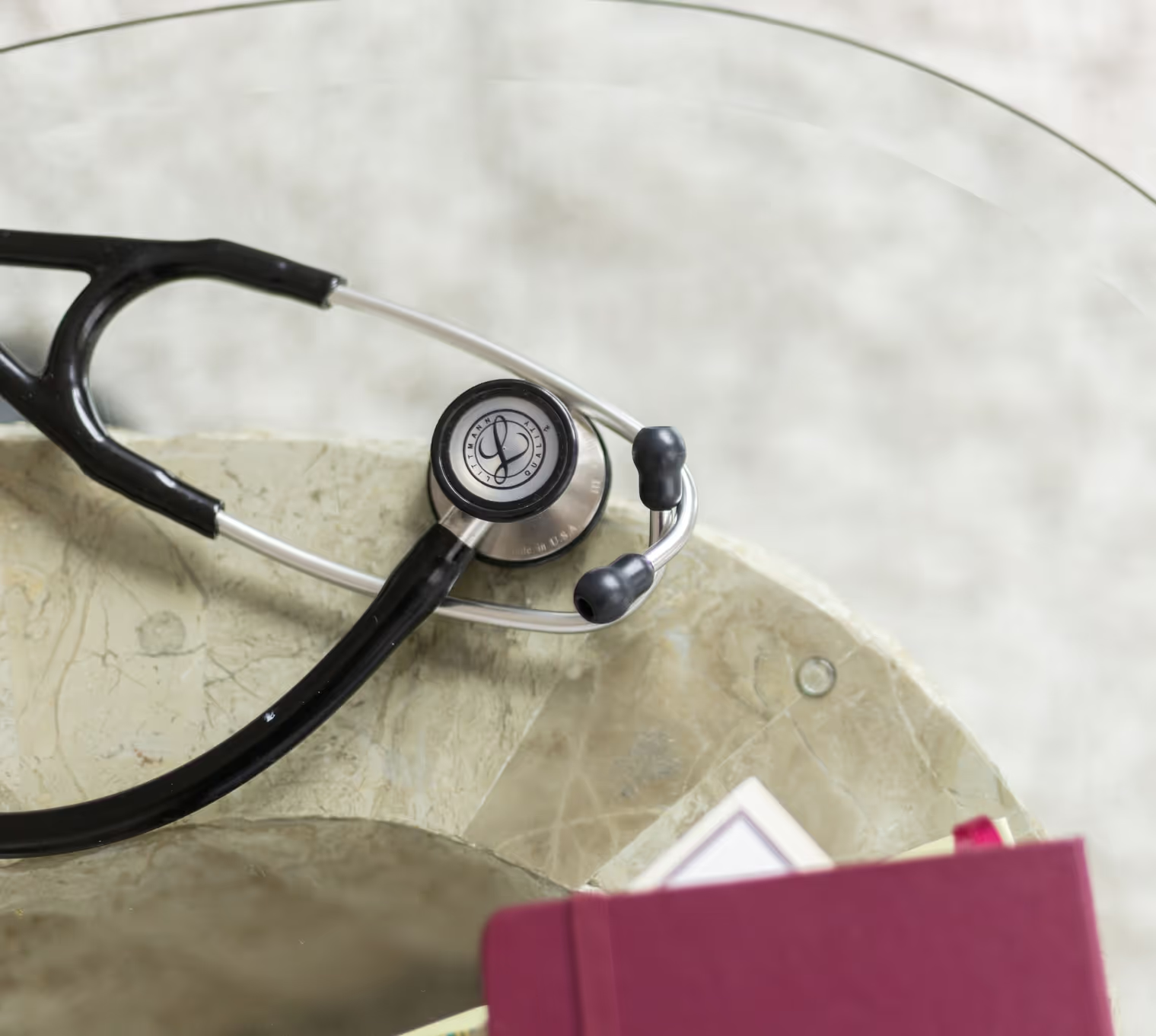
Move More, Sleep Better: How Exercise Transforms Your Sleep
Struggling with restless nights or waking up feeling groggy? As a naturopathic doctor focusing on hormone health and fatigue, I’ve seen firsthand how movement can be one of the most effective (and often overlooked) tools for improving sleep.
Before turning to sleep aids, take a closer look at your daily movement. Exercise plays a powerful role in regulating your sleep cycle, improving sleep quality, and helping you wake up refreshed. But not all exercise is created equal—timing, intensity, and type of movement all matter.
Let’s explore how exercise helps you sleep better, what key sleep factors it improves, and how to optimize your movement routine for deep, restorative rest.
Why Exercise Helps You Sleep
Regular movement supports better sleep by:
• Regulating circadian rhythms, helping your body stay in sync with its natural sleep-wake cycle
• Reducing stress and anxiety by lowering cortisol and increasing endorphins
• Boosting melatonin production for easier sleep onset
• Burning excess energy to prevent feeling wired at night
How Exercise Improves Sleep Quality
• Deep Sleep (Slow-Wave Sleep): Strength training and moderate aerobic exercise increase time spent in deep sleep, aiding recovery and energy levels.
• REM Sleep (Dreaming Stage): Cardio workouts like jogging or cycling can improve REM duration, enhancing focus and emotional balance.
• Heart Rate Variability (HRV): Yoga and walking activate the parasympathetic nervous system, promoting relaxation and better sleep.
Best Timing for Exercise
• Morning: Boosts cortisol naturally, aligns circadian rhythm, and improves alertness.
• Afternoon: Helps reduce stress and supports an easier transition into sleep.
• Evening: Gentle activities like yoga can aid relaxation, but intense workouts too close to bedtime can disrupt sleep. Aim to finish high-intensity exercise at least two to three hours before bed.
Avoid Overtraining for Better Sleep
Excessive exercise can raise cortisol, suppress melatonin, and cause nighttime restlessness. If sleep is suffering, consider adding more rest days, gentle movement, and relaxation-focused activities like yoga or breathwork.
Best Types of Exercise for Sleep
• Strength training (2-3x per week) for deep sleep and hormone balance
• Moderate cardio (walking, cycling, swimming) for circadian rhythm support
• Yoga and stretching to activate the relaxation response
• Outdoor movement for natural light exposure, reinforcing melatonin production
Final Thoughts: Move Smarter for Better Sleep
Exercise is a powerful tool for improving sleep, but timing, intensity, and recovery all play a role. Aim for a balanced movement routine that supports your energy levels during the day while allowing for deep, restorative sleep at night.
If you’re struggling with poor sleep, stress, or fatigue, movement is just one piece of the puzzle. Let’s work together to optimize your hormones, stress response, and lifestyle for the best sleep possible. Book a discovery call to get started!
Disclaimer: Any information is for informational purposes only and is not intended to be used in place of professional medical advice. Always seek the advice of a qualified health care practitioner with any questions or health concerns you may have and before starting any new treatments (including supplements).

Naturopath-Approved High-Fiber, High-Protein Breakfast for Hormonal Balance
When it comes to hormone health, what you eat in the morning sets the tone for the entire day. A breakfast rich in fiber and protein isn’t just about keeping you full—it plays a critical role in balancing hormones, stabilizing blood sugar, and supporting energy levels.
Why Fiber Matters for Hormones
Fiber is essential for keeping digestion running smoothly, but its benefits go beyond gut health. It plays a key role in hormone detoxification, helping your body eliminate excess estrogen through the digestive tract. This is especially important for women with symptoms like PMS, bloating, and heavy periods.
A high-fiber breakfast also supports blood sugar balance, reducing insulin spikes that can trigger cravings, fatigue, and hormonal imbalances over time. If you're struggling with irregular cycles, mood swings, or stubborn weight gain, fiber should be a non-negotiable part of your morning routine.
Why Protein Is Essential at Breakfast
Skipping protein in the morning is a recipe for blood sugar swings, mood dips, and mid-morning energy crashes. Protein helps keep cortisol (your stress hormone) in check, supports muscle repair and metabolism, and provides the building blocks for neurotransmitters that influence mood and focus.
For women in perimenopause or those dealing with insulin resistance, a protein-rich breakfast can help curb cravings, improve satiety, and keep energy steady throughout the day.
Pairing protein with fiber is the ultimate way to keep hormones happy and balanced.
Dr. Margot’s Favourite Easy Hormone-Balancing Breakfast
This high-fiber, high-protein breakfast is my go-to for steady energy, balanced hormones, and keeping cravings in check. Plus, it’s quick to prep and perfect for busy mornings! Plus, it’s packed with ~19g of protein and 17g fiber!
Ingredients:
- 1 glass jar or container (~500ml)
- 2 tbsp hemp hearts
- 2 tbsp chia seeds
- 1 tbsp ground flax seed
- 1 cup unsweetened soy milk
- ½ frozen berries
- Pinch of cinnamon and/or vanilla extract (to taste)
Directions:
1. In a jar or container, mix the hemp hearts, chia seeds, flaxseeds, cinnamon/vanilla, and soy milk.
2. Stir well to combine.
3. Top with frozen berries.
4. Cover and refrigerate overnight.
5. In the morning, stir again before eating.
o Optional: Warm it up for about 30 seconds if you prefer it slightly heated!
Enjoy this fiber-rich, protein-packed breakfast to keep your hormones happy and your energy levels steady all day long!
Ready to Upgrade Your Breakfast?
Now that you know why fiber and protein are so important, it’s time to put it into action. Try the recipe below, and let me know what you think!
If you’re looking for more ways to optimize your diet for hormone balance, book a discovery call, and let’s create a personalized plan that works for you.
Disclaimer: Any information is for informational purposes only and is not intended to be used in place of professional medical advice. Always seek the advice of a qualified health care practitioner with any questions or health concerns you may have and before starting any new treatments (including supplements).

Is Ashwagandha Right for Me? Everything You Need to Know
Ashwagandha has been getting a lot of buzz lately—and for good reason. This ancient adaptogen has been used for centuries in Ayurvedic medicine to support stress resilience, hormonal balance, and optimal energy. But is it the right fit for you?
As a naturopathic doctor, I see so many people struggling with stress, fatigue, and hormone imbalances. Ashwagandha is one of my go-to recommendations because it works with your body’s natural rhythms, rather than forcing a reaction. Whether you need more calm, better sleep, or boost your energy, this powerful herb may help. Let’s break it down.
What Is Ashwagandha?
Ashwagandha (Withania somnifera) is an adaptogenic herb, meaning it helps the body adapt to stress and maintain balance. It’s best known for its ability to support adrenal function, regulate cortisol levels, and enhance overall well-being.
Benefits of Ashwagandha
1. Supports Stress & Anxiety Management
Feeling constantly overwhelmed? Ashwagandha is known for its calming effect on the nervous system. Studies show that it can lower cortisol levels, reducing stress and anxiety naturally.
2. Balances Hormones
Hormonal imbalances—whether it’s high cortisol, irregular cycles, low testosterone, or perimenopausal symptoms—can throw your body off. Ashwagandha helps regulate adrenal function, which in turn influences hormones like estrogen, progesterone, and testosterone.
3. Enhances Sleep Quality
Struggling to fall or stay asleep? Ashwagandha promotes relaxation and has been shown to improve both sleep onset and quality, making it a great natural alternative to sleep aids.
4. Boosts Energy & Endurance
Ashwagandha doesn’t just help you relax—it also enhances stamina and physical endurance. By supporting mitochondrial function, it’s popular among athletes and those dealing with chronic fatigue.
5. Supports Thyroid Function
For those with suboptimal thyroid function, ashwagandha has been shown to support T3 and T4 production, helping to improve metabolism, energy, and mood.
6. Improves Cognitive Function
Brain fog and memory issues? Studies suggest that ashwagandha can support brain health by enhancing memory, reducing cognitive decline, and protecting against oxidative stress.
Is Ashwagandha Right for You?
If you’re feeling drained, stressed, or out of sync with your hormones, you don’t have to figure it out alone. Through my Hormone Cornerstone Method, I help tired men and women reclaim their energy, balance their hormones, and feel like themselves again—without the guesswork.
Your health deserves a personalized approach. Book a free discovery call today, and let’s talk about if this wonderful herb is right for you!
Disclaimer: Any information is for informational purposes only and is not intended to be used in place of professional medical advice. Always seek the advice of a qualified health care practitioner with any questions or health concerns you may have and before starting any new treatments (including supplements).

Reset Your Body: Simple Ways to Support Your Liver Detox After Overindulging
Overindulging happens to the best of us, whether it’s a rich meal, sugary treats, or a few too many cocktails. While an occasional indulgence is part of life, it can leave your body feeling sluggish, bloated, or out of balance. Your liver and your lymphatic system are the star players when it comes to detoxifying your body, and giving it a little extra support during these times can go a long way in helping you feel your best.
The good news is that supporting your liver’s detoxification process doesn’t have to be complicated. There are simple, natural methods you can easily incorporate into your routine to help reset your body and promote better liver health.
Here are four effective ways to support your liver and lymphatics and feel your best after overindulging.
1. Try Castor Oil Packs
A castor oil pack is a gentle yet powerful way to support your liver and lymphatic system. Castor oil has long been used to stimulate circulation, reduce inflammation, and promote detoxification. When applied over the liver area, it helps to support the body’s natural cleansing process.
How to use: Place a small amount of castor oil over your liver (on the right side of your abdomen), and cover it with a towel and heat pack. Relax for 30–60 minutes while the oil works its magic. You can do this a few times a week, especially after heavy meals or periods of overindulgence.
2. Stay Hydrated with Lemon Water
One of the simplest yet most effective habits you can adopt for liver health is starting your day with a glass of warm water and fresh lemon juice. This simple ritual helps flush toxins from your system, supports hydration, and encourages healthy digestion.
Lemon’s natural compounds, including citric acid, can also stimulate the liver’s enzymatic activity, aiding in detoxification. Make this a morning habit to give your body the hydration and liver support it needs to reset.
3. Sip on Liver-Supportive Teas
Herbal teas like dandelion root, turmeric, and ginger are not only soothing but also fantastic for liver health. Dandelion root encourages bile production, which aids in digestion and detoxification. Turmeric is known for its anti-inflammatory properties, supporting the liver’s natural repair processes. Ginger aids in digestion and helps reduce bloating, making it a great choice when your body feels sluggish.
Enjoy these liver-friendly teas between meals for a gentle detox boost. They’re a delicious and easy way to support your liver naturally.
4. Prioritize Restorative Habits
The liver is most effective in its detoxification processes when you’re resting. Prioritize getting 7–8 hours of quality sleep to support your body’s natural repair mechanisms. During sleep, your liver works hard to break down and eliminate toxins, so rest is crucial for optimal function.
Additionally, gentle activities like yoga, deep breathing, or light stretching can help calm the nervous system, allowing your body to focus on detox and repair. These restorative practices reduce stress and promote overall wellbeing, helping you reset both physically and mentally.
-
By incorporating these simple steps into your routine, you can give your liver the support it needs to function at its best, leaving you feeling refreshed and balanced. If you’re ready to take the next step in optimizing your health and detoxification, I’m here to help. Book a consultation with me today to discuss personalized strategies that can support your liver and overall wellbeing. Let’s work together to help you feel your best! Remember, speak to a health care provider before incorporating any new treatments into your lifestyle.
Disclaimer: Any information is for informational purposes only and is not intended to be used in place of professional medical advice. Always seek the advice of a qualified health care practitioner with any questions or health concerns you may have and before starting any new treatments (including supplements).

5 Easy Strategies to Keep Colds Away During the Holiday Season
The holiday season is a time for joy, connection, and celebration—but it’s also prime time for colds and flu. Between gatherings, travel, and chilly weather, our immune systems often face extra challenges. Luckily, there are simple steps you can take to stay healthy and enjoy the festive season without a box of tissues by your side.
Here are five effective strategies to help you dodge colds this holiday season from a Naturopathic Doctor:
1. Stock Up on Immune-Supporting Vitamins
Certain vitamins can give your immune system a much-needed boost. Vitamin D, vitamin C, and zinc are particularly effective at supporting your body’s defenses. Vitamin D helps regulate immune function, while vitamin C supports white blood cell production. Zinc plays a key role in immune response and wound healing. Incorporate foods rich in these nutrients or consider supplements to ensure you’re meeting your daily needs.
2. Incorporate Herbal Medicine
Herbal remedies like echinacea, elderberry, astragalus, and reishi have been shown in research to support immune health. Echinacea can help reduce the severity and duration of colds, elderberry is known for its antiviral properties, astragalus strengthens the immune system, and reishi mushrooms help regulate immunity. These can be taken as teas, tinctures, or capsules for added protection during the cold season.
3. Prioritize Sleep
Quality sleep is one of the most powerful tools for keeping your immune system strong. When you’re well-rested, your body is better equipped to fight off infections. Aim for 7-9 hours of sleep each night and try to maintain a consistent sleep schedule—even during the hustle and bustle of holiday events. Limit alcohol before bed and establish a calming bedtime routine to unwind effectively.
4. Nourish Yourself Before the Holiday Hustle
Holiday parties often mean indulgent foods and sugary treats, but fueling your body with nutritious meals beforehand can help you stay balanced. Focus on fruits, vegetables, lean proteins, and whole grains to provide the nutrients your immune system needs.
Stay hydrated by drinking plenty of water to support your body’s defenses and balance out party beverages. Prioritizing whole foods and hydration before events can help you enjoy the season while keeping your health on track.
5. Set Personal Boundaries
The holiday season often comes with high expectations and overcommitments. Protect your health by setting boundaries and learning to say no when necessary. Avoiding burnout and stress will keep your immune system functioning at its best. Prioritize activities and gatherings that truly bring you joy and give yourself permission to rest when needed.
Bonus Tip: Consider Personalized Support
If you’re looking for tailored advice on how to stay healthy during the holidays, book an appointment with me today. Together, we’ll create a plan to strengthen your immune system and keep you feeling your best all season long.
Through my unique processes, the Hormone Cornerstone Method, I've helped hundreds of tired men and women balance their hormones, correct deficiencies & optimize gut health to feel recharged! Book a free discovery call today to learn more.
Disclaimer: Any information is for informational purposes only and is not intended to be used in place of professional medical advice. Always seek the advice of a qualified health care practitioner with any questions or health concerns you may have and before starting any new treatments (including supplements).

What Does Stress Really Mean? Key Signs of a Stressed Nervous System You Shouldn’t Ignore
As a naturopathic doctor, I often talk about the term “stress”, but I’ve realized that many people don’t necessarily relate to that word. Instead, you might describe feeling constantly overwhelmed, running on adrenaline, or being in perpetual 'go mode. Whatever you call it, these feelings are all signs of chronic stress—and whether we recognize it or not, it’s silently impacting our energy levels, hormones and overall health.
In this blog, we’ll dive into how these modern-day pressures affect your body and mind, and what’s happening with your hormones when you’re running on empty.
For starters, here are some common phrases I hear in my office to described a stressed nervous system:
Overwhelmed
Burnout
High adrenaline
Exhausted
Running on empty
Feeling swamped
Constant worry or racing thoughts
Feeling drained
Juggling too much
Overworked
On edge
Stretched thin
Struggling to cope
Always in a rush
High mental load
Do you resonate with any of these phrases?!
When you're stuck in these states for too long, your body shifts into the sympathetic nervous system, or survival mode, pumping out stress hormones like cortisol and adrenaline. These hormones are designed to help us handle short-term threats, but when they’re constantly elevated, they start to take a toll on your health. This is where things like trouble sleeping, stubborn weight gain and feeling tired but wired come into play.
But it’s not just your energy levels that suffer. Stress impacts your digestion, skin health, immune function, menstrual cycle and mood. You might notice more frequent colds, gut issues like bloating or indigestion, or even skin flare-ups like acne or eczema. Mentally, you may feel more irritable, anxious, or emotionally reactive.
The good news?
There are effective strategies to reset your nervous system and bring your body back into balance. Techniques like acupuncture, herbal remedies, and mindfulness practices can help lower cortisol, support adrenal function, and calm that constant “go mode.”
If you're recognizing yourself in any of these symptoms, it’s a clear sign that your body is asking for a reset. Don’t wait until burnout takes over—now is the time to prioritize your health. By booking a naturopathic appointment, we can use The Hormone Cornerstone Method to dive deeper into what's really going on and uncover the root causes of your stress. Together, we’ll create a personalized plan to help you regain balance, restore your energy, and get you feeling your best again—inside and out. Book a free discovery call today!
Disclaimer: Any information is for informational purposes only and is not intended to be used in place of professional medical advice. Always seek the advice of a qualified health care practitioner with any questions or health concerns you may have.

Tired All The Time? What Your Blood Work Can Reveal!
As someone who helps tired women and men, I know how frustrating it can be to feel exhausted, even after a full night’s sleep. In my practice, I’ve found that fatigue often comes from hidden imbalances in the body—particularly in key nutrients. The good news? Many of these can be easily identified through simple blood tests! By addressing these deficiencies, we can uncover the root cause of your exhaustion and help you feel recharged and energized.
Here are three of the top tests I recommend, though sometimes a more comprehensive approach is needed. That’s why I created my free resource, The Ultimate Blood Work Checklist!
1. Ferritin (Iron Storage):
Ferritin measures your body’s iron reserves. Low ferritin can lead to fatigue, dizziness, and shortness of breath due to insufficient oxygen delivery to tissues. This is especially common in those with heavy periods, vegetarians, or anyone with poor iron absorption or poor gut health.
2. Vitamin D:
Known as the “sunshine vitamin,” vitamin D is crucial for energy and mood. Deficiency is widespread, particularly in Ontario, where we don’t get enough sun. Low vitamin D can lead to fatigue, depression, and muscle weakness.
3. Vitamin B12:
B12 supports nerve function and red blood cell production. Low levels, common in those with plant-based diets or absorption issues due to poor gut health, can cause fatigue, brain fog, and weakness.
Testing these three markers can provide clarity on the underlying causes of fatigue and help create a targeted plan to boost your energy. Simple blood tests can make all the difference in getting you back to feeling your best! Through my unique process, the Hormone Cornerstone Method, I help my patients work through their hormonal imbalances, find the connections between their symptoms, and treat the root cause to finally feel energized! Book a FREE consultation today to learn more or head to my shop for additional resources!
Disclaimer: Any information is for informational purposes only and is not intended to be used in place of professional medical advice. Always seek the advice of a qualified health care practitioner with any questions or health concerns you may have.

The Importance of Vitamin D: Why We All Need More
Living in Ontario, many of us are missing out on one crucial nutrient—my personal favourite—vitamin D! Despite those sunny summer days, I still find that most of my patients aren’t getting enough of this essential vitamin year-round. From October to April, the sun’s rays just aren’t strong enough for our skin to produce adequate vitamin D. And in the summer, we’re often not outside with enough skin exposed to make up the difference. This leads to deficiencies that can have a major impact on mood, immunity, hormones, fatigue and overall health. In fact, up to 80% of my patients have suboptimal levels!
Why Vitamin D is So Important
Vitamin D plays a vital role in many areas of health. Low levels have been linked to an increased risk of depression and seasonal affective disorder (SAD). Research shows that adequate vitamin D supports immune function by boosting white blood cells that are critical to immune defense and decreasing inflammation. It’s also crucial for hormonal balance, particularly for thyroid function and reproductive health. Studies suggest that vitamin D deficiency is associated with issues such as polycystic ovary syndrome (PCOS) and other fertility concerns. Additionally, there’s evidence that vitamin D supplementation improves fatigue and energy levels in those who are deficient.
How to Check Your Vitamin D Levels
Testing for vitamin D is simple and often overlooked. It’s an easy and inexpensive blood test that gives you an accurate measure of your levels. I recommend testing at least once or twice a year to stay on top of it, especially living in a place like Ontario.
How to Optimize Your Vitamin D Levels
Supplementation is usually necessary and can be incredibly effective, but it’s important to dose based on your blood work results to make sure you’re getting what your body needs—no more, no less. Since vitamin D is fat-soluble, your body stores any excess, rather than flushing it out like water-soluble vitamins. That’s why it’s crucial to get it just right. I often find people are either under-supplementing or taking less absorbable forms, which means they’re not getting the full benefit.
Next Steps
I want you to show up as your best self every day! By getting your vitamin D levels tested and supplementing properly, you can support your overall health in a simple yet impactful way. Book a consultation today so we can check your levels and get your vitamin D on track!
Disclaimer: Any information is for informational purposes only and is not intended to be used in place of professional medical advice. Always seek the advice of a qualified health care practitioner with any questions or health concerns you may have.

Calm Your Mind: How Acupuncture Can Help Alleviate Anxiety
In today's fast-paced world, anxiety has become a common challenge for many individuals. The constant stress, endless to-do lists, and overwhelming responsibilities can take a toll on our mental and physical well-being. While there are various ways to manage anxiety, I have found through my practice as a naturopathic doctor that acupuncture can provide a gentle, simple and calming way to find relief.
Understanding Anxiety in Traditional Chinese Medicine (TCM)
In TCM, anxiety is often seen as an imbalance in the body's energy flow, known as Qi (pronounced "chee"). This imbalance can arise from various causes. Through tongue and pulse diagnosis, I can gain insight into the underlying disharmonies within the body unique to you. Acupuncture seeks to restore balance by targeting specific points to regulate the flow of Qi, thereby promoting relaxation and emotional well-being.
How Acupuncture Works To Help Decrease Anxiety:
Regulates the Nervous System:
Acupuncture has been shown to modulate the autonomic nervous system, promoting a state of relaxation and reducing the "fight or flight" response associated with anxiety.
Releases Endorphins:
The insertion of needles stimulates the release of endorphins, the body's natural painkillers and mood elevators, which can help reduce feelings of anxiety and stress.
Improves Circulation:
Acupuncture enhances blood flow, delivering oxygen and nutrients to tissues and removing metabolic waste, which can help alleviate physical symptoms of anxiety such as muscle tension and headaches.
Balances Hormones:
Acupuncture can influence the production and regulation of hormones such as cortisol. By balancing cortisol levels, acupuncture can help reduce anxiety and improve overall emotional stability.
Personalized Treatment with Dr. Margot ND!
One of the strengths of acupuncture is its individualized approach. Each person’s experience of anxiety is unique, and acupuncture treatments are tailored to address specific symptoms and underlying imbalances. If you’re struggling with anxiety, book a FREE discovery call here and we can discuss if acupuncture would be right for you!
Disclaimer: Any information is for informational purposes only and is not intended to be used in place of professional medical advice. Always seek the advice of a qualified health care practitioner with any questions or health concerns you may have.

The Insulin Connection: The Surprising Impact of Insulin on Your Hormone Health
Fasting insulin is one of the most common blood tests I run in my patients as a Naturopathic Doctor. Insulin is a crucial hormone that regulates blood sugar levels and plays a significant role in our overall health. When the body’s response to insulin is impaired, it can lead to a range of health issues. We can use something called the HOMA-IR to interpret our levels of fasting insulin and fasting glucose in relation to each other, which gives us an indicator of insulin sensitivity and resistance. In this article, we’ll explore what insulin resistance means and dive into various, and often surprising, conditions affected by this state.
What is Insulin Sensitivity & Insulin Resistance?
Insulin sensitivity refers to how responsive your body’s cells are to insulin. When you eat, your body breaks down carbohydrates into glucose, which enters your bloodstream. Insulin signals glucose to move from the blood into your cells, where it’s used for energy. If you are insulin sensitive, your cells respond well to insulin, allowing glucose to be effectively used by your body. Insulin resistance occurs when your cells become less responsive to insulin. As a result, more insulin is needed to get the same desired effect on glucose. Over time, this can lead to higher blood sugar levels and a cascade of symptoms.
Conditions Affected by Insulin Resistance:
1. Polycystic Ovary Syndrome (PCOS) and Anovulation:
PCOS is a common hormonal disorder among women characterized by irregular menstrual cycles, ovarian cysts, and elevated levels of male hormones. Insulin resistance is a key factor in PCOS. High insulin levels can increase androgen production, leading to symptoms like anovulation (lack of ovulation), irregular cycles, acne, excess hair growth and infertility.
2. Anxiety and Mood Disorders:
Emerging research suggests a link between insulin resistance and mental health issues such as anxiety and depression. Insulin resistance can lead to inflammation and affect neurotransmitter function, contributing to mood disorders. I often find insulin resistance in my patients can lead to panic attacks and an overall heighted level of anxiety.
3. Fatigue:
Insulin resistance can lead to chronic fatigue. When cells don't respond well to insulin, the body’s ability to utilize glucose for energy is impaired, resulting in persistent tiredness and low energy levels, as well as difficulty with exercise.
4. Difficulty Losing Weight:
Insulin resistance can make weight loss challenging. High insulin levels promote fat storage and prevent fat breakdown, making it harder to loose excess weight despite diet and exercise efforts.
5. Cardiovascular Disease:
Insulin resistance is a significant risk factor for cardiovascular diseases, including hypertension, atherosclerosis, and heart disease. Elevated insulin levels can contribute to the build up of arterial plaque, increasing the risk of heart attacks and strokes.
6. Fatty Liver Disease:
Non-alcoholic fatty liver disease (NAFLD) is closely linked to insulin resistance. High insulin levels can lead to fat accumulation in the liver, causing inflammation and liver damage over time.
7. Sleep Apnea:
There is evidence to suggest that insulin resistance may play a role in sleep apnea, a condition characterized by interrupted breathing during sleep. The relationship appears to be bidirectional, with sleep apnea also worsening insulin resistance.
How Naturopathic Medicine Can Help
Naturopathic medicine offers a holistic approach to managing insulin resistance and its associated conditions. Through the Hormone Cornerstone Methodology, I help my patients address the root cause of their concerns. Together we can run the appropriate tests and implement a number of modalities that can help insulin resistance, including nutritional counselling, herbal medicine, lifestyle modifications, and stress management techniques. By integrating these natural therapies, you can achieve better blood sugar control, reduce symptoms, and enhance your quality of life.
If you’re struggling with symptoms of insulin resistance, such as fatigue, anxiety, or hormonal imbalances, we can easily run blood work and get answers! I've helped hundreds of tired men and balance hormones, correct deficiencies & optimize their gut health to feel recharged! If you would like to discuss how these factors may be playing into your fatigue, book a FREE discovery call here.
Disclaimer: Any information is for informational purposes only and is not intended to be used in place of professional medical advice. Always seek the advice of a qualified health care practitioner with any questions or health concerns you may have.

The Importance of Tracking Your Menstrual Cycle for Fatigue & Hormonal Health
From my personal experience, I know that understanding your menstrual cycle can be a game-changer when it comes to managing your hormonal health and energy levels. The fluctuations in estrogen and progesterone throughout your cycle significantly impact your body and mind, influencing everything from mood and energy to sleep patterns and cognitive function. All to often my patients come into their appointment missing this important link. By tracking your menstrual cycle, you can gain valuable insights into these changes, allowing you to make informed decisions about your health and well-being.
The Benefits of Tracking Your Menstrual Cycle
1. Understanding Patterns:
By tracking your cycle, you can identify patterns in your energy levels, mood, and physical symptoms. This understanding can help you anticipate and manage these changes more effectively.
2. Improved Symptom Management:
Knowing when to expect changes can help you plan your activities and workload around your cycle, optimizing productivity and well-being.
3. Personalized Health Insights:
Tracking can reveal how lifestyle factors such as diet, exercise, and sleep affect your cycle, allowing you to make adjustments for better hormonal balance.
4. Early Detection of Issues:
Regular tracking can help identify irregularities in your cycle, which can be early indicators of hormonal imbalances or other health concerns.
Case Study: Sarah's Journey to Understanding Her Fatigue
Sarah, a 32-year-old professional, came to my practice feeling chronically fatigued and experiencing severe mood swings. By tracking her menstrual cycle over several months, we discovered that her energy levels significantly dropped during her luteal phase, particularly in the week before her period.
With this insight, we adjusted her diet to include more nutrient-dense foods, increased her intake of magnesium and B vitamins, and implemented a tailored exercise routine that included more restorative activities like yoga and walking during her luteal phase. Additionally, we used herbal supplements to support her hormonal balance.
Over time, Sarah noticed a marked improvement in her energy levels and mood stability. By understanding and working with her cycle, she was able to regain control over her health and well-being.
Tracking your menstrual cycle is a powerful tool for understanding and managing your hormonal health and fatigue. By recognizing the patterns in your cycle, you can make proactive choices that support your energy levels, mood, and overall health.
Through the hormone cornerstone methodology, my unique processes includes a full assessment, intentional testing options and individualized and manageable treatment plans. I've helped hundreds of men and women take the next step and make small changes for dramatic shifts in their health and wellness. If you would like to discuss how these factors may be playing into your fatigue, book a FREE discovery call here.
Disclaimer: Any information is for informational purposes only and is not intended to be used in place of professional medical advice. Always seek the advice of a qualified health care practitioner with any questions or health concerns you may have.

3 Vagal Nerve Exercises to Calm the Nervous System Response
Did you know that you can activate your body's natural relaxation response with simple vagal nerve exercises? The vagus nerve, a key component of the parasympathetic (or rest and digest) nervous system, plays a crucial role in regulating stress and promoting relaxation. I talk to all my patients about the importance of being in the parasympathetic state! By stimulating the vagus nerve, you can help calm the body's stress response and restore balance to your nervous system.
Here are three of my favourite and simple exercises to try:
1. Deep Breathing:
Take a few moments to focus on your breath. Inhale deeply through your nose, allowing your abdomen to expand fully, and exhale slowly through your mouth. Repeat this deep breathing pattern for several minutes, paying attention to the sensation of your breath as it enters and leaves your body. Bonus – try and feel your diaphragm muscle rise and fall as you fill your lungs. Deep breathing activates the vagus nerve through the diaphragm and promotes relaxation, helping to reduce stress and anxiety.
2. Humming & Singing:
This one is the most fun! To hum, close your eyes and take a deep breath in. As you exhale, begin to hum softly, feeling the vibrations resonate in your throat and chest. Continue humming for several breaths, allowing the sound to soothe and calm your nervous system. For singing, feel free to belt it out – in the car, in the shower, or in your living room! Both actions stimulate the vagus nerve and promote relaxation, making it an effective tool for managing stress and your nervous system.
3. Gargling:
Fill a glass with warm water and a pinch of salt. Take a sip of the saltwater solution and tilt your head back slightly. Gargle the water in the back of your throat for 30 seconds to a minute, focusing on the sensation of the water against your throat. Spit out the water and repeat this gargling exercise several times. Gargling activates the muscles in the back of the throat, stimulating the vagus nerve and promoting relaxation.
Incorporate these simple vagal nerve exercises into your daily routine to help calm your nervous system response. Remember, finding moments of calm is essential for maintaining balance in today's busy world. So take a deep breath, hum a little tune, or indulge in a soothing gargle—and let the relaxation wash over you.
For some inspiration, check out this curated playlist I made to sing your heart out ;)
If you are finding you spend time during the day in the sympathetic nervous system state, or fight or flight mode, we should connect. Through my unique processes of a full assessment, intentional testing options and individualized and manageable treatment plans, I've helped hundreds of tired men and women balance their hormones, correct deficiencies & optimize gut health to feel recharged! We can find ways to calm your nervous system using naturopathic medicine and get you feeling like your best self.
Disclaimer: Any information is for informational purposes only and is not intended to be used in place of professional medical advice. Always seek the advice of a qualified health care practitioner with any questions or health concerns you may have and before starting any new treatments (including supplements).

How Stress Impacts Your Nervous System: Understanding the Cortisol Connection
No matter how you define it, in today's fast-paced world stress seems to be an inevitable part of daily life. As a naturopathic doctor, each and everyone of my patients is met with life challenges such as looming deadlines, financial pressures, or family situations which take a toll on their mental and physical well-being. But have you ever stopped to consider how stress actually affects your body? In this article, we'll dive into the intricate relationship between stress, cortisol, and your nervous system, highlighting the impact that chronic stress can have on your health!
The Nervous System & The Stress Response
We talk a lot about our nervous system – but what is it exactly? Our nervous system includes our brain, the spinal cord and the network of nervous throughout our body. The job of this system is to send messages back and forth from the brain to the body. Through the nerves, the brain tells our body what to do, such as the function of our digestive system and the movement of our muscles. The central nervous system is composed of the brain and spinal cord and the peripheral nervous system includes our nerves. The peripheral nervous system is further broken down into the somatic and autonomic nervous systems.
When faced with a perceived threat or challenge, your body initiates a complex physiological response known as the stress response, or what I like to call a house on fire! This innate survival mechanism is designed to mobilize resources and prepare your body to deal with the stressor at hand. At the heart of the stress response is the activation of the branch of the autonomic nervous system called the sympathetic nervous system, or the fight or flight response. With this response, the adrenals release stress hormones cortisol and adrenaline. This response is automatic and is easily turned on with triggers and cues throughout the day.
The Feedback Loop: Stress, Cortisol, and the Nervous System
The relationship between stress and cortisol is governed by a delicate feedback loop involving the brain and the HPA axis. Under normal circumstances, cortisol levels are tightly regulated to ensure balance and homeostasis within the body. However, chronic stress can disrupt this feedback loop, leading to dysregulation of the HPA axis and further exacerbating the stress response. Elevated cortisol levels have been linked to a number of health problems, including anxiety, depression, insomnia, weight gain, digestive issues, and cardiovascular disease.
Managing Stress and Cortisol Levels
The good news is that there are steps you can take to manage stress and support your body's stress response system – this is where naturopathic medicine shines! From mindfulness practices and relaxation techniques to regular exercise and adequate sleep, incorporating stress-reducing activities into your daily routine can help mitigate the harmful effects of chronic stress. Additionally, herbal remedies, adaptogens, and lifestyle interventions can play a valuable role in promoting resilience and restoring balance to the nervous system.
By understanding how stress affects your body and implementing strategies to manage stress effectively, you can safeguard your well-being and cultivate resilience in the face of life's challenges. Remember, prioritizing self-care and stress management isn't just a luxury—it's a necessity for thriving in today's world.
Want to dive deeper? Through my unique processes of a full assessment, intentional testing options and individualized and manageable treatment plans, I've helped hundreds of tired men and women balance their hormones, correct deficiencies & optimize gut health to feel recharged! For those seeking a more detailed approach to address fatigue and hormonal imbalances, join me in my new six-week program: The Ultimate Fatigue Roadmap! Details available in my shop and by emailing me directly.
Disclaimer: Any information is for informational purposes only and is not intended to be used in place of professional medical advice. Always seek the advice of a qualified health care practitioner with any questions or health concerns you may have and before starting any new treatments (including supplements).
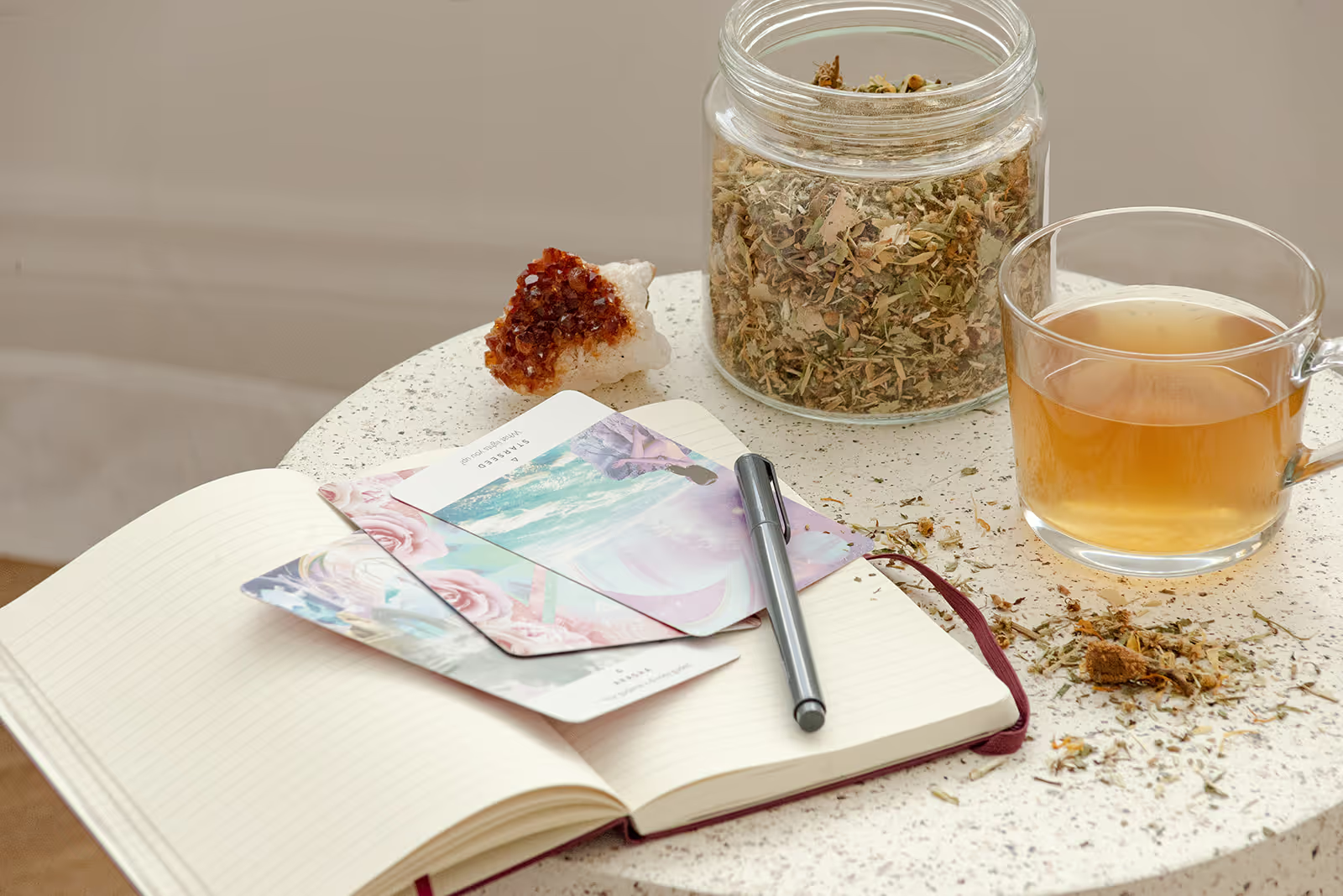
4 Herbs to Help You Sleep Better
As a naturopath specializing in fatigue, hormones, and gut health, I've witnessed the profound impact that sleep quality has on my patient’s lives. In our fast-paced world, where stress and distractions are endless, achieving restful sleep needs to be a priority. Over the years I have used herbal medicine as a gentle, soothing and easy way to improve our sleep without the need for melatonin and stronger sleep medications.
Lets dive into 4 of my favourite sleep herbs – which can be used as teas, tinctures, essential oils and in supplement form!
1. Passionflower (Passiflora incarnata)
Passionflower has a long history of traditional use as a calming herb. Modern research supports these traditional uses, demonstrating passionflower's ability to increase levels of gamma-aminobutyric acid (GABA), a neurotransmitter that promotes relaxation and reduces anxiety. Studies have also shown that passionflower can improve sleep quality by extending the duration of deep sleep stages.
2. Lavender (Lavandula angustifolia)
Lavender's soothing aroma is familiar as a popular scent in aromatherapy products and sleep aids. Research suggests that lavender before bedtime can improve sleep quality, increase time spent in deep sleep, and reduce daytime sleepiness. Lavender's calming effects are believed to be attributed to its ability to modulate the activity of the autonomic nervous system, promoting a state of relaxation conducive to sleep.
3. Chamomile (Matricaria chamomilla)
Chamomile tea is a beloved bedtime ritual for many, cherished for its gentle sedative properties. This daisy-like herb contains apigenin, a flavonoid compound that binds to benzodiazepine receptors in the brain, exerting anxiolytic (anxiety-reducing) and sleep-inducing effects. Chamomile is also valued for its ability to soothe gastrointestinal discomfort, making it particularly beneficial for those whose sleep is disrupted by digestive issues.
4. Ashwagandha (Withania somnifera)
Ashwagandha is revered in Ayurvedic medicine for its adaptogenic properties, which help the body adapt to stress and promote cortisol balance. While traditionally used to enhance vitality and stamina, ashwagandha's calming effects also make it a valuable herb for promoting restful sleep. Research suggests that ashwagandha supplementation can reduce cortisol levels, lower anxiety, and improve sleep quality by enhancing the body's resilience to stress.
Incorporating these herbs into your bedtime routine, along with good sleep hygiene practices, can help you achieve the restorative sleep you deserve!
Let me help you prioritize your sleep and nurture your body with the power of botanical medicine. Through my unique processes of a full assessment, intentional testing options and individualized and manageable treatment plans, I've helped hundreds of tired men and women balance their hormones, correct deficiencies & optimize gut health to feel recharged! Book your naturopathic initial assessment today.
Disclaimer: Any information is for informational purposes only and is not intended to be used in place of professional medical advice. Always seek the advice of a qualified health care practitioner with any questions or health concerns you may have and before starting any new treatments (including supplements).

Transform Your Nights: The Ultimate Lifestyle Change for Better Sleep
As a naturopathic doctor that helps tired men and women, sleep is one of the cornerstones we always focus on. Sleep quality and quantity not only impacts how we feel during the day, but also interplays with other hormones in our body. When we get good sleep, our metabolism works more efficiently, our cortisol is regulated and our inflammation is lowered. In the fast-paced rhythm of modern living, where sleep can often take a backseat, there's one lifestyle change that stands out as the secret to unlocking restful nights and energized days.
Understanding Circadian Rhythms:
Our bodies operate on a 24hr routine, or circadian rhythm, which dictates when we feel alert and when we naturally wind down. Our circadian rhythm is impacted by a number of factors during the day, including our exposure to natural daylight and our exposure to blue light and screen time.
The Power of Consistent Sleep Schedule:
When it comes to our sleep quality and quantity, the number one change we can make to optimize our hormones is establish a consistent bedtime and wake up time. When you do this, even on weekends—you fine-tune your body's internal clock, promoting regular sleep patterns and optimizing the quality of your rest. To best stick to your schedule, I recommend setting an alarm in the evening to remind you to unwind, and create an easy and relaxing routine to carry out each day. Pay attention to your screen use, as well as consumption of stimulants such as caffeine and nicotine.
In your pursuit of revitalized well-being, embrace the power of a consistent sleep schedule as the factor for positive change. By respecting your body's natural rhythms, cultivating a tranquil bedtime routine, and minimizing sleep disruptors, you pave the way for restorative and rejuvenating nights. Remember, transforming your sleep habits is a gradual process, and the benefits will unfold over time. To dive into the science of sleep and for more easy to implement changes, join my six week program – the Ultimate Fatigue Road Map!
Through my unique processes of a full assessment, intentional testing options and individualized and manageable treatment plans, I've helped hundreds of tired men and women balance their hormones, correct deficiencies & optimize gut health to feel recharged!
Disclaimer: Any information is for informational purposes only and is not intended to be used in place of professional medical advice. Always seek the advice of a qualified health care practitioner with any questions or health concerns you may have and before starting any new treatments (including supplements).

The Intricate Balance of Hormones in Fatigue: A Naturopathic Perspective
In the intricate dance of our body's biochemical processes, hormones play a pivotal role in regulating various functions, including our energy levels. There are five main hormones involved in your energy levels. Understanding the interplay between hormones and fatigue is crucial for addressing the root causes of exhaustion and promoting overall well-being. Let's dive into each of them!
1. Cortisol: The Stress Hormone:
Cortisol, often referred to as the "stress hormone," is a key player in our body's fight-or-flight response. While acute stress is a natural and necessary part of life, chronic stress can lead to elevated cortisol levels, contributing to fatigue. Naturopathic approaches to managing stress include incorporating adaptogenic herbs like Ashwagandha and lifestyle changes such as mindfulness practices and adequate rest.
2. Melatonin: The Sleep Hormone:
Melatonin, known as the "sleep hormone," plays a vital role in regulating our circadian rhythm. Disruptions in melatonin production can lead to insomnia and, subsequently, fatigue. Naturopathic strategies to enhance melatonin production involve optimizing sleep hygiene, reducing exposure to artificial light before bedtime, and considering melatonin supplementation for those with sleep disorders.
3. Insulin: Balancing Blood Sugar Levels:
Insulin, responsible for facilitating the uptake of glucose into cells, plays a crucial role in maintaining stable blood sugar levels. Fluctuations in blood sugar can impact energy levels and contribute to fatigue. Naturopathic recommendations for stabilizing blood sugar include adopting a balanced diet with complex carbohydrates, protein, and healthy fats, as well as incorporating regular physical activity and managing stress.
4. Thyroid Hormones: The Metabolic Regulators:
Thyroid hormones, T3 and T4, act as metabolic regulators influencing energy production. Hypothyroidism, a condition characterized by an underactive thyroid, is associated with fatigue. Naturopathic interventions focus on supporting thyroid health through nutrition, including iodine-rich foods, selenium, and zinc, along with the use of adaptogenic herbs and stress management techniques.
5. Sex Hormones: Estrogen, Progesterone, and Testosterone:
Sex hormones, including estrogen, progesterone, and testosterone, play a crucial role in energy and mood regulation. Hormonal imbalances, particularly in women, can contribute to fatigue. Naturopathic approaches involve addressing hormonal imbalances through herbal remedies, lifestyle adjustments, and nutritional support. Supporting overall hormonal health may involve stress reduction, maintaining a healthy weight, and addressing nutritional deficiencies.
In the journey to combat fatigue, it's essential to recognize the intricate web woven by hormones. A holistic naturopathic approach considers the interconnectedness of these hormonal players, emphasizing lifestyle modifications, herbal remedies, and personalized interventions. For those seeking a more detailed approach to address fatigue and hormonal imbalances, join me in my new six-week program: The Ultimate Fatigue Roadmap! Details available in my shop and by emailing me directly.
Through my unique processes of a full assessment, intentional testing options and individualized and manageable treatment plans, I've helped hundreds of tired men and women balance their hormones, correct deficiencies & optimize gut health to feel recharged!
Disclaimer: Any information is for informational purposes only and is not intended to be used in place of professional medical advice. Always seek the advice of a qualified health care practitioner with any questions or health concerns you may have and before starting any new treatments (including supplements).
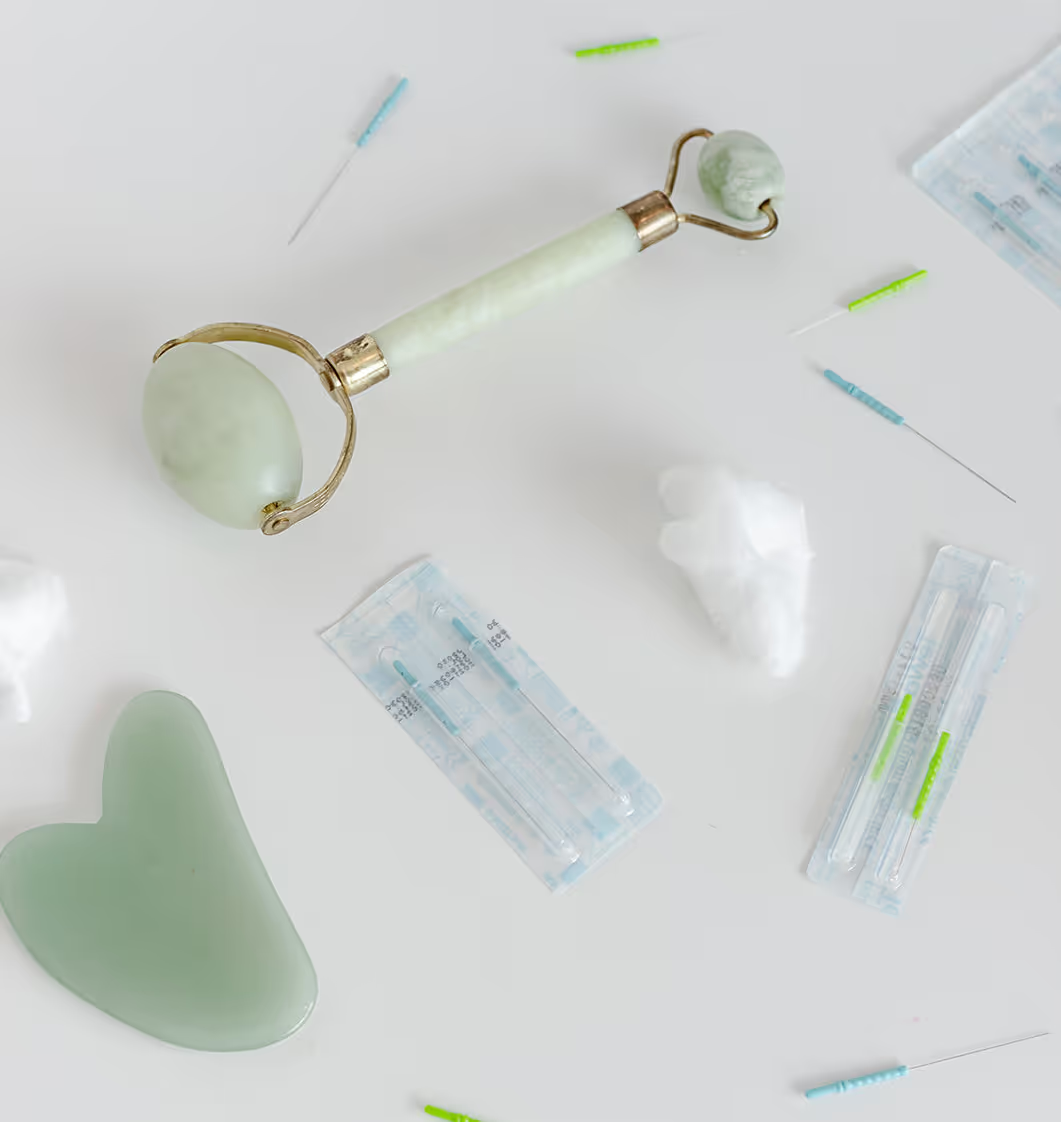
Unlocking the Surprising Link Between Skin Health and Stress: Acupuncture as the Solution
In today's fast-paced world, stress has become an inevitable part of our lives, often leaving its mark not just on our mental health but also on our skin health. The intricate connection between stress and skin conditions is well-documented, and exploring holistic approaches to manage stress-related skin issues is essential. This article dives into the profound relationship between stress and the skin and highlights how acupuncture can emerge as a powerful and natural tool for addressing skin problems.
The Stress-Skin Connection:
The skin is a mirror that reflects our internal well-being, and stress can significantly impact its health. High stress levels trigger the release of hormones like cortisol, which can lead to inflammation, imbalances in oil production, and compromised immune function. These factors contribute to various skin issues, including acne flare-ups, eczema outbreaks, psoriasis exacerbations, and accelerated aging.
Understanding Acupuncture's Role:
Beyond its well-known benefits for pain relief and relaxation, acupuncture has shown promise in addressing stress-induced skin problems through multiple mechanism
Regulating Stress Hormones:
Acupuncture has been linked to the regulation of stress hormones such as cortisol. By promoting a more balanced hormonal environment, acupuncture may help mitigate the negative impact of stress on the skin. This can also indirectly improve the balance of our sex hormones as well!
Improving Blood Circulation:
Enhanced blood circulation is a key benefit of acupuncture. Improved blood flow means better oxygenation and nutrient delivery to the skin, supporting its natural healing processes and reducing inflammation.
Balancing the Nervous System:
Acupuncture has a harmonizing effect on the autonomic nervous system, promoting a shift from the "fight or flight" response (sympathetic) to the "rest and digest" mode (parasympathetic). This shift can contribute to a calmer state of mind and less stress-related skin reactivity.
Boosting Collagen Production:
Stress can accelerate the breakdown of collagen, leading to premature aging. Acupuncture may stimulate collagen production, aiding in maintaining skin elasticity and reducing the appearance of fine lines and wrinkles.
By restoring balance to the body's energy flow and promoting overall well-being, acupuncture can contribute to a radiant complexion that reflects inner harmony.
Through my unique processes of a full assessment, intentional testing options and individualized and manageable treatment plans,I've helped hundreds of men and women take the next step and make small changes for dramatic shifts in their health and wellness. If you're interested in trying out acupuncture, grab an appointment at either of my Toronto locations today! doctormargotnd.com/booking
Disclaimer:Any information is for informational purposes only and is not intended to be used in place of professional medical advice. Always seek the advice of a qualified health care practitioner with any questions or health concerns you may have.

Home Remedies for Common Cold Symptoms
The common cold, a frequent visitor during seasonal changes, often brings with it an array of discomforts—sinus congestion, stubborn coughs, and scratchy throats—that disrupt our daily rhythm. While over-the-counter medications provide relief, natural alternatives nurture the body’s innate healing abilities, making the journey through a cold more manageable and comforting – ideally both managing symptoms and shortening duration.
Here are my top recommendations for each cold symptom:
Sinus Congestion:
To alleviate sinus congestion, steam inhalation with essential oils (such as eucalyptus and thyme), nasal irrigation using a saline solution, magic socks before bed or warm compresses on the sinus areas can provide relief. Additionally, consuming spicy foods, such as those with cayenne pepper or horseradish, may help clear nasal passages by promoting mucus drainage. Lymphatic drainage massage can provide added relief.
Cough:
Honey-based remedies, like honey and warm water or herbal teas with honey, can soothe a cough and reduce throat irritation (Fun fact, research has shown honey to be just as effective as cough syrup for coughs!). Warm beverages like ginger tea or hot water with lemon can also provide relief. Using a humidifier in the room or taking a steamy shower can ease coughing by moistening the airways. Many herbal companies also make great chest rubs that are easily found at your local health food store (and do not use petroleum!)
Sore Throat:
Gargling with warm salt water multiple times a day can ease sore throat discomfort by reducing inflammation and killing bacteria. Herbal teas or lozenges with ingredients like marshmallow root, licorice, or slippery elm may offer soothing effects on the throat. Bee propolis throat sprays, often in combination with ingredients mentioned above, can also provide great relief.
Navigating through the sneezes and sniffles of a common cold becomes less daunting when armed with the right tool kit. It's essential to listen to your body, support its innate healing powers, and rest when needed.
Need some extra support this season? Let's work together to personalize a plan tailored to your unique needs. Book a 1:1appointment with me, and let's explore how natural remedies and holistic practices can support your health and well-being - book a FREE discovery call here.
Through my unique processes of a full assessment, intentional testing options and individualized and manageable treatment plans, I've helped hundreds of men and women take the next step and make small changes for dramatic shifts in their health and wellness
Disclaimer:Any information is for informational purposes only and is not intended to be used in place of professional medical advice. Always seek the advice of a qualified health care practitioner with any questions or health concerns you may have, and before starting any new treatments (including supplements).

Building Your Cold & Flu Home Tool Kit
As the crisp air reminds us colder months are ahead, it also signals the start of cold and flu season. Every year when children go back to school I see an influx of patients, both adults and children, looking for ways to strengthen their immune system and navigate the season with resilience. My biggest tip is to have the tools on hand to start treatment at the first signs of a cold! Here are my must haves:
Essential Supplements
Vitamin C: The Immune Boosting Powerhouse
One of nature's most renowned immune-boosters, Vitamin C, found abundantly in citrus fruits, peppers, and leafy greens, bolsters our defence against seasonal illnesses. We often need a higher dose of vitamin C then we think – but remember too much vitamin c can cause loose stool!
Vitamin D: Nurturing Immune Resilience
As sunlight wanes, supplementing with Vitamin D becomes crucial. This vitamin not only supports bone health but also plays a pivotal role in fortifying our immune system. I recommend all patients have their vitamin d levels tested in the fall to ensure adequate supplementation. Similar to vitamin c, we often need a higher daily dose then we think.
Zinc: Vital for Immune Health
Often overlooked yet crucial, zinc is instrumental in maintaining a robust immune system. Incorporate zinc-rich foods like pumpkin seeds, chickpeas, and lentils into your diet or opt for supplements when needed. Remember, zinc on an empty stomach may cause nausea, so always take with food.
Herbal Helpers
Echinacea: Stimulating Immune Response
Known for its immune supporting properties, Echinacea can significantly boost your body's defences against seasonal illnesses. Research has shown it can both decrease your chances of getting sick, and shorten the duration of colds.
Elderberry: Antiviral Potency
Elderberry, revered for its immune boosting and antiviral properties, can be harnessed in various forms like syrups and teas. Elderberries also contain flavonoids like quercetin and anthocyanins, powerful antioxidants known for their ability to reduce oxidative stress in the body. Bonus, they are the best tasting herb ;)
Garlic: Nature's Antimicrobial Agent
Garlic, celebrated for its antimicrobial properties, serves as a potent ally during cold and flu season. Incorporate it generously in cooking or as a supplement for added immune support.
The cold and flu season does not have to be a time of vulnerability. By harnessing the potency of natural supplements, herbs, and home remedies, we can proactively fortify our immune systems. This season, let's embrace the wealth of nature's offerings, nurturing our bodies and empowering ourselves to thrive.
Ready to take charge of your wellness journey this season? Let's work together to personalize a plan tailored to your unique needs. Book a 1:1 appointment with me, and let's explore how natural remedies and holistic practices can support your immune system - book a FREE discovery call here.
Through my unique processes of a full assessment, intentional testing options and individualized and manageable treatment plans, I've helped hundreds of men and women take the next step and make small changes for dramatic shifts in their health and wellness
Disclaimer:Any information is for informational purposes only and is not intended to be used in place of professional medical advice. Always seek the advice of a qualified health care practitioner with any questions or health concerns you may have and before starting any new treatments (including supplements).

Eczema Culprits: Identifying and Avoiding Common Triggers
Eczema, a chronic skin condition characterized by redness, itching, and inflammation, can be incredibly uncomfortable and disruptive to daily life. While there's no one-size-fits-all solution for managing eczema, one key aspect of effective management is identifying and avoiding common triggers that can exacerbate the condition. Let's dive into some of the more prevalent eczema culprits I see in my practice as a Naturopathic Doctor.
1. Irritants in Skincare Products
Many skincare products contain harsh chemicals and fragrances that can irritate sensitive skin and trigger eczema flare-ups. These irritants may include:
· Sulfates: Found in many shampoos and body washes, sulfates can strip the skin of its natural oils, leading to dryness and irritation.
· Perfumes and Fragrances: Artificial fragrances are a common trigger for eczema.
· Alcohol-based Products: These can be drying and irritating to the skin.
Avoidance Tip: Read product labels carefully and choose skincare products that are labeled "hypoallergenic,""fragrance-free," or "for sensitive skin."
2. Environmental Allergens
Environmental allergens can significantly impact eczema-prone individuals. Some common environmental allergens include:
· Pollen: Seasonal pollen allergies can trigger eczema flare-ups.
· Dust Mites: Found in household dust, dust mites can aggravate eczema symptoms.
· Pet Dander: If you're allergic to pet dander, exposure can worsen your eczema.
Avoidance Tip: Keep your home clean and dust-free, invest in allergy-friendly bedding covers, consider air purifiers and limit exposure to known allergens.
3. Stress and Anxiety
Stress and anxiety are known triggers for eczema, and likely the least considered by my patients. Emotional stress can weaken the skin's barrier function and lead to flare-ups.
Avoidance Tip: Practice stress-reduction techniques such as deep breathing, meditation, yoga, or mindfulness to manage stress and anxiety.
4. Dietary Triggers
Some foods can exacerbate eczema symptoms in certain individuals. I always discuss diet with my patients and through our conversation we can identify any likely suspects, or consider testing options such as food sensitivity testing. Common dietary triggers include:
· Dairy Products: Dairy can be a common trigger for eczema. Try eliminating dairy from your diet for 4-6 weeks to see if it makes a difference.
· Gluten: Some people with eczema may benefit from a gluten-free diet.
· Processed Foods: Highly processed and sugary foods can contribute to inflammation and worsen eczema.
Avoidance Tip: Keep a food diary to track your dietary intake and identify any potential triggers.
5. Hot Water and Over washing
Excessive exposure to hot water and over washing canstrip the skin of its natural oils, leading to dryness and irritation.
Avoidance Tip: Take short, lukewarm showers and use mild, fragrance-free soap. Pat your skin dry gently rather than rubbing it vigorously.

Identifying and avoiding common triggers for eczema is a vital step in managing this challenging skin condition. Keep in mind that eczema triggers can vary from person to person, so what affects one individual may not affect another in the same way. By adopting a holistic approach to eczema management, which includes identifying and avoiding triggers, practicing proper skincare, and considering your unique needs, you can take significant strides toward healthier and happier skin.
To dive deeper into the multi-factorial causes of eczema, necessary testing, diet and lifestyle changes you can make to improve your skin, top skincare recommendations and key supplements to consider, book a FREE discovery call here.
Through my unique processes of a full assessment, intentional testing options and individualized and manageable treatment plans, I've helped hundreds of men and women take the next step and make small changes for dramatic shifts in their health and wellness
Disclaimer:Any information is for informational purposes only and is not intended to be used in place of professional medical advice. Always seek the advice of a qualified health care practitioner with any questions or health concerns you may have.

Cortisol Levels: Testing Methods and Symptoms of Imbalance Explained
Cortisol, often referred to as the "stress hormone," plays a crucial role in our body's response to stress and various physiological functions. Adrenal dysfunction and cortisol dysregulation is one of the most common root causes of illness I see in my naturopathic practice. Understanding the various ways to measure cortisol levels and recognizing the symptoms of imbalance is essential for maintaining optimal health and well-being.
What is Cortisol and Why Does It Matter?
Cortisol is a hormone produced by the adrenal glands, located on top of each kidney. It serves as a key player in the body's stress response system, helping us adapt to challenges. Cortisol also influences metabolism, immune function, blood sugar regulation, and more.
The Natural Circadian Rhythm of Cortisol:
Our body's cortisol levels follow a natural 24hr pattern known as the circadian rhythm. Understanding this rhythm is essential for comprehending how cortisol affects our daily lives. Cortisol begins to raise around 6am, creating a surge that peaks 2hrs after we awaken, known as the cortisol awakening response(CAR). After this is slowly declines and helps maintain energy and alertness throughout the day. The mid day low hits around 2pm, which is often when we feel a lull in energy. After this we get a slightly increase until 6pm, after which it starts to decline again, preparing the body for relaxation and winding down in the evening. When cortisol reaches its lowest point, it supports deep and restorative sleep.
Testing Cortisol Levels:
Here are the most common testing methods:
1. Saliva Testing: Saliva testing is a non-invasive way to monitor cortisol levels. Multiple samples are collected over the course of a day to create a cortisol curve, revealing the diurnal rhythm. The cortisol awakening response (CAR) is a notable feature of this curve.
2. Blood Testing: Blood tests are another reliable way to assess cortisol levels. These tests are often used to diagnose specific conditions like Cushing's syndrome or Addison's disease, where cortisol production is excessively high or low, respectively.
3. Urine Testing: A urine collection provides information about cortisol metabolites, offering a comprehensive view of cortisol production and excretion. This method can be especially helpful in diagnosing conditions related to cortisol imbalances.
Signs of Cortisol Imbalance and Their Impact Include:
- Fatigue: Persistent tiredness and lack of energy
- Weight Gain: Especially around the abdomen and face
- High or Low Blood Pressure, including dizziness upon standing and hypertension
- Mood Swings: Irritability, anxiety, or depression
- Sleep Disturbances: Difficulty falling asleep or staying asleep
- Skin Changes: Thinning skin, easy bruising or acne
- Weakness: Muscle weakness and decreased bone density
- Increased Infections: Lowered immune response
- Irregular Menstrual Cycles
- Digestive Issues: Nausea, vomiting, or abdominal pain
- Loss of Body Hair: Thinning or loss of hair
- Blood Sugar Dysregulation
Cortisol levels play a vital role in maintaining our health and resilience. Understanding the testing methods and recognizing symptoms of imbalance empowers us to take proactive steps toward achieving hormonal harmony. By embracing a balanced lifestyle and seeking professional guidance, we can ensure that our cortisol levels are working in sync with our well-being.
To dive deeper into the the impact of cortisol on your health, including adrenal dysfunction, watch my webinar in the Optimal You Learning Hub!
Through my unique processes of a full assessment, intentional testing options and individualized and manageable treatment plans,I've helped hundreds of men and women take the next step and make small changes for dramatic shifts in their health and wellness. If you would like to discuss how these factors may be playing into your cortisol levels, book a FREE discovery call here.
Disclaimer: Any information is for informational purposes only and is not intended to be used in place of professional medical advice. Always seek the advice of a qualified health care practitioner with any questions or health concerns you may have.
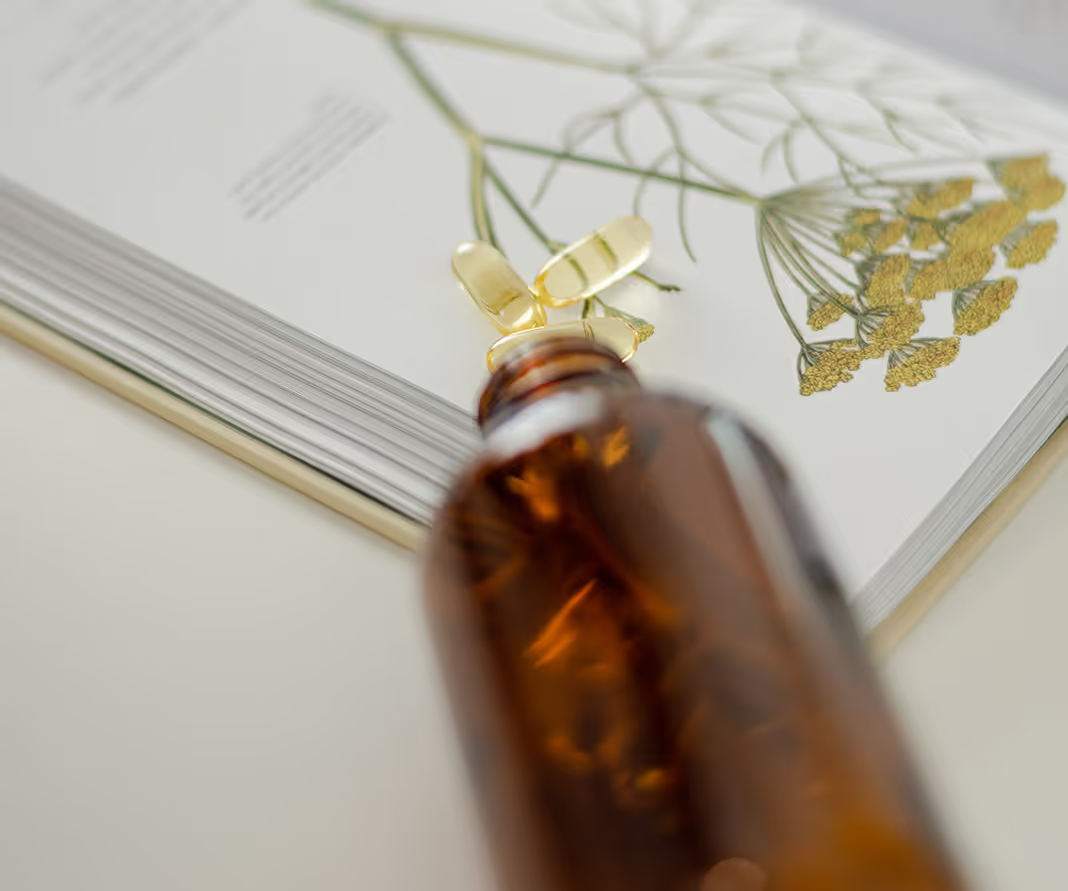
Get Clear Skin Through Your Diet: Essential Vitamins & Nutrients to Help with Acne
While what we put on our skin is important, when it comes to achieving unblemished and radiant skin, it truly is an inside out job. Your skin’s health can be greatly influenced by the variety of vitamins, minerals and nutrients in your diet.
Here are the top nutrients you should consider to aid acne:

Vitamin A
Vitamin A is a powerful antioxidant that supports skin cell turnover and promotes a strong skin barrier. It can help regulate oil production, reduce inflammation and heal acne lesions.
Food sources include: sweet potatoes, carrots, spinach, kale, broccoli, red bell peppers and fish.
Vitamin C
We know vitamin C is essential for collagen synthesis, which encourages skin elasticity and firmness. It can also help protect skin from oxidative stress and provide a brighter complexion.
Food sources include: citrus fruits such as oranges, lemons and grapefruit, tomatoes, raspberries, strawberries, kiwi, Brussels sprouts, bell peppers and broccoli.
Omega-3 Fatty Acids
Research has shown that the healthy fats in fish oils can support skin health by reducing inflammation and decreasing acne. Omega 3’s can benefit optimal moisture levels and promote a smoother complexion.
Food sources include: Fatty fish such as salmon, sardines and mackerel, flax seeds, chia seeds, walnuts and hemp hearts.
Zinc
Zinc is a mineral that plays a crucial role in reducing inflammation, encouraging wound healing and regulating hormone levels. Research has shown it to have a positive impact on acne prone skin.
Food sources include: oysters, beef, pumpkin seeds, chickpeas, lentils and cashews.
In Summary
By including a variety of vitamin rich whole foods in your diet, you can provide your body with the building blocks you need to maintain clear, radiant skin and decrease the impact of acne.
To dive deeper into the multi-factorial causes of acne, necessary testing, diet and lifestyle changes you can make to improve your skin, top skincare recommendations and key supplements to consider, watch my webinar in the Optimal You Membership Community!
Through my unique processes of a full assessment, intentional testing options and individualized and manageable treatment plans,I've helped hundreds of men and women take the next step and make small changes for dramatic shifts in their health and wellness. If you would like to discuss how these factors may be playing into your hormones and skin, book a FREE discovery call here.
Disclaimer: Any information is for informational purposes only and is not intended to be used in place of professional medical advice. Always seek the advice of a qualified health care practitioner with any questions or health concerns you may have.

3 Key Reasons You May Not Be Sleeping Well
Sleepless nights - We have all been there before. Whether it is trouble unwinding before bed, tossing and turning unable to get comfortable, or waking up with a racing mind, it can have a significant impact on your ability to function during the day. Decreased sleep has been linked with poor health outcomes; 6hrs of sleep or less has been shown to increase your risk of stroke by 15% and coronary heart disease by 48%! Adults need 7 –9hrs of sleep each night, however 1 in 3 say they do not reach that number. Sleep is not straightforward and there are a number of different factors as to why we may not be getting the quality and/or quantity of sleep we need. Most people can recognize a few lifestyle habits that may be contributing, such as increased screen time before bed, caffeine too late into the evening, or waking children.
Here are three key reasons you may not be sleeping well:

1.Your body is not naturally producing enough melatonin
Melatonin is the hormone that signals to your body it is time to sleep. It is triggered by darkness and should start to slowly rise in the evening, peaking around 2-4am. Many people do not make enough natural melatonin to promote a long and deep sleep. This can be due to a number of factors, including blue light stimulation from lights and screens.
2.Your cortisol is too high at night
In an opposite pattern to melatonin, cortisol, one of our stress hormones, should peak a few hours after waking. It should slowly decrease as the days goes on and be low at night. If you are exposed to short or long term stress, your body’s natural production of cortisol can shift and the spike can leave you feeling wired and tired leading to trouble falling asleep, or cause you to wake up int he night.
3.Your blood sugar is not being regulated properly
During the night your liver naturally helps process and release glucose into the blood. If your blood sugar is not regulated well during the day, it can cause a spike at night causing poor sleep. Decreased sleep can also lead to blood sugar dysregulation during the day and type 2 diabetes.
To dive deeper into the science around sleep, why you may not be sleeping well and how to improve your sleep quality and quantity for better health and productivity watch my webinar in the Optimal You Membership Community! We will also discuss different ways to track your sleep and simple habits and techniques you can use to get the sleep you need each night.
Through my unique processes of a full assessment, intentional testing options and individualized and manageable treatment plans,I've helped hundreds of men and women take the next step and make small changes for dramatic shifts in their health and wellness. If you would like to discuss how these factors may be playing into your sleep, book a FREE discovery call here.
Disclaimer:Any information is for informational purposes only and is not intended to be used in place of professional medical advice. Always seek the advice of a qualified health care practitioner with any questions or health concerns you may have.
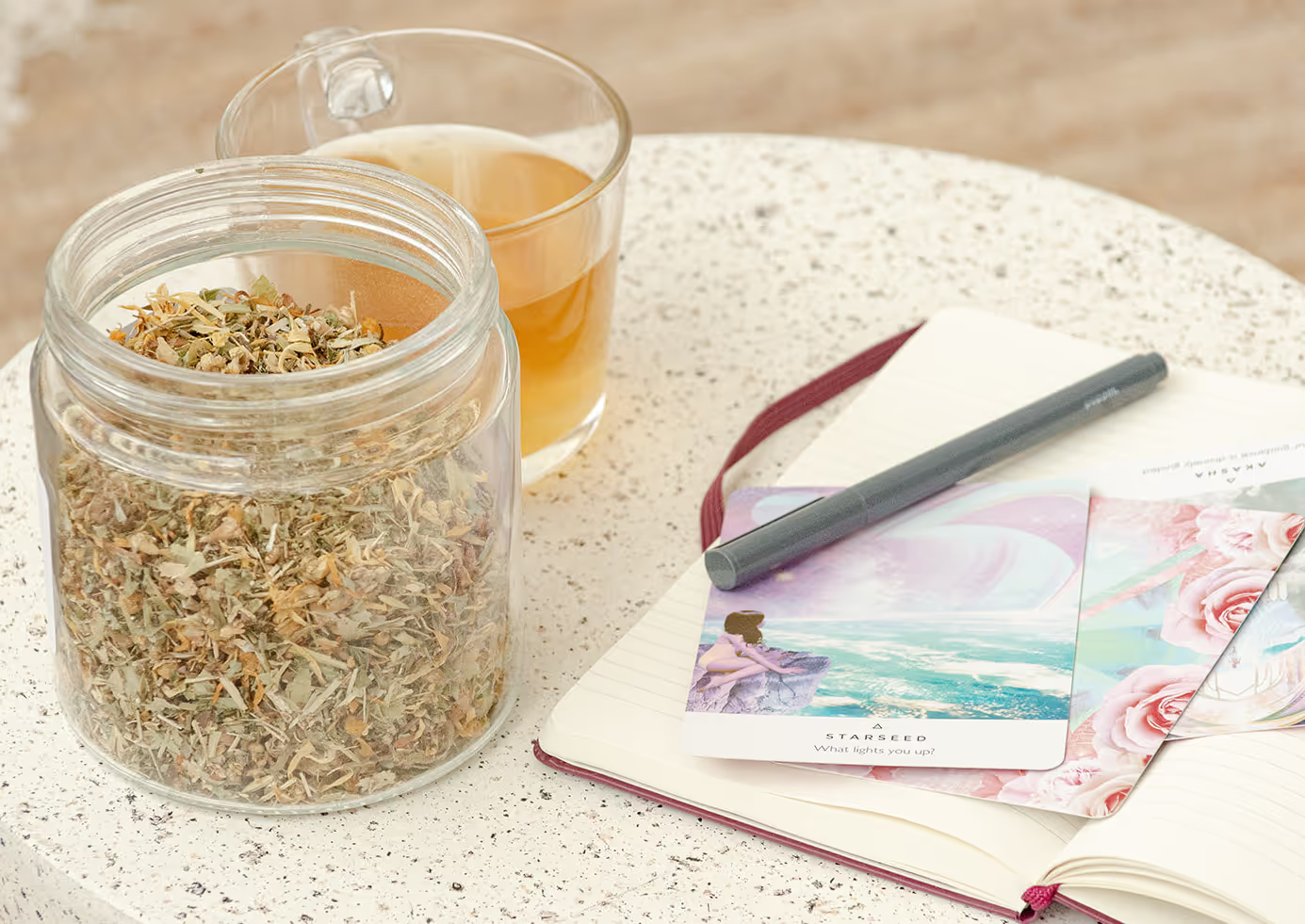
3 Liver Loving Herbs to Help Your Body Naturally Detox
Detox is a word that gets thrown around often in our culture. Unfortunately, our every day exposure to toxins and chemicals is enviable, even when trying our best to avoid them. While our bodies are inherently good at detoxing –especially through our liver, kidneys and skin, we often need to further support our body’s elimination pathways. The liver is key, as it filters the blood and helps to break down toxins. As a naturopathic doctor, when working with my patients, I often focus on diet and lifestyle modifications that we can make to help promote adequate daily detoxification, such as promoting regular bowel movements and getting our lymphatic system going. More often then not, we need some additional support in this area, and herbal medicine is a beautiful modality to assist in this.
Here are three of my favourite liver supporting herbs:

1. Milk Thistle (Silybum marianum)
Milk thistle is widely known as a heptoprotective, which means it helps protect and repair the liver. This can include helping our liver process daily stressors such as poor diet, environmental toxins and alcohol consumption. It can help support the gallbladder, and increase glutathione production – an important antioxidant for detoxification. Research has even shown milk thistle to improve serum liver enzymes and fasting blood glucose, insulin and HbA1c markers.
2. Dandelion (Taraxacum off.)
Yes,I am talking about the “weed” you find on your lawn every spring! Dandelion can be consumed in two parts – both the leaves and the roots. The leaves, or greens, are known to be a diuretic and help support the flushing of waste from the kidneys. The bitter taste helps stimulate digestion and detoxification. Meanwhile, the dandelion root is a known as a liver tonic and focuses on assisting phase two liver detoxification, improving healthy bile flow and promoting regular bowel movements. Due to it’s flavouring, it is also often used as a caffeine free coffee substitute!
3. Globe Artichoke (Cyanara scolymus)
Globe artichoke is not only known to help support the liver, but it also is a bitter, which aids in overall digestion, and helps support the gallbladder. Research has shown it to help lower serum cholesterol and improve liver enzymes – so it is a great option for those who are also concerned with their cholesterol levels.
I love creating custom blends for my patients to help support their body as a whole. Often we can choose other supporting detoxification herbs, such as Burdock (artcium lappa) when there are skin concerns, nettles (Urtica dioica) for kidney support and cleavers (Galium aparine) for lymphatic drainage.
To dive deeper into what it means to detox and cleanse, as well as diet and lifestyle changes you can start today watch my webinar in the Optimal You Membership Community!
Through my unique processes of a full assessment,intentional testing options and individualized and manageable treatment plans,I've helped hundreds of men and women take the next step and make small changesfor dramatic shifts in their health and wellness. If you would like to discusswhich tests might be right for you, book a FREE discovery call here.
Disclaimer: Any information is for informational purposes only and is not intended to beused in place of professional medical advice. Always seek the advice of aqualified health care practitioner with any questions or health concerns youmay have.
Resources:
https://stfrancisherbfarm.com/blog/milk-thistle-natures-detox-herb/
https://cytomatrix.ca/wp-content/uploads/products/CM-Info-Sheet-DT-Matrix.pdf

What is a Food Sensitivity?
First of all, food sensitivities are real and your symptoms are not in your head!
As a naturopathic doctor, I often see patients with digestive concerns. There are a variety of different ways our bodies can react to the food that we are eating. Whenever we are working together, my job is to help you identify any foods that may be contributing to your symptoms. Let’s break down the top three reactions:

1 - FOOD INTOLERANCE:
An intolerance involves difficulty digesting a food that leads to digestive symptoms such as gas and bloating. Can include enzyme deficiencies such as lactose or alpha galactosidase or a sensitivity to chemicals such as salicylate. This is common in people who have trouble breaking down milk, beans, broccoli or cabbage. This type of reaction involves the digestive system and not the immune system. With the right type of enzyme, we should be able to resolve these symptoms.
2 – FOOD ALLERGY:
This type of reaction is an immediate response (within minutes) to an ingested food. Symptoms of anaphylaxis include: itch, throat, tongue and lip swelling, watery eyes, difficulty breathing and tingling in the extremities. It is generally not dose dependent. An allergy involves the immune system (IgE & histamine response – type 1 hypersensitivity). This would be what an allergist tests with a skin prick test.
3 – FOOD SENSITIVITY:
A sensitivity is a delayed response which can sometimes take days to develop symptoms. The immune system recognizes a particular food as a foreign body. Symptoms may include but are not limited to: changes to bowel movements, bloating, fatigue, rashes and mood changes. Contributing factors include a disrupted immune system, abnormal gut flora, low stomach acid, and pancreatic enzyme deficiencies. This reaction also involves the immune system (IgG response –type 3 hypersensitivity). Sensitivities can be the most difficult to identify due to the delayed and dosed dependent nature.
Want to learn more? Join my monthly community membership - The Optimal You Community Membership - to access to monthly webinars, educations videos, ask me anything segments, interviews with industry favourites and more! Sign up for a free trial or the monthly pass here.
Through my unique processes of a full assessment, intentional testing options andindividualized and manageable treatment plans, I've helped hundreds of men andwomen take the next step and make small changes for dramatic shifts in theirhealth and wellness. If you would like to discuss which tests might be rightfor you, book a FREE discovery call here.
Disclaimer: Any information is for informational purposes only and is not intended to be used in place of professional medical advice. Always seek the advice of a qualified health care practitioner with any questions or health concerns you may have.
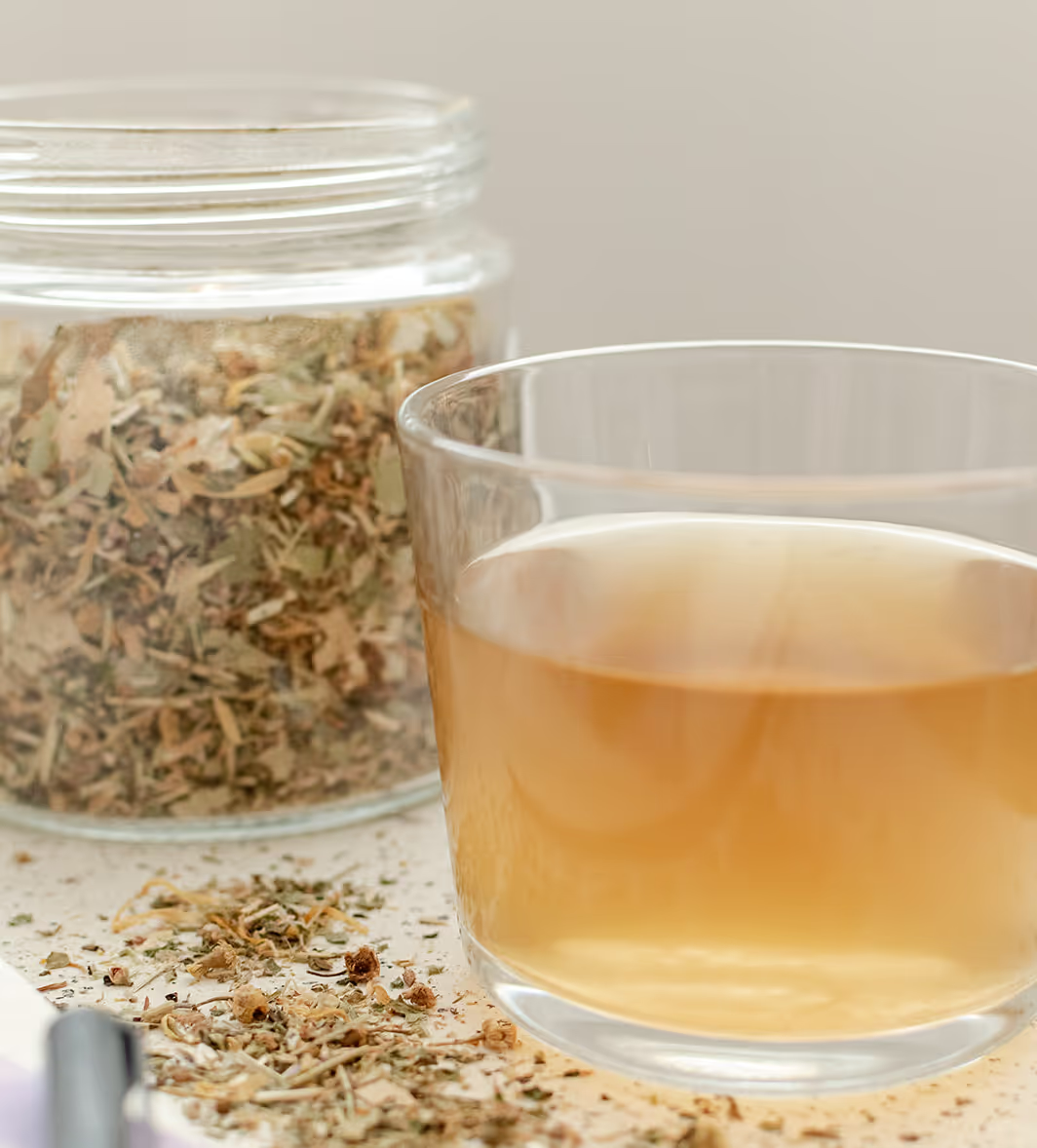
Do I Have Leaky Gut?
Do I Have a Leaky Gut?
The term Leaky Gut is becoming more and more common, especially with the growing number of people experiencing digestive concerns and talking about food sensitivities. Often in my patients, food sensitivities (not to be confused with food allergies or intolerances) and subsequent gastrointestinal symptoms is what brings them through my door. Leaky gut, also known as increased intestinal permeability, is associated with a large number of health concerns including seasonal allergies, autoimmune disorders such as rheumatoid arthritis, inflammatory bowel disease and celiac disease, autism and depression.

The cells in our small intestine are very close together (tight cell junctions) and have an epithelial lining that protects them from damage and controls what enters the blood stream. Gradually, irritants such as toxins, large food particles and bacteria/viruses/yeasts begin to compromise the cell barrier and cause inflammation. Once the gut becomes “leaky” from the inflammation, food particles, toxins and microbes can enter the blood stream. Over time, the body, including the immune system and liver, can become over burdened from dealing with the large amounts of particles slipping into the blood stream. Other factors that contribute to this inflammation include food sensitivities, environmental toxins, chronic stress, processed foods, low fibre/high fat diets, low stomach acid, alcohol, NSAIDs, and antibiotics. Leaky gut can lead to poor absorption of nutrients, and a lack of nutrients can weaken gut function.
When to consider investigating a leaky gut:
The symptom picture of leaky gut can be wide-ranging and often overlaps with other conditions such as IBS. Symptoms may include:
-Diarrhea
-Gas and bloating
-Poor digestion
-Abdominal discomfort
-Brain fog, anxiety and other mood concerns
So you think you may have leaky gut, now what?
In my practice, I sit down with patients and we discuss any factors, including diet and lifestyle, which may be contributing to leaky gut. Often I suggest either an elimination diet or food sensitivity testing (FST) to identify any foods which may be contributing to the gut lining inflammation and triggering an immune response in the body. Once identified foods are removed, it is important to support the gut to heal through supplementation such as L glutamine and probiotics, as well as foods such as bone broth. Supporting the liver and the immune system are also vital, as they are working extra hard to make the body run optimally.
Want to learn more? Join my monthly community membership - The Optimal You Community Membership - to access to monthly webinars, educations videos, ask me anything segments, interviews with industry favourites and more! Sign up for a free trial or the monthly pass here.
Through my unique processes of a full assessment, intentional testing options and individualized and manageable treatment plans, I've helped hundreds of men and women take the next step and make small changes for dramatic shifts in their health and wellness. If you would like to discuss which tests might be right for you, book a FREE discovery call here.
References:
Disclaimer: Any information is for informational purposes only and is not intended to be used in place of professional medical advice. Always seek the advice of a qualified health care practitioner with any questions or health concerns you may have.

Should I take a probiotic? And what is a prebiotic anyways?
The short answer is YES. But lets break that down a little bit.
The microbiome is the collection of microbes (including bacteria, viruses, fungi and parasites) that live on and in our bodies. I like to refer to them collectively as the good and bad bugs. More often we are referring to the gut microbiome, or the bugs that live in our digestive system from the mouth to the colon. There are three main categories of bugs: the good guys (generally bacteria), who we want lots of, the bad guys, who we want none of, and the ones that are okay in small amounts. When working with my patients, my treatments often focus on getting rid of the bad guys and helping the good guys grow and flourish.

Through research, we know each part of our digestive tract should have more of certain bacteria and less of others. Now no one really has a “perfect” microbiome – as it is influenced by many factors such as the food we eat, our genetics, whether we were born vaginally or by C-section, the chemicals we are exposed to, medications we take and the number of times we have taken antibiotics in our lifetime.
Probiotics are good bacteria, and occasionally yeast, that we can ingest to help promote a healthy microbiome balance. They help our good guys multiple and the bad guys diminish!
1) Probiotics in Foods:
Probiotics are naturally occurring in fermented foods. Eating these foods regularly can be a great way to improve gut health. These foods include:
- Sauerkraut
- Kimchi
- Miso
- Tempeh
- Kefir
- Yogurt
However, often we need a higher, more therapeutic dose of probiotics then what our food can give us.
2) Probiotics in Supplement Form:
I've found in my practice that most people need additional probiotics then food can supply. However, like most supplements, not all probiotics are made the same. Products vary by the number of strains, the dose/number of billion, and the added ingredients. Since everyone’s needs are different, I work with my patients to help find the best-suited balance of ingredients, dose and length of treatment that is individualized to them. We also want to consider switching up our probiotics after an extended period of time to give our gut some variety.
Another question I get often is what are prebiotics?
Prebiotics are the food for our good guys. They can be taken together or separately with probiotic foods/ supplements. Prebiotics are often found in foods that are high in fibre, and include ingredients such as inulin,FOS, beta glucan, and pectin.
As always, having a diet that consists of a variety of whole foods is a great way to support a healthy gut! If you are having trouble with your bowel movements, or your overall digestion feels off,I will be taking a deep dive into gut health during my webinar called: No MoreBathroom Embarrassment: Simple Strategies & Testing Options For A Smooth Move, inside the Optimal You Community Membership! Join now for access to this webinar and more :D
Through my unique processes of a full assessment, intentional testing options and individualized and manageable treatment plans, I've helped hundreds of men and women take the next step and make small changes for dramatic shifts in their health and wellness. If you would like to discuss which tests might be right for you, book a FREE discovery call here.
Disclaimer: Any information is for informational purposes only and is not intended to be used in place of professional medical advice. Always seek the advice of a qualified health care practitioner with any questions or health concerns you may have.

3 Nutrients to Test on Blood Work If You Are Feeling Down This Winter
3 Nutrients to Test on Blood Work If You Are Feeling Down This Winter
As Canadians we are no strangers to some of the struggles of winter. As the temperatures drop and the days gets longer, we often see a shift in both our mood and our activities. We spend more time cozied up in the house and are more likely to press that snooze button an extra time. As high as 35% of Canadians may experience the winter blues, and an additional 10% likely suffer from a mild form of seasonal depression. While we often jump to the lack of light and the longer days as the main factor for symptoms such as feeling more fatigue, the excessive need for sleep and trouble with concentration, other contributing factors should be investigated.
Asa naturopathic doctor in Ontario, an important part of my practice is runningblood work for my patients to help get to the root cause of their symptoms.

Here are three important tests to investigate if you are feeling low this winter:
1. Vitamin D
We have all heard of the importance of the sunshine vitamin! The main way we get vitamin D is through the sun hitting our skin.Unfortunately where we live in the world the sun is not strong enough to synthesize vitamin D for almost half the year. How I see this impact my patients is that they present with a Vitamin D deficiency, often even if they are supplementing. These low levels can impact both mood and energy (among many other things!). The great thing about vitamin D is that we can test the levels, and then provide specific recommendations for dosage to improve the numbers! I recommend patients test their vitamin D at least 2x a year, ideally in the fall and in the winter.
2. Ferritin & CBC
Low iron stores and anemia can have a big impact on how we feel. Menstruating women often present with low ferritin due to their monthly cycles. Optimal numbers for ferritin present on a range, so testing the numbers in blood work is an important step for optimizing how you are feeling.
3. Full Thyroid Panel
The thyroid is an important gland for producing hormones to regulate our metabolism. While our TSH numbers are often investigated, what is more important is running a full thyroid panel, including both hormones T3 and T4, to see how everything is interacting.Improving thyroid function through vitamin and mineral support, as well as medication if needed, can make a huge impact on mood and energy.
To dive deeper into other tests that may be helpful to fight your winter blues, as well as easy and manageable things you can start today to improve your mood, watch my webinar in the Optimal You Membership Community!
Through my unique processes of a full assessment, intentional testing options and individualized and manageable treatment plans, I've helped hundreds of men and women take the next step and make small changes for dramatic shifts in their health and wellness. If you would like to discuss which tests might be right for you, book a FREE discovery call here.
Resources:
- Levitt, A.J., Boyle,M.H., Joffe, R.T., & Baumal, Z. 2000. Estimated prevalence of the seasonal subtype of major depression in a Canadian community sample. Canadian Journal of Psychiatry, 45(7), 650-654.
- https://www.camh.ca/en/health-info/mental-illness-and-addiction-index/seasonal-affective-disorder
Disclaimer: Any information is forinformational purposes only and is not intended to be used in place of professional medical advice. Always seek the advice of a qualified health carepractitioner with any questions or health concerns you may have.

5 Tips to Prepare for Pregnancy
So you and your partner have decided it is time to start trying for a family - But now what? Besides the importance of timing sex, what else can mom-to-be do to benefit herrself and her unborn little babe?
First, it is best to give yourself 3 to 6 months before becoming pregnant to prepare your body. It is important to chat with your health care provider about diet and lifestyle, as well as any additional requirements your body may need. It is helpful to write down any questions you may have, regardless of how silly they may sound and bring the list with you to your next appointment.

Here are my top 5 tips to prepare for pregnancy.
1. Get on a good prenatal supplement
Not all prenatals are made equal! Dosage and ingredients can vary between brands. It is important to take folic acid before know you are pregnancy and throughout pregnancy. It is the most important vitamin to prevent congenital anomalies such as heart defects, urinary tract anomalies, oral facial clefts, neural tube defects and limb defects. Prenatal supplements also contain other ingredients such as zinc, magnesium, b vitamins and vitamin D. Some commonly recommended prenatal vitamins also contain unwanted ingredients such as talc, dyes, titanium dioxide and shellac – so it is best to read the label carefully!
FYI - Some prenatals can be constipating due to type of iron used. If you are having issues with this, talk to your naturopathic doctor about switching to a different brand.
2. Take some essential fatty acids (fish oils)
During pregnancy, maternal levels of essential fatty acids decrease as they are being used to help the baby grow and develop. Supplementation of a high quality fish oil may decrease the chance of premature delivery. On the other hand, remember to keep dietary fish consumption to a minimum due to mercury content and risk of parasites.
3. Decrease your stress level
I know, easier said than done… Cortisol is an important hormone in terms of regulating our stress response on a daily basis. Either too high or too low cortisol levels can be associated with infertility and early miscarriage. For easy at home ways to decrease stress, try as little as 10 minutes of daily meditation, weekly yoga or exercise and getting a good nights sleep. If you need more support, I often help my patients manage their stress through individualized herbs, acupuncture and supplements.
4. Limit caffeine and alcohol intake
Caffeine has a longer half-life for fetuses, which means it takes them longer to clear it from their system. While moderate caffeine consumption (<200 mg per day – 8oz cup of coffee on average contains 95mg of caffeine) does not appear to be a major contributing factor to miscarriage or preterm birth, higher consumptions can cause complications. Alcohol consumption during pregnancy also puts your baby at risk of developing fetal alcohol syndrome, which affects 1-2 in every 1000 live births. If you consume coffee or alcohol on a regular basis, taking this time to decrease consumption beforehand will allow you to have an easier time stopping when you become pregnant.
5. Stop cigarette and recreational drug use
Various toxins can cause harm to the developing fetus. Cigarette smoking and recreational drug use should be stopped before becoming pregnant. Tobacco use has been found to have many negative side effects including low birth weight, premature birth, still birth, pregnancy complications such as placenta previa, as well as difficulty conceiving. Prenatal exposure to cannabis has been shown to affect the baby’s cognitive development and lead to behaviour issues and attention deficits later in life. Heavier use has been shown to reduce fetal growth and lower birthweight.
To dive deeper on this topic, catch my webinar What to Expect When Coming Off Hormonal Birth Control, available for free in the Optimal You Membership Community!
Through my unique processes of a full assessment, intentional testing options and individualized and manageable treatment plans, I've helped hundreds of men and women take the next step and make small changes for dramatic shifts in their health and wellness. If you would like to discuss which tests might be right for you, book a FREE discovery call here.
Disclaimer: Any information is for informational purposes only and are not intended to be used in place of professional medical advice. Always seek the advice of a qualified health care practitioner with any questions or health concerns you may have.
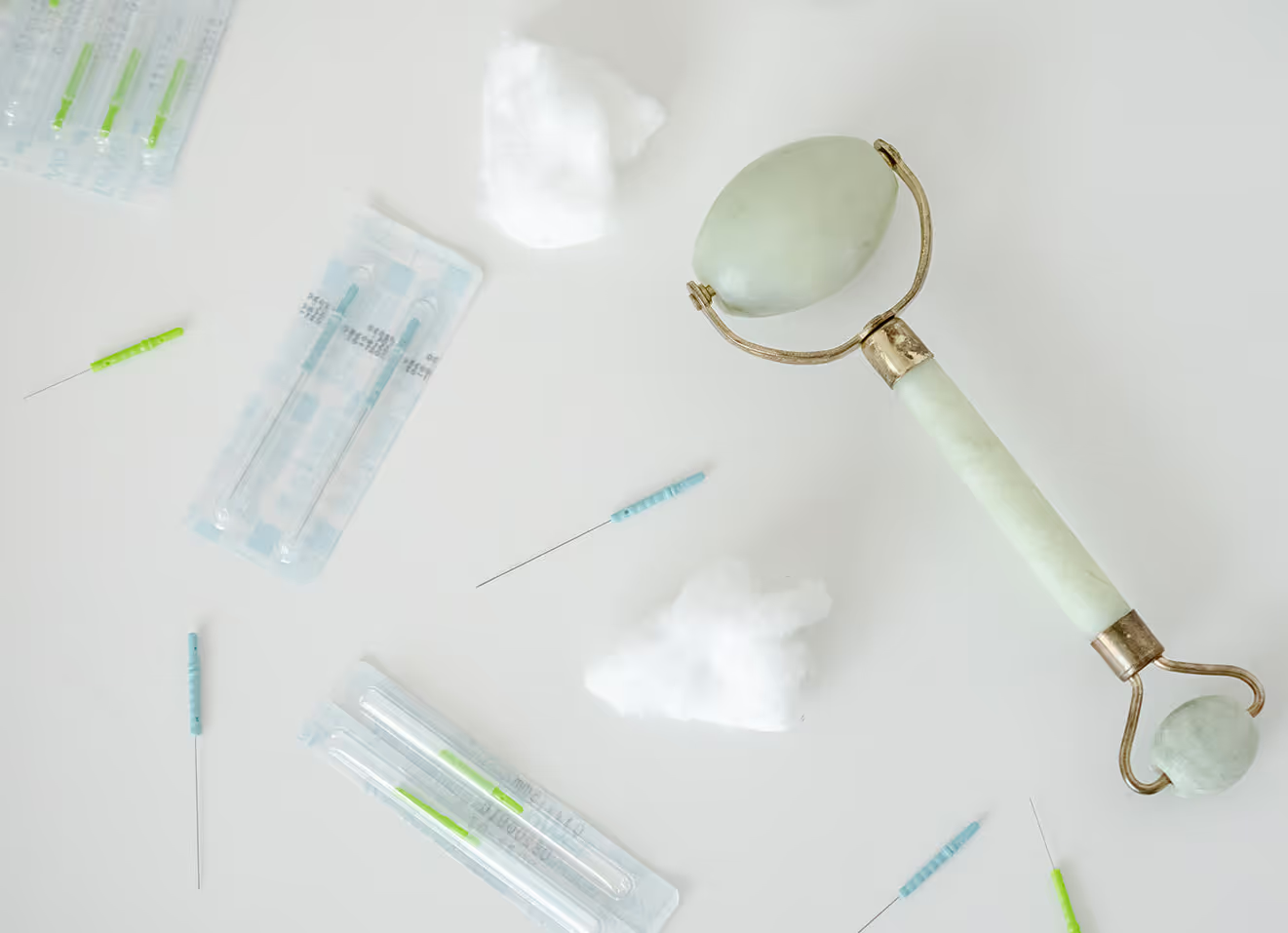
Acupuncture for Headaches and Neck Pain + 3 Simple Acupressure Points to Try at Home
Kink in your neck? Slept a little funny? Spending too much time on your computer and/or phone? I get it – we’ve all been there before. Neck pain is something I see often in my practice, but just because neck pain is common, doesn’t mean it is normal. There are many factors that lead to neck pain including posture, sleep position, muscle tension and arthritic changes. Neck pain in turn can lead to many bothersome symptoms such as frequent headaches, numbness and tingling in the arms and loss of range of motion. Over the years, both personally and professionally, I have found acupuncture to be very helpful in decreasing head and neck pain.

So what does acupuncture do exactly to help decrease headache & neck pain?
In the simplest terms, it can increase blood flow and decrease inflammation, help relax tight muscles and decrease pain & nerve pain signals. Acupuncture has been found to decrease intensity of neck pain and improve quality of life in individuals in as few as six treatments, however in practice I have seen some patients have temporarily relief after only one treatment! Another study found acupuncture to have a similar effect on pain and disability scores when compared to conventional medicine. Acupuncture also has been shown to have minimal side effects. Plus – it is very relaxing and stress relieving!
While each person I see in my practice gets a unique set of acupuncture points specific to them, here are some acupressure points that can help with headache and neck pain.
Large Intestine 4:
This point is found at the top of the triangle that is made between your thumb and index finger on each hand.
Gallbladder 20:
Find this point at the base of your skull approximately 1 finger width from the midline of your spine.
Yin Tang (3rd eye):
Have you heard of this acupressure point before? Rub the space in between your eye brows to help relief pain and stress alike.
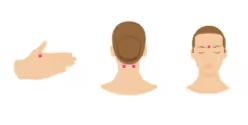
Want to learn more? Join my monthly community membership - The Optimal You CommunityMembership - to access to monthly webinars, educations videos, ask me anything segments, interviews with industry favourites and more! Sign up for a free trial or the monthly pass here.
Through my unique processes of a full assessment, intentional testing options and individualized and manageable treatment plans, I've helped hundreds of men and women take the next step and make small changes for dramatic shifts in their health and wellness. If you would like to discuss which tests might be right for you, book a FREE discovery call here.
References:
1. https://www.ncbi.nlm.nih.gov/pubmed/29121797
2. https://www.ncbi.nlm.nih.gov/pubmed/28715459
3. Images from:https://www.healthline.com/health/pressure-points-for-headaches#5
Disclaimer: Any information is for informational purposes only and is not intended to be used in place of professional medical advice. Always seek the advice of a qualified health care practitioner with any questions or health concerns you may have.

3 Herbs to Help You Manage Stress
If you haven’t noticed already, I’m a huge fan of plants. From watering my mini jungle to dosing tinctures to taming my garden, I interact with plants on a daily basis. In my naturopathic practice, I use herbal medicine with almost all my patients to assist with a variety of health concerns. When it comes to coping with stress, plants are definitely my go to.
Many herbs possess an action we call adaptogenic. In the simplest form, it means the plant helps us adapt to daily stress. Adaptogens support the body to resist damage from physical and mental stressors. They can increase our resistance to disease, balance our vital force and reduce the stress response in the body. Physiologically, they can assist in the body’s regulation of cortisol, our main stress hormone, either increasing or decreasing its production. They can even boost our immune system. Some herbs are more yang/stimulating in nature, such as panax ginseng, while others such as rehmannia are more yin/building. I find that most patients in my practice need some form of adaptogenic support –because lets be honest, life is more stressful then we would like!

Here are 3 of my favourite herbs to help manage stress:
Ashwagandha (Withania somnifera):
Originating in India and the Middle East, ashwagandha is a generally balancing herb that is especially indicated for long-term stress. It has been shown to improve fatigue and anxiety, as well as improve memory and stamina. It is anti-inflammatory and has been useful for conditions of the thyroid. Studies have shown ashwagandha to promote improved function of the central nervous system and balance neurotransmitters such as GABA and 5-HTP. Many sources describe ashwagandha as rejuvenating – and who wouldn’t want that!
Rhodiola (Rhodiola rosea):
Rhodiola has been described as one of the most important adaptogenic plants in modern alternative medicine. It has been used in folk medicine to increase physical endurance, longevity, productivity and fatigue. This herb can relieve symptoms of stress including mental fatigue and sensation of weakness. It has been shown to improve mental stamina, and increase work capacity. Research has found rhodiola to be specifically important as a mood stabilizer for activity of the neurotransmitters serotonin, dopamine and norepinephrine. It also plays a role on the central nervous system and balancing of adrenal hormones, such as cortisol, produced by acute stress.
Schisandra (Schisandra chinensis)
In Traditional Chinese Medicine, schisandra is both a yin and yang tonic, making it balancing in nature. Traditionally, it quiets the spirit and calms the heart. Historically, it has been used as a preserver of youth, as well as for improving memory and sharpening the mind. While helping the body manage stress, it also supports the immune system. Research has shown its benefit for people who were exhausted by mental work, and increased both endurance and mental performance in patients experiencing fatigue and weakness. Animal studies have shown a benefit to both cortisol levels and glucose regulation.
How to Consume Adaptogenic Herbs:
Adapotgenic herbs can be consumed in a variety of ways, including teas and powder/capsules.I often prepare patient custom formulas of adaptogens in the form of tinctures(liquid extracts) to have the most fitting blend to their symptoms and situation. As always, it is important to consult a health care practitioner before beginning any herbal product, including if you are on medication, are pregnant or are breastfeeding.
Want to learn more? Join my monthly community membership - The Optimal You CommunityMembership - to access to monthly webinars, educations videos, ask me anything segments, interviews with industry favourites and more! Sign up for a free trial or the monthly pass here.
Through my unique processes of a full assessment, intentional testing options and individualized and manageable treatment plans, I've helped hundreds of men and women take the next step and make small changes for dramatic shifts in their health and wellness. If you would like to discuss which tests might be right for you, book a FREE discovery call here.
Resources:
1. Ashwagandha Monograph by NFH. From www.nfh.ca
2.Ashwagandha: An overview of the research and clinical indications. From:https://www.gaiaherbs.com/uploads/A_Research_Review_of_Ashwagandha-1371567339.pdf
3.Rhodiola Rosea: An overview of its versatility, effectiveness and indications.From:https://www.gaiaherbs.com/uploads/A_Research_Review_of_Rhodiola_Rosea-1327938082.pdf
4.Schisandra: An overview of the research and clinical indications. From:https://www.gaiaherbs.com/uploads/A_Research_Review_of_Schisandra-1366989279.pdf
5.www.stfrancisherbfarm.com
6.Course notes BOT202 (From CCNM 2014)
Disclaimer: Any information is for informational purposes only and is not intended to be used in place of professional medicaladvice. Always seek the advice of a qualified health care practitioner with any questions or health concerns you may have.

Going Natural: Practical Tips for “Cleaning” Up Your Household & Skin Care Products
Believe it or not, your home is filled with harmful chemicals.
While some of the chemicals may be more obvious, such as cleaning agents, others such as shower liners may not be. These chemicals can have an array of negative effects on the body and this is often something I discuss with my patients during their visits. Phtalates found in plastics and fragrances can damage the female reproductive system and lead to decreased sperm count. PFCs from non-stick pans and dioxins found in bleached products can harm the immune system. BPA has been linked to an increased risk of breast cancer, obesity and heart disease. Studies have even found that fumes from cleaning products may cause asthma in otherwise healthy individuals. While it would be impossible to completely avoid these products in our day-to-day lives, our job as health conscious individuals is to educate ourselves and try our best to avoid them.
So what can we do about it? Well, lots actually! I have recently started to “Clean” my house including choosing cleaner household and skin care products.

Here are 3 ways to get started:
1. Read Labels!:
This is true for our food and for our cleaning and skin care products. Try your best to avoid any products that contain:
-BHA, BHT
-Coal tar dyes
-DEA related ingredients
-Dibutyl phthalate
-Formaldyhyde release preservatives
-Parabens
-Parfum, fragrance
-PEG compounds
-Petrolatum
-Siloxanes
-Sodium laureth sulfate
-Triclosan
-Talc
-Bleach
2. Replace Plastic in theKitchen:
This was my new years resolution, and let me tell you, it’s been the easiest switch I’ve made! It is easy to find replacements for most kitchen plastics. Health food stores often have a whole isle dedicated to this.
Try the following:
-Avoid Bisphenols (BPA) , PVC plastics and plastics marked with label #3 and #7
-Switch water bottles and food containers for glass alternatives
-Use bees wax wraps for food over plastic wrap
-Invest in reusable food bags rather then plastic sandwich bags
3. Download an App:
It’s hard to keep track of all the harmful chemicals we should watch out for. Luckily, there are a variety of apps that help you decode the label of your products and rank them from cleanest to dirtiest. When trying to decide between two products in the aisle of the grocery store, quickly type them into the app and see how they do.
The resources will often explain what each ingredient is and why you should avoid it:
-App: Think Dirty
-App: Clean beauty
It can be expensive (and take some time reading labels!) to buy a whole new house full of products. Don't stress - I suggest switching over as you runout or buying 1 new product a week. When I made the switch, it took my almost a year to replace everything. Wondering what my favourites are? Just ask!
Want to learn more? Join my monthly community membership - The Optimal You CommunityMembership - to access to monthly webinars, educations videos, ask me anything segments, interviews with industry favourites and more! Sign up for a free trial or the monthly pass here.
Through my unique processes of a full assessment, intentional testing options and individualized and manageable treatment plans, I've helped hundreds of men and women take the next step and make small changes for dramatic shifts in their health and wellness. If you would like to discuss which tests might be right for you, book a FREE discovery call here.
References:
https://davidsuzuki.org/queen-of-green/dirty-dozen-cosmetic-chemicals-avoid/
http://www.ewg.org/guides/cleaners/content/cleaners_and_health
-www.care2.com/greenliving/how-to-id-avoid-harmful-toxins-at-home-infographic.html
-Thompsonet al, Phytoestrogen content of foods consumed in Canada, including isoflavones,lignans and coumestan. Retrieved from: https://www.ncbi.nlm.nih.gov/pubmed/16898863
Disclaimer: Any information is for informational purposes only and is not intended to be used in place of professional medical advice. Always seek the advice of a qualified health care practitioner with any questions or health concerns you may have.
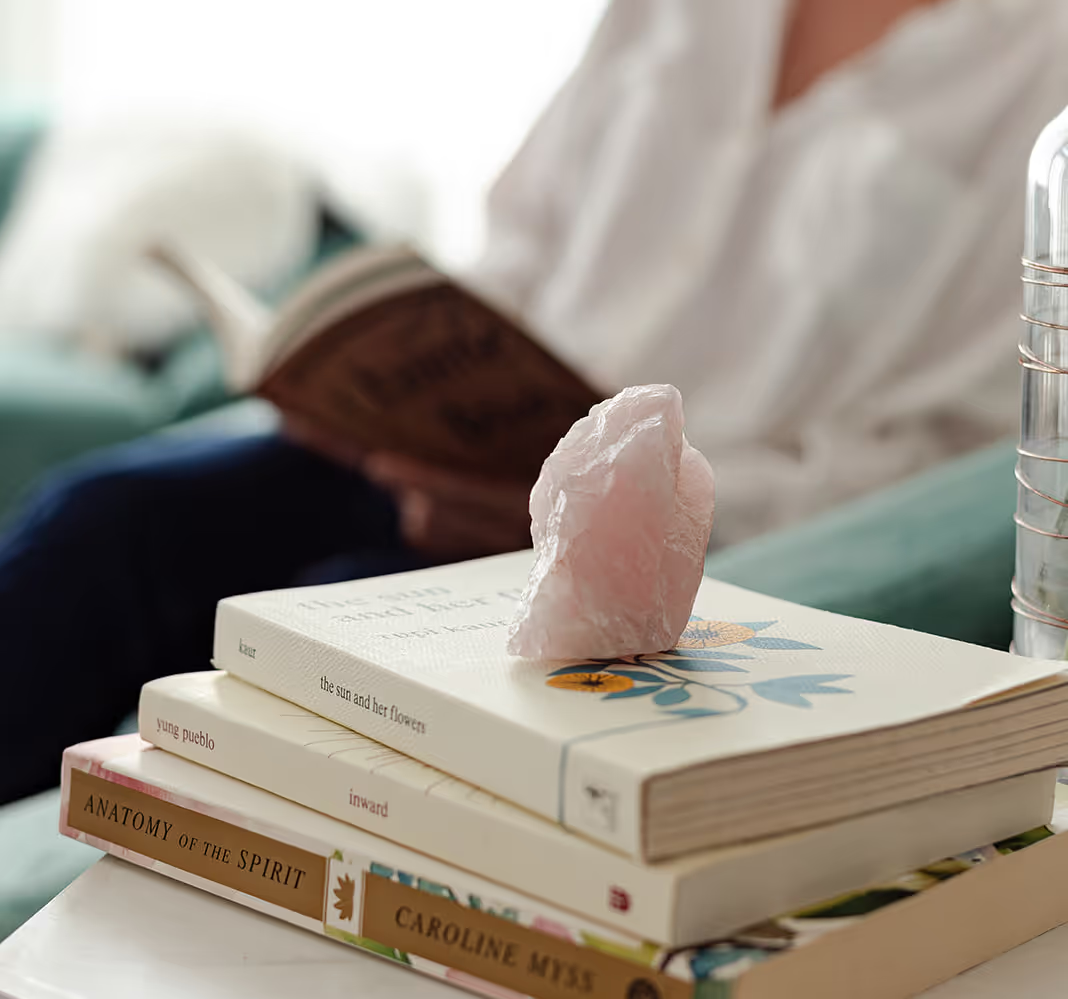
4 Ways to Use Lavender
What is the first thing that comes to mind when you think of Lavender? I picture the peaceful fields of purple flowers and instantly find myself at peace. Lavender, or Lavendula angustifolia, is one of the most common anxiolytic herbs. While it is gentle, it also has the ability to strengthen our nervous system and help with exhaustion. Native to the Mediterranean region, the Arabian Peninsula, Russia, and Africa, it has been used throughout history medically, cosmetically, in the kitchen and in the home.

Here are a few ways you can add lavender to your life and experience all the calming benefits this beautiful plant!
1. Diffuse the oil:
Lavender essential oil is the perfect oil to diffuse into a room. Add a few drops to your diffuser, humidifier, or simply a bowl of hot water – sit back and relax as the soothing smell fills the room and help you unwind. This is perfect when done 20 minutes before bed or after returning home from a busy day.
2. Destress with “perfume”:
If you start to feel yourself become anxious during the day, add a few drops of essential oil to your wrists. Breathing in the fragrant smell will instantly put you at ease. Bonus- it smells lovely too!
3. Sip on some tea:
Place 1 teaspoon of dried lavender in one cup ofboiling water. Steep for 10 minutes and then enjoy! Lavender does have a strongtaste however, so another option would be to mix it with your favourite herbaltea to enhance the flavour.
4. Place on your pillow:
Place a few drops of the essential oil on your palms and smooth on your pillow prior to bed. The relaxing smell will help you calm down, fall asleep easier and have a better sleep overall.
Want to learn more? Join my monthly community membership - The Optimal You CommunityMembership - to access to monthly webinars, educations videos, ask me anything segments, interviews with industry favourites and more! Sign up for a free trial or the monthly pass here.
Through my unique processes of a full assessment, intentional testing options and individualized and manageable treatment plans, I've helped hundreds of men and women take the next step and make small changes for dramatic shifts in their health and wellness. If you would like to discuss which tests might be right for you, book a FREE discovery call here.
References:
-Lavender. Natural medicines. Retrieved from: https://naturalmedicines-therapeuticresearch-com.ccnm.idm.oclc.org/databases/food,-herbs-supplements/professional.aspx?productid=838

4 Options for Your Child’s Eczema to Try at Home:
Eczema is one of the top conditions I see in the pediatric population of my naturopathic practice. It can be challenging and frustrating for both parents and kid, especially since topical steroids are not always the top option parents want to use. Even though a child hasn’t necessarily been around for a long time, there can be numerous factors contributing to their rashes.
Anywhere from 10-30% of children in developed countries will develop eczema, with 45% of them presenting with a skin rash before the age of 6 months. It often is heredity, so if one of your parents had eczema, there is a 30% chance you will too. Eczema, or atopic dermatitis, often arises in early childhood and occurs due to a dysregulation of the immune system, impaired skin barrier and allergic inflammation. Often in childhood the leading contributors to eczema are foods, sweat, physical irritation, environment and exposure to microbes.

The importance of the gut:
It is well known that the gastrointestinal tract has the largest quantity and variety of microbes in the human body. The composition of the gut microbiota has been found to vary in children based on circumstances prior, during and after birth. In terms of the development and maturation of the immune system, the gut microbiota plays an essential role even prior to birth. Less diversity in gut microbiota has been found to be associated with atopic eczema.
4 Options for Your Child’s Eczema to Try at Home:
1. Looking at the diet:
Often skin rashes can be due to a food trigger. A modified elimination diet is great place to start. The largest aggravator tends to be dairy (think beyond cows milk – yogurt, cheese, baked goods), so this is usually the first food that should be evaluated. Other common foods include gluten, egg and soy. If your child is being formula fed, consider switching formulas. If your child is being exclusively breastfed, consider foods mom is consuming.
2. Increase the good bacteria with a probiotic:
As mentioned earlier, the gut plays a pivotal role in our immune system and often we need a little boost of the good guys. This is especially true if your child was delivered via c-section or has had to take antibiotics. There are probiotics available for various ages, including infants and children.
3. Soothe the skin with Oatmeal baths
Oatmeal can provide relief for irritated skin. Either finely grind 1/3 cup of oatmeal and place in the bath or place oatmeal in a sock or pantyhose to create a sponge that can be used on the skin. Soak for 15-20 minutes and gently rub on the skin. Be cautious if your child is sensitive to gluten or oats.
4. Lock in moisture with coconut oil
Studies have found coconut oil to be more effective at soothing the skin than mineral oil. It also has antimicrobial properties that will help prevent any infections from scratches.It is best to moisturize your child within 3 minutes of getting out of the bath. This helps lock in moisture and not further dry the skin out.
Want to learn more? Join my monthly community membership - The Optimal You CommunityMembership - to access to monthly webinars, educations videos, ask me anything segments, interviews with industry favourites and more! Sign up for a free trial or the monthly pass here.
Through my unique processes of a full assessment, intentional testing options and individualized and manageable treatment plans, I've helped hundreds of men and women take the next step and make small changes for dramatic shifts in their health and wellness. If you would like to discuss which tests might be right for you, book a FREE discovery call here.
References:
OszukowskaM et al.: Role of primary and secondary prevention in atopic dermatitis. PostepDerm Alergol 2015, 6:409-420.
Lyons JJ, Milner JD, Stone KD: Atopic dermatitis in children: Clinicalfeatures, pathophysiology and treatment. Immunool Allergy Clin N AM 2015, 35:161-183.
Katayama I et al.: Japanese guidelines for atopic dermatitis 2017.Allergology International 2016, 1-18.
Munyaka PM, Khafipour E, Ghia JE: External influence of earlychildhood establishment of microbiota and subsequent health implications.Frontiers in Pediatrics 2014, 2: 109.